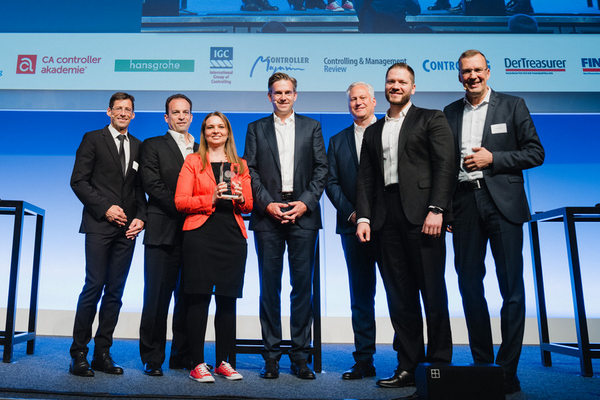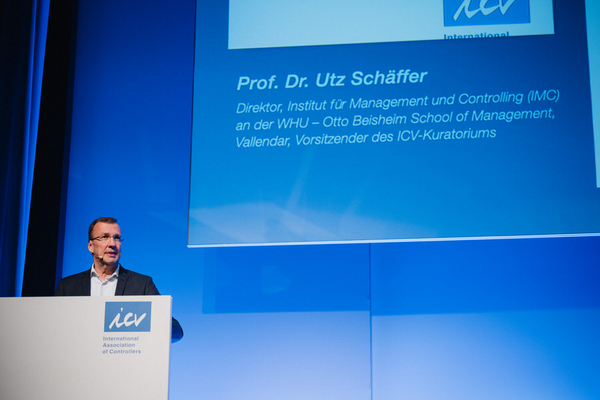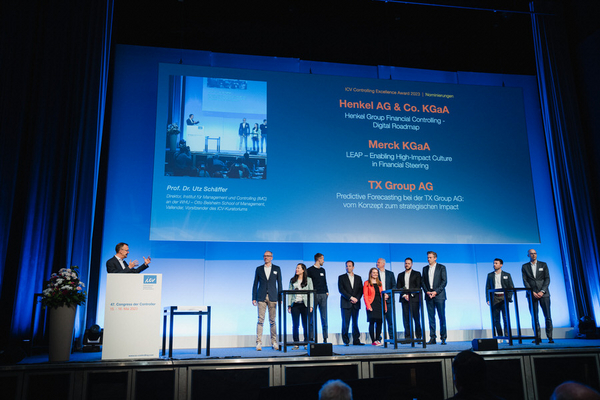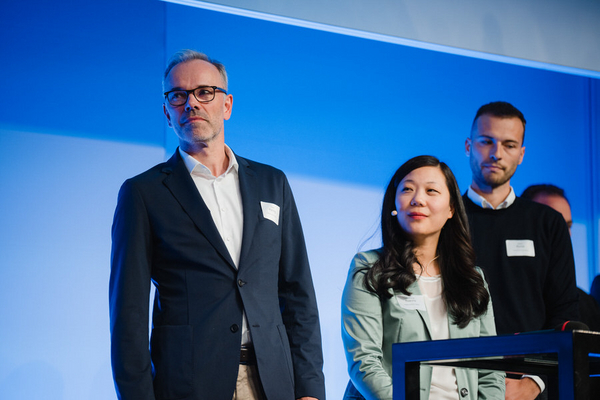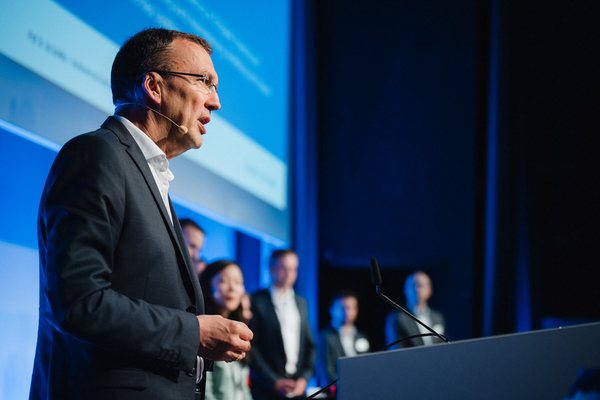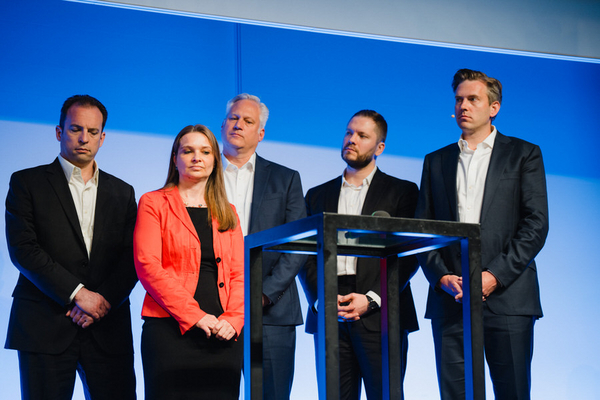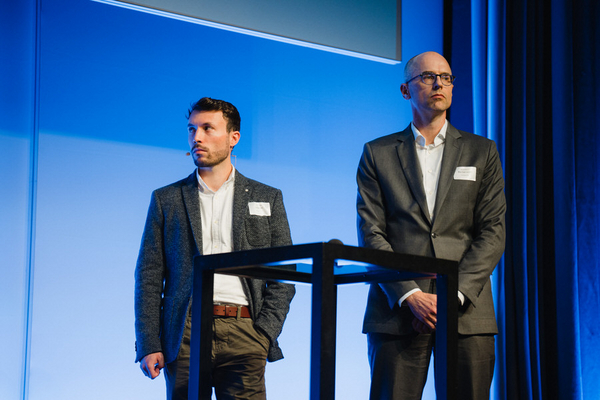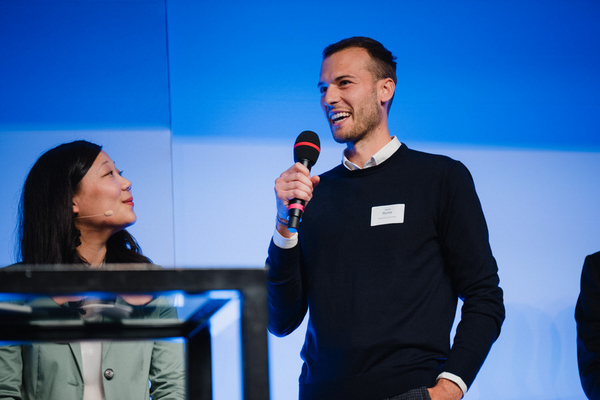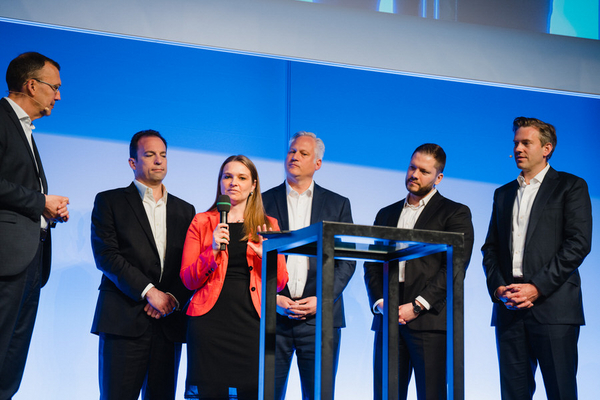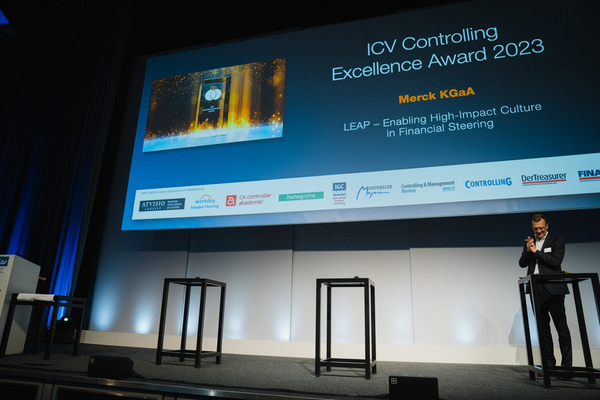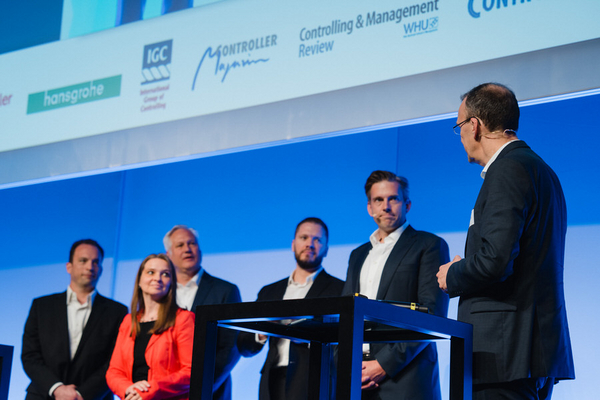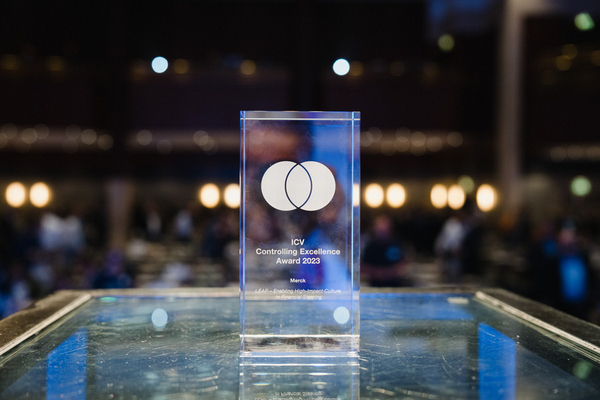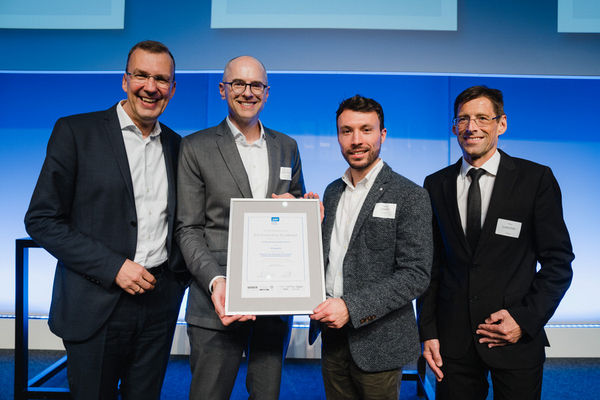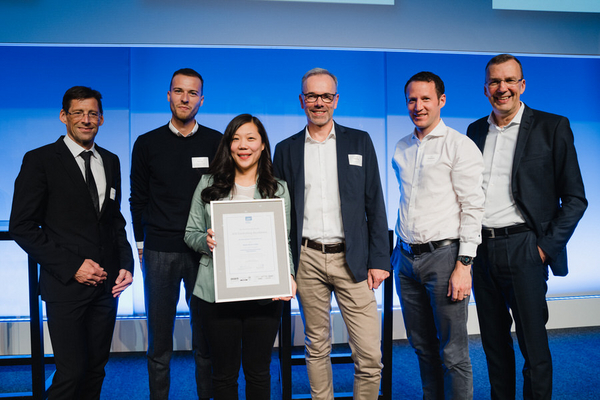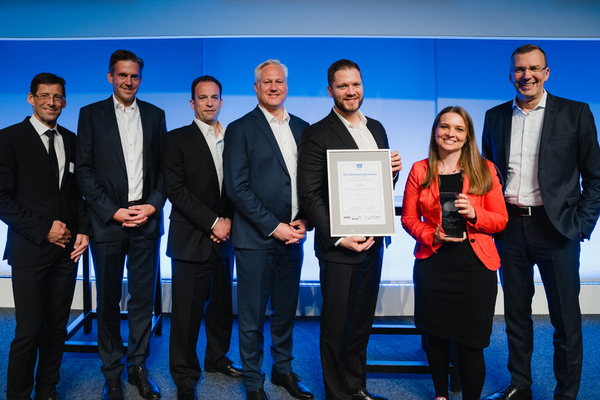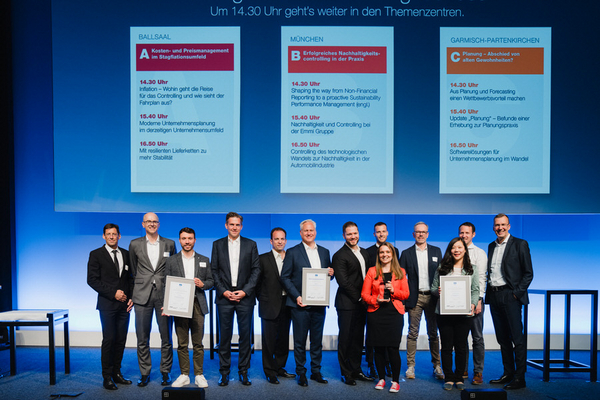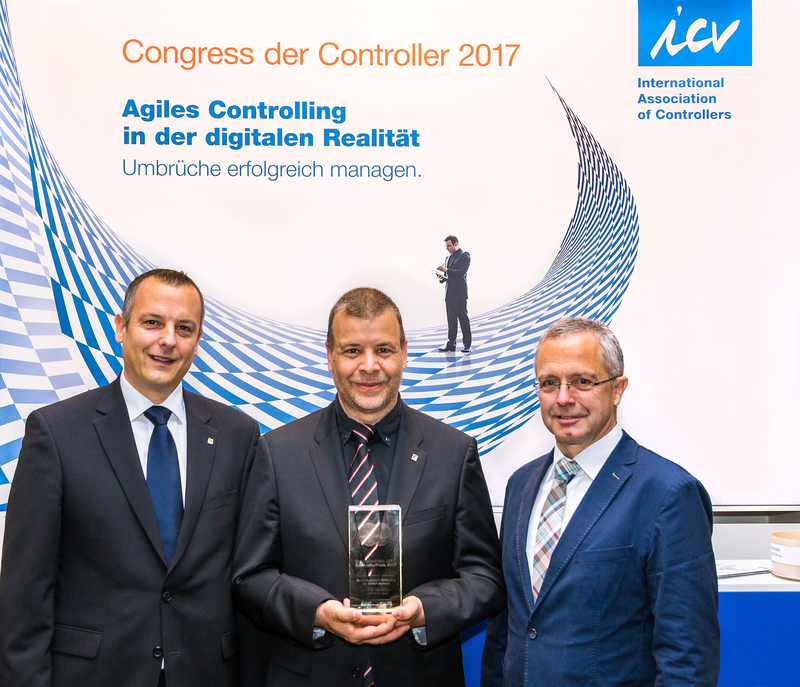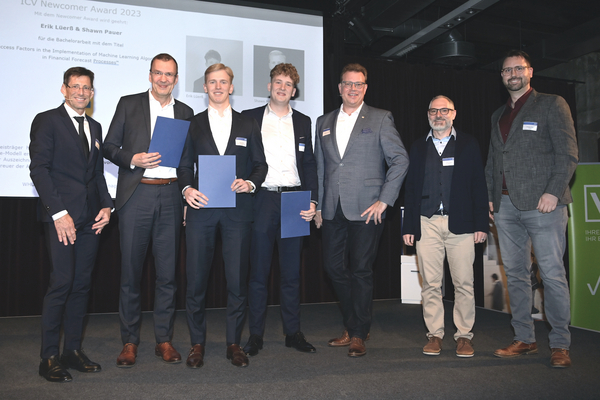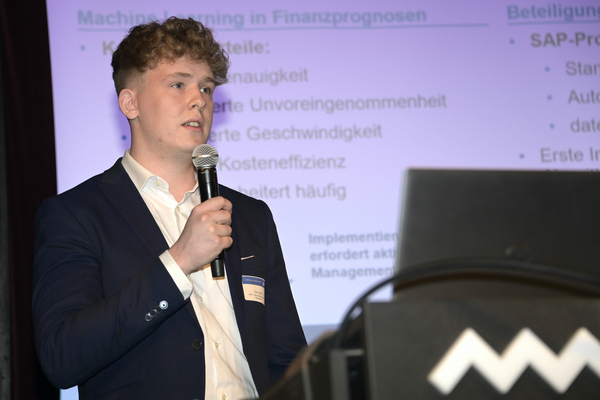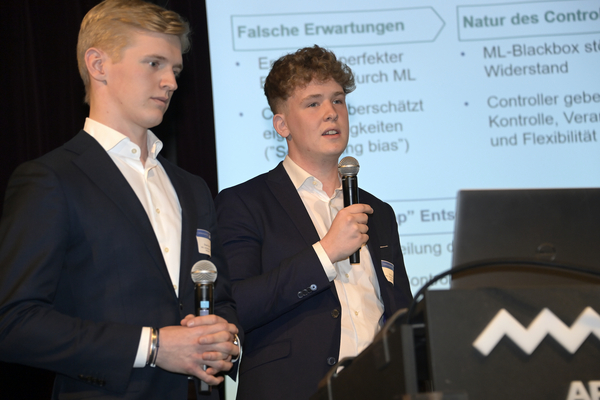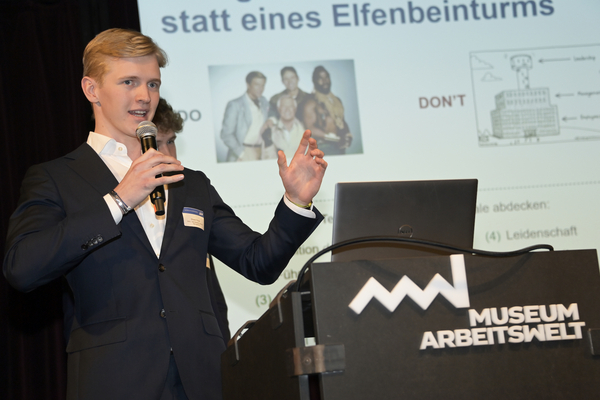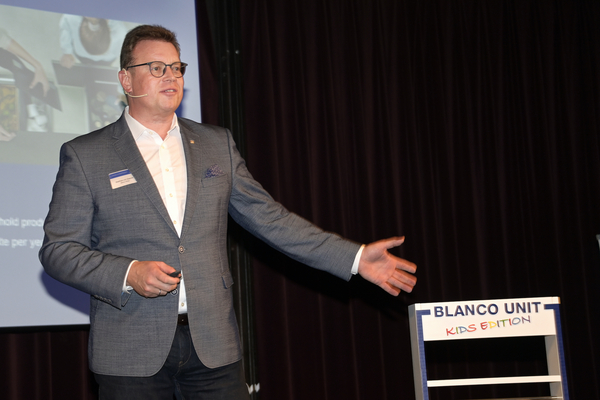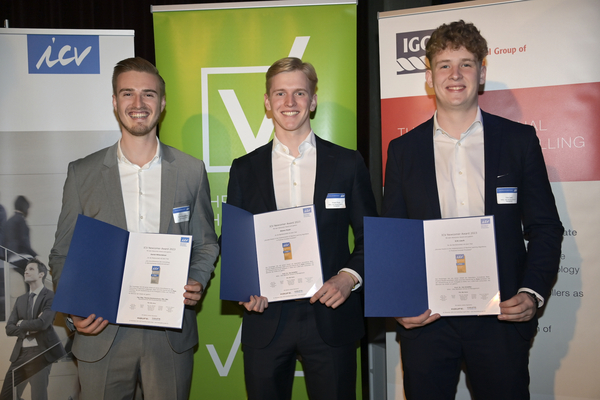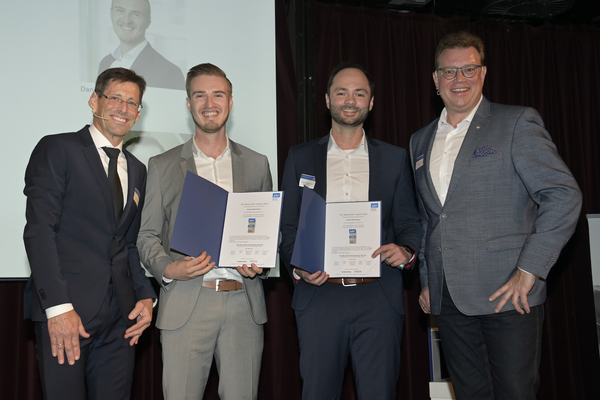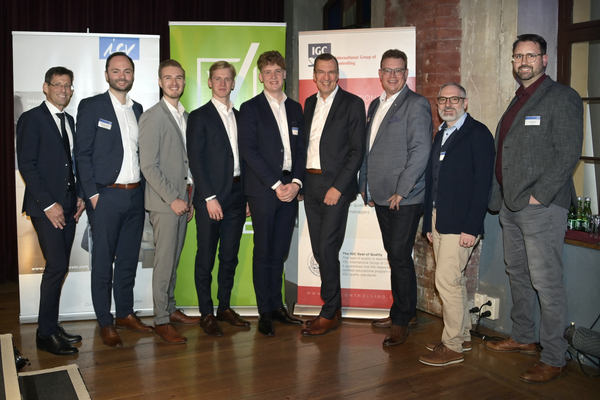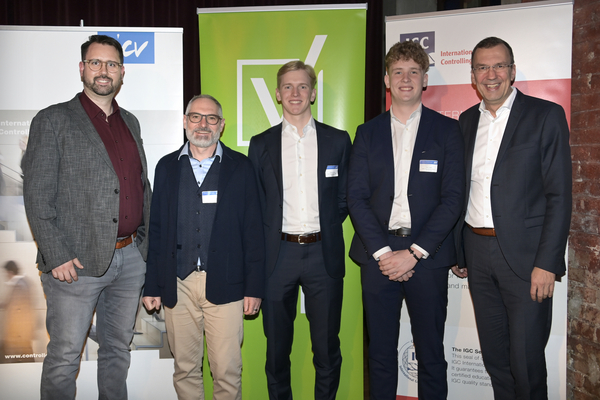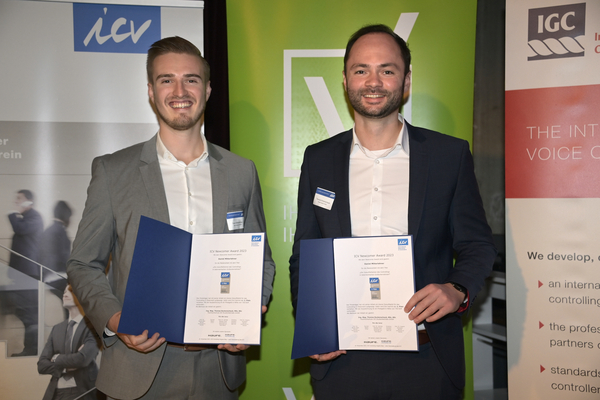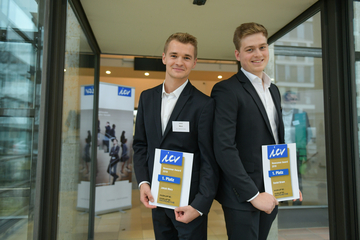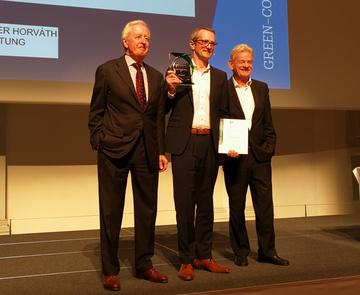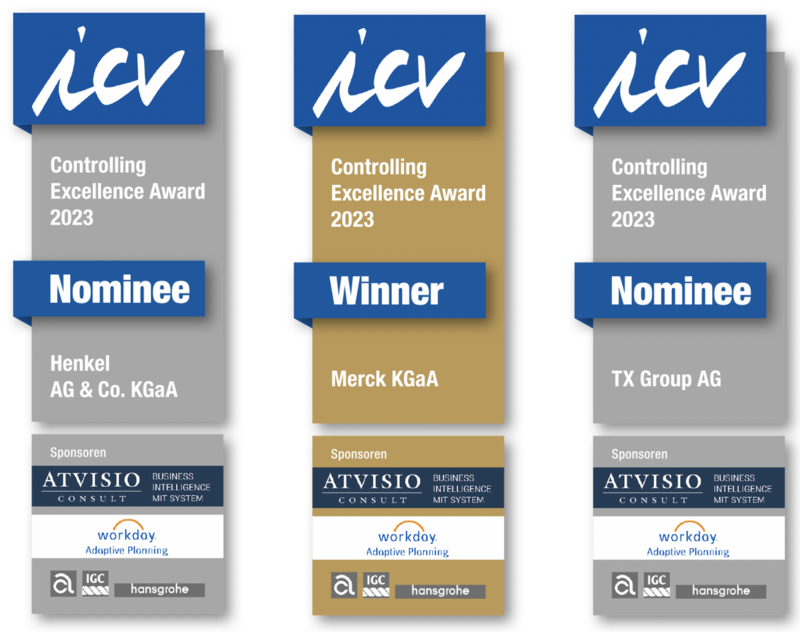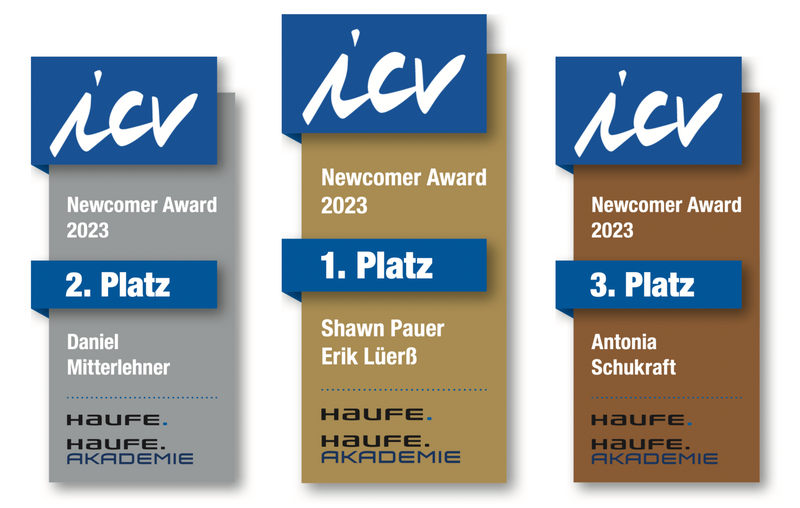Winners of the ICV Controlling Excellence Award, ICV Newcomer Award and Green Controlling Award
The ICV Controlling Excellence Award 2023
Merck KGaA wins the ICV Controlling Excellence Award 2023 for its project "Enabling High-Impact Culture in Financial Steering".
ICV Controlling Excellence Award
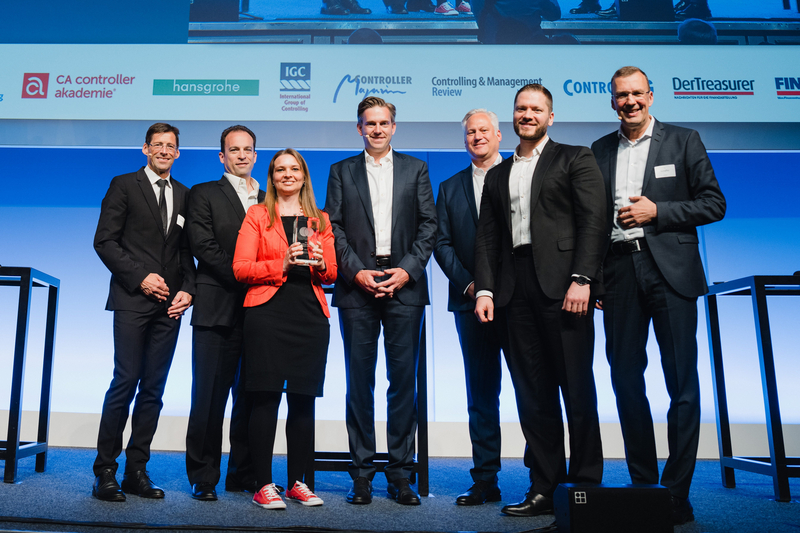
Munich, May 15, 2023. "Enabling High-Impact Culture in Financial Steering". It’s the title of the project by Merck KGaA, which won the renowned ICV Controlling Excellence Award for it. The controlling team has internalized the declared company-wide maxim of promoting the entrepreneurial thinking of every employee and developed the finance department into a trustworthy strategic advisor.
Behind the new high-impact culture at Merck there is a general effort to develop an environment in which every employee can contribute to the shared success. A clear focus, reduced complexity and continuously improved products are the basis. The focus is on tasks and measures that have the greatest impact. The controlling team has also adopted this approach, which was announced company-wide at the end of 2021, with its project "Enabling High-Impact Culture in Financial Steering". In order to modernize the financial processes and instruments, essential elements of bottom-up budget planning were eliminated. Action decisions are instead made based on continuous forecasts and business priorities. Resource allocation remains flexible because it is independent of fixed budget schedules.
However, the behavior and working methods of the employees are essential for successful implementation. “We must be willing to challenge our status quo, learn new skills and think entrepreneurially. In order for us to be successful, we not only need the right processes and instruments such as technologies or incentives - we also have to promote the right mindset in our employees," summarizes Kathrin Montry, Senior Principal Controlling Expert and Product Owner of the LEAP project. The Head of Group Controlling & Risk Management Alexander Lind specifies the implementation for his area. On the basis of the Beyond Budgeting model, goal setting and forecasting are "unbundled", resource allocation, performance management and behavior and working methods are changed. “We trust the talent and passion of our curious minds. That's why we create an environment in which they can develop their potential and achieve great things," says Lind.
This "radical way" in dealing with the experience that traditional planning processes are reaching their limits also convinced the Jury headed by Prof. Dr. Utz Schäffer, as well as the fact that the winning project is not an isolated solution for controlling, but is embedded in a larger cultural transformation process. “One or the other may also think back 15 or 20 years at this point, when the Beyond Budgeting concept came to the German-speaking area and was also met with great rejection from us in the ICV. “Beyond Budgeting – no thanks!” was the battle cry back then. That was a long time ago and today, with Merck, there is a company on the stage that has dared to undertake a fundamental change in corporate management in an environment that has changed significantly since then," summarizes Schäffer, Director of the Institute for Management and Controlling (IMC ) of the WHU - Otto Beisheim School of Management the award-worthy achievement at the laudatory speech on Monday in Munich.
Henkel AG & Co. KGaA: "Thinking in experiments instead of budgets" with the digital roadmap for Group Financial Controlling
With the nomination of Henkel's solution, the Jury took a previously unusual path, because it is not a specific project, but a digital roadmap. This is used to prioritize and implement the various initiatives in Group Financial Controlling.
In doing so, you are always aware of the fact that the decisions for or against initiatives and the assessment of their prospects of success must also be made in the face of scarce resources, crises and a volatile environment. Henkel's Group Financial Controlling has developed an innovative and pragmatic approach here, praises Utz Schäffer, because the roadmap combines several agile and iterative initiatives that are scaled if successful. The Jury was impressed by this "thinking in experiments instead of budgets". It is important that the initiatives, in addition to increasing efficiency through automation, also aim to create greater value through better analyzes ("From Data to Insights") and comprehensive upskilling of the central team.
This means that Henkel has something that every medium-sized and larger company absolutely needs, especially in times of scarce resources: a systematic, but at the same time flexible and pragmatic approach to prioritize and implement the various initiatives, says Utz Schäffer about the transferability of the nominated solution . You can also read the interview in the Awards section of the ICV website icv-controlling.com with Yu-Kyung Rasche, Head of Data & Analytics, Global Business Controlling/AFB at Henkel.
"Predictive Forecasting - from the concept to the strategic impact": TX Group has done what is still an unsolved challenge for many others
As in Merck's winning project, the starting point is the insight that the forecasting process reaches its limits in a dynamic environment and ties up enormous resources. TX Group has a solution. At its core, it consists of the introduction of predictive analytics to support the creation of forecasts. However, the nomination did not recognize the technical solution or the good algorithm, emphasized Utz Schäffer in his laudatory speech. Rather, the fast, inexpensive implementation without external support in a medium-sized company was convincing. Especially since the controlling team of the TX Group did not end with the improved generation of the forecast, but also uses the change to further develop the corresponding management processes and to strengthen business partnering, and "does exactly what is needed for many of you is just around the corner as a challenge,” says Schäffer, explaining the importance of the project as a blueprint for other companies.
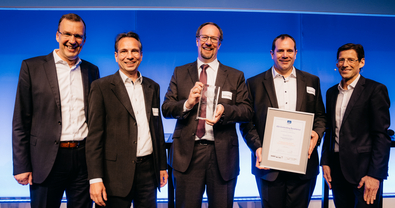
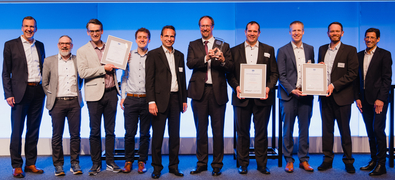
Munich, 9.5.2022. The ICV Controlling Excellence Award 2022 goes to the Deutsche Post DHL Group, which has prevailed in the final sprint for the renowned ICV Award against SAP SE and Phoenix Contact GmbH & Co. KG. "The winning project deals in a very convincing way with the integration of ESG dimensions in controlling and corporate management," was how the Jury justified its final decision.
The title of the winning project is “Integration of Sustainability Goals in Controlling at Deutsche Post DHL Group”. The initial impetus for this came in March 2021 when the new ESG Roadmap was communicated within the Group. The finance department of Deutsche Post DHL Group then assumed responsibility for both internal and external ESG reporting. Employees from the previous carbon accounting team in the finance department, from sustainability communication and corporate strategy were bundled into a new department, which has since been responsible for reporting processes and controlling for all three ESG dimensions. The project team started by translating the Group's ESG goals into operational and financial targets and identifying meaningful and reliable key figures for reporting and management of the ESG Roadmap. At the same time, a comprehensive internal reporting system for ESG indicators and ESG measures was set up. It is now regularly found in business reviews and performance meetings. The quality is secured by anchoring it in the internal management system. Finally, the process for investment decisions was expanded to include demanding ESG criteria. "As a result, the Deutsche Post DHL Group now has something that is still a dream of the future for most companies: a largely complete controlling system for managing ESG measures that is embedded in the financial organization," sums up the Head of the Jury, Prof. Dr. Utz Schäffer, Director of the Institute for Management and Controlling (IMC) at WHU - Otto Beisheim School of Management, at the laudation on Monday in Munich.
Phoenix Contact GmbH & Co. KG approaches the real, existing day-to-day life of controllers with rolled-up sleeves, their own on-board resources and learning by doing
The solution from the medium-sized Phoenix Contact GmbH & Co. KG, which was also nominated, aims at a uniform product cost determination process with simulations and scenario calculations. "The real, existing day-to-day controller work was the starting point here," Utz Schäffer summarizes the topic and puts it more concretely: The product cost determination and the associated reporting was very complex due to country, group and sometimes even individual-specific solutions. To solve this problem, the Phoenix Contact team first looked for a solution that was already available on the market. "And now it's getting exciting," says Schäffer enthusiastically, because: "It will be discarded in the end. Instead, the team itself is developing database-driven simulation software that can be used to carry out standardized manufacturing cost simulations and cost-effectiveness assessments for products and changes in production processes." According to Schäffer, the result not only impresses with its content, but also with a high level of acceptance, simplified use and greater use of simulations with significantly reduced effort at the same time. "The remarkable thing about this solution for the Jury is less the technological or conceptual new territory, but the exemplary approach with rolled-up sleeves, own on-board resources and intensive learning by doing!"
SAP SE turns the buzzword agility into a journey towards standardization with good suggestions for controlling in other companies
The aim of the project "Agile Controlling: New Delivery Model for Controlling", which was also nominated, was to make controlling at SAP more agile and flexible while at the same time efficiently meeting internal customer needs. "Let's be honest: agility is also a much-used buzzword in the context of controlling, which repeatedly raises eyebrows and raises a great deal of distrust," says Utz Schäffer, but: "That's exactly why we at the Jury consider the solution proposed by the SAP team very convincing!“. After all, the project shows a journey of no less than almost four years in the controlling area with a large number of building blocks through to the standardization of needs and the provision of services based on this for various internal customer groups in controlling. "As the Jury, we believe that the overall package of the SAP solution contains many good suggestions for controlling in other companies".
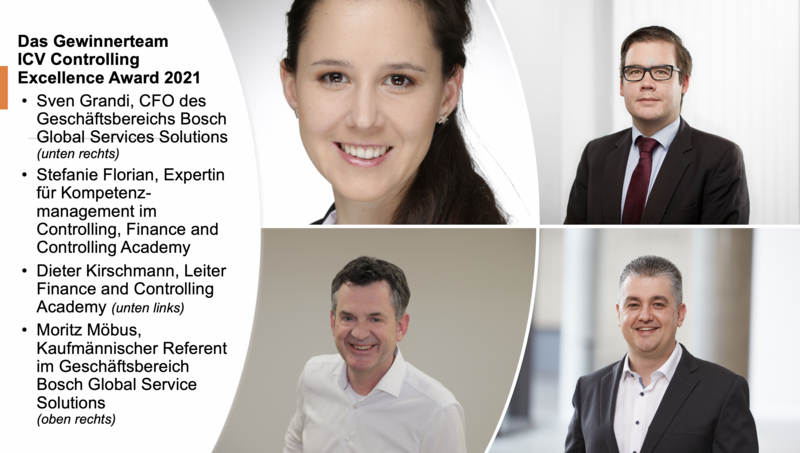
The 2021 ICV Controlling Excellence Award goes to Robert Bosch GmbH for the concept "Controller of the Future - People make the Difference!". The technology and service company impressed with the development of new controller roles to support its own transformation. The ICV also recognizes a project by A1 Telekom Austria, "Finance Analytics @ A1 Austria", a process for the introduction of advanced analytics, as well as the project “Introduction of a Product Lifecycle Controlling in the KUKA Robotics Segment" by KUKA Deutschland GmbH. The Award was presented on April 26, 2021 at the Europe's leading controlling conference, the 45th Congress of Controllers, which took place online for the first time.
The expert Jury for the ICV Controlling Excellence Award, made up of both practitioners and professors, is headed by the Chairman of the ICV Board of Trustees, Prof. Dr. Utz Schäffer, from the WHU Otto Beisheim School of Management, Institute for Management and Controlling, Vallendar. "Despite the tense corona situation, we were pleased to receive many high-quality applications again," said the Chairman of the Jury.
First prize goes to Bosch for a "very convincing solution for deriving and introducing new controller roles". The Jury did not want to differentiate between second and third place in the solutions from KUKA with its product lifecycle controlling and from A1 Telekom Austria with a process for the introduction of advanced analytics. The solution from KUKA is recognized as an industry-specific, rather traditional, but all the more as a very convincing “passion” project. With the award for the A1 Telekom solution from Austria, the Jury is sending out a signal of how important it is for the ICV to open up to analytics.
ICV Controlling Excellence Award 2021 for Bosch
The starting point for the winning project of the technology and service company Bosch was the fact that the company also develops its controlling with advancing digitization. The controllers support the operational business units with new management concepts, methods, systems and tools in the process of becoming the leading provider in the Internet of Things and for mobility solutions. Since the digital transformation also leads to new business models for Bosch, it is an urgent task for the controllers to support them in their development and expansion with appropriate and adapted as well as new management instruments.
This also includes effectively managing and mapping the increasingly cross-unit business. At the same time, controllers increase their efficiency in their own functional area through process automation with Robotic Process Automation (RPA), the creation of machine forecasts with predictive analytics, e.g. for sales, and through the use of highly integrated reporting systems with customer-oriented dashboards.
As part of the concept, Bosch developed five new roles for the company's 4,000 controllers and has implemented them since the beginning of 2021. In addition to the well-known “business partner” profile, there is also the business analyst, subject matter expert, governor and data scientist. For each of these roles, a specific competence profile and a matching training curriculum was created.
Particularly noteworthy for the Jury was:
- Bosch is thus proactively facing up to the upcoming role change and the differentiation of the traditional controller role, which is required especially in large companies;
- The role and competence profiles have been derived very well; Last but not least, the results of internal customer surveys, the exchange with other companies, the collection of internal best practices and scientific studies were incorporated. The concept was also well anchored internally: in particular the Finance Transformation Working Group, the Finance Controlling Academy Network and the Finance Transformation Board were intensively involved in the creation, so that various perspectives were incorporated early on and topics critical to the project could be addressed;
- The solution is not limited to new role and competence profiles, but also includes a comprehensive implementation concept. In addition to face-to-face training and webinars, the training portfolio also includes numerous self-taught offers such as web-based training, impulse talks and videos. In addition, extensive communication material was developed and systematic tracking of the implementation steps including lessons learned workshops was planned.
According to the Jury, this last point is decisive: “The successful implementation is the A&O of corresponding concepts; The gap between cheap Sunday rhetoric about the role of the controller and what actually happens in everyday business life is often too big.”
The Jury Chairman, Prof. Dr. Utz Schäffer, explains: “All in all, a very convincing solution that addresses the upcoming role change in an exemplary manner." The ICV members - whether in a large or in a smaller company - could either take on the entire implementation concept or individual modules. Or quoting a Jury member: "If only I would have had that last year when I was on the topic in our company.”
The core project Team of the Bosch Group, headed by Sven Grandi, CFO of the Bosch Global Services Solutions division, included: Stefanie Florian, expert for competence management in Controlling, Finance and Controlling Academy; Dieter Kirschmann, Head of Finance and Controlling Academy; Moritz Möbus, Commercial Advisor in the Bosch Global Service Solutions division.
A1 Telekom: "Exemplary procedure with rolled up sleeves"
According to the Jury's verdict, the A1 Telekom Austria solution also addresses a highly topical topic: “How do I bring my controlling closer to the topic of advanced analytics?” It’s worth emphasizing that Telekom Austria's approach is a “hands-on” approach which aims to get into "learning by doing" as quickly as possible, even with manageable on-board resources and without the use of external staff, and thus to establish advanced analytics and the necessary skills in Controlling and in the A1 Finance Area.
Specifically, in 2019 a small team of controllers, data scientists and data engineers was put together. The team identified the first use cases in the areas of credit checks for contract customers, forecasting demand for device types and sales, early detection of incorrect values in the sales base and monthly deviation analysis and implemented it E2E itself. The A1 Telekom Austria project team worked according to the basic principles of the agile scrum method, which, however, was individually adapted to the needs of the project.
This with a view to the know-how sharing required to the objective was carried out pragmatically and purposefully through sharing of successful use cases in addition to information events. And this is exactly where the circle closed, according to the Jury: “The remarkable thing about Telekom Austria's solution approach is not one or the other particularly impressive use case, you can now find some comparable elsewhere. But it’s the exemplary procedure with rolled up sleeves, your own on-board resources and intensive learning by doing.”
In total, a positive cash flow effect of 3.5 million euros is expected by 2023 from the five initially implemented advanced analytics use cases. Sonja Wallner, CFO A1 Austria, praises the “Finance Analytics @ A1 Austria” project as a great success: “Data centering is an essential part of the A1 and finance strategy. With the 'Finance Analytics @ A1 Austria' project, we have taken important steps in this direction and made it our goal to promote advanced analytics in the finance unit and establish it as an essential part of 'finance work'. We have deliberately chosen a cross-functional team approach and given the team great freedom in terms of prioritization and working methods. The qualitative and quantitative added value of the project has by far exceeded my expectations. "
Gerhard Partl, Head of Collection & Fraud A1 Austria, is also satisfied: “By working with the Finance Analytics team, we were able to achieve significant improvements in the Solvency Check in my area of responsibility. As part of ESA ("Enhanced Solvency Analytics"), state-of-the-art machine learning algorithms (Log. Regression, XG Boost) have been established, which enable us to better assess and target customers with regard to acceptance / rejection. As a result, we as A1 can sustainably optimize bad debt."
The project team headed by Michael Haselmayer, Finance Controlling, A1 Telekom Austria AG, Vienna, included Martin Faber, Adrian Maksymowic, Georg Kern, Harald Gamper, Lukas Drescher and Christian Rezek.
KUKA project: "Controlling needs this kind of initiative!"
The solution from KUKA Deutschland GmbH includes the establishment of product lifecycle controlling in KUKA's Robotics segment. It generates information that, together with the technical infrastructure from the implemented data model, enables automated reporting across the product lifecycle and functional silos. The corresponding data support sales, production and investment planning and enable fact-based decisions to be made in the management of R&D and the existing product portfolio. The tools and methods of the approach are meanwhile also being adopted by other corporate divisions.
What particularly impressed the Jury: “In 2016 and 2018, two corresponding projects started and each had to be stopped without any results. As a result, a core team from the two applicants for the Award, both employees of the 'Portfolio and R&D Controlling Team', redesigned the topic as an agile project under their own responsibility, pushed it forward and thus made it a success. This kind of initiative is needed in controlling!"
After the extremely successful pilot introduction in 2019, the organization was quickly convinced of the need for product lifecycle controlling. This made it easier for the team to roll out the project further. The tools developed are widely accepted and used, and the data they contain is made available in an automated reporting system. Wolfgang Mayer, CTO of KUKA Robotics, explains: “The business cases help prioritize R&D projects and use the (always scarce) resources. With the transparency generated from the business cases, we can represent all R&D projects according to products and customer requirements. In addition, we now understand which costs are incurred for cash flow generating products and which are required for supporting products. The greatest added value, however, comes from the 'sign-off' to Gate 2 (start of development): at this point, all stakeholders sit down together and decide to start product development together."
The excellent project by KUKA Deutschland GmbH implemented Andreas Wolferseder and Reinoud van der Vliet.

The ICV Controlling Excellence Award 2020 goes to BASF for the project: „Predictive Analytics approach for financial forecasting on Operating Division level called PACE – Predictive Analytics Estimate”.
The 2020 Award winner BASF with the project “Predictive Analytics approach for financial forecasting on Operating Division level called PACE – Predictive Analytics Estimate”, dealt with a “hot topic”, according to the Chairman of the Jury: “Forecasts play – also before the pandemic - an increasingly important role in the company management - and cause a considerable amount of effort in controlling. That’s why it makes sense to try to use the possibilities of digitization. BASF has managed to fully automate the forecast at the Group level, with forecast accuracy at least as good as manual forecasts. The high speed and the saving effect on personnel do not have to be bought with quality disadvantages. PACE was created solely with on-board resources and did not require a separate budget. After about 3 years of experience, a new standard process has been established. Hardly any other company can currently claim this for itself. Also in this respect BASF's application is exemplary".
In 2020, the Jury once again received a wide range of top-class applications; with a clear focus: digitization. Together with BASF, A1 Telekom Austria and Diginet GmbH & Co. KG were nominated as winners.
The A1 Telekom Austria AG project was about identifying necessary measures to improve working capital and warehouse optimization. According to the Jury, what ultimately made the application worthy of the Award, is the agile approach to the project. SCRUM and Design Thinking were also suitable instruments for this challenge. The project heavily involved controllers, already in the initiation, but also in the implementation: “It not only led to the desired project success, but also improved the cooperation between the departments. This means that it can be used as a template for other financial projects. Anyone who has not yet had any experience with agile techniques in controlling should do so as soon as possible!” - said the Chaiman of the Jury Prof. Jürgen Weber.
The nominated project by Diginet GmbH & Co. KG (known under the brand name Pixum) is entitled: "Vision Team42 - future-oriented controlling and modern data solutions from a single source". The aim was to standardize and unify the processes in the Group as far as possible with a heterogeneous management landscape, also in order to create the possibility of intensive benchmarking. This required a fundamental reorganization of the controlling area as well as extensive system changes and the introduction of new data science solutions. “The willingness to question everything that already exists convinced the Jury, as did the consistent rebuilding of the entire management system” - said Professor Weber.
You can see the virtual award ceremony with details on the nominees and the winner here.

On May 13, the "ICV Controlling Excellence Award 2019" was given to Unitymedia GmbH in Munich at the Europe's leading controlling conference. At the 44th Congress of Controllers the solution "Value Steering Roadmap, Establishment of a Value-Oriented Management at Unitymedia" was awrded. On the podium followed Munich RE and Metro AG.
Every year, the ICV (International Association of Controllers) awards exemplary controlling work in companies and other organizations. The jury headed by the Chairman of the ICV Board of Trustees, Prof. Dr. Dr. h.c. Jürgen Weber, Otto Beisheim School of Management, Institute for Management and Controlling, Vallendar, was very satisfied with the quality of the submissions, "suitable for the digitization period". The jurors nominated the work of Unitymedia, Munich Re and Metro for the award ceremony.
In the Unitymedia solution, the Jury paid tribute to how the idea of management according to customer value was implemented. So far, the company has been managed by products, without taking the connection of products and customers into account. During the change several system-related difficulties were overcome and agile techniques were used and modified.
Munich Re's solution for establishing a "digital finance platform" was judged by the Jury to be "very well prepared" and a "successful digitization project". The solution was convincing more because of the achieved width than because of individual innovative ideas, but was characterized by the professionalism of the approach, which i.a. included an evaluation and very meaningful next steps.
The topic of the nominated Metro solution can be functionally assigned to procurement controlling, which according to the Jury Chairman Prof. Weber has so far been underexposed. Here the topic "data quality" was in focus and in addition to internal simplifications, the solution would enable new additional revenues. "So the work is an ideal case for digitization: Internal process improvements can lead to new business."
The Jury’s decision is based on the common controlling mission statement by the ICV and the International Group of Controlling (IGC). An exemplary controller work is therefore present when controllers achieve a noticeable change, the solution is field-tested and this change not only affects the controlling itself, but also makes the company more successful overall. The change must also be internally developed and innovative by the controllers.
The Jury Chairman, Prof. Dr. Dr. h.c. Weber judges the candidates as very good, "even better than last year. In 2019 there were various 'big names' among the applicants, but also smaller companies were not missing. The focus was on digitization. There is obviously a lot going on here - finally! So we can be very satisfied overall."
WINNER Unitymedia GmbH: „Value Steering Roadmap, Establishment of a Value-Oriented Management at Unitymedia“
Unitymedia in Cologne is one of the leading cable network operators in Germany and a subsidiary of Liberty Global. The company reaches 13 million households in North Rhine-Westphalia, Hesse and Baden-Württemberg with its broadband cable services. Strom (Steering Roadmap, in English: elecricity) is a joint project of Controlling and Business Units with the goal of establishing a value-based management. New perspectives are to be created to enable Unitymedia to manage the current market developments. This requires replacing the volume-driven capital employed with value-generating capital. The prerequisite for this is that, before the targeted use of capital, the expected added value of this transaction is known. The data-driven project Strom will form the basis for a standardized value-based management. In addition to the primary goal of customer value-oriented management, the data model unites all relevant business drivers under one roof in the controlling. The management tool creates transparency and enables Unitymedia to answer relevant questions from various dimensions. Value-based provisioning can release so much savings potential. The main motivation is to understand which customer events influence the value of the customer and with which parameters these changes can be optimized. The Customer Journey, which describes the cycles of customer travel, is a strategic term in marketing. Strom connects the management world with the customer journey in a management system. The customer experience is reflected in the processes and will improve in the medium and long term. Through Strom, Unitymedia understands the phases of the customer journey and can tailor corporate activities to the needs of the customer. Strom works according to the agile project approach. It shows how cross-functional collaboration can become a success factor. Since May 8, 2018, the 13-member project team has worked to develop a holistic database in order to establish a customer value-oriented management.
Munich Re: „Digitization and automation of the financial sector supported by a virtual data platform (Digital Finance Platform)“
The finance departments of Munich Re are faced with the challenge of creating complex analyzes for the Executive Board under time pressure. For this purpose, a large amount of data from internal and external data sources is to procure and prepare, which is time-consuming and error-prone due to the high manual effort. The aim was to automate these processes in order to simultaneously improve the quality of the analyzes. With the help of an interdisciplinary team of IT and controlling experts, a virtual data platform ("Digital Finance Platform") was developed, which enables fully automated data transfer from various internal and external data sources (eg SAP BW, Bundesbank) into the analytical models. The analysis results can thus be automatically generated and stored in a single click in a database and made available to the Board in real time via a dashboard. The project objectives are to improve operational decisions by providing more data-based, timely, analytically broadened and improved recommendations for action to the Board of Management. In addition, efficiency improvements and complexity reductions of the existing reporting and product landscape can be realized. The concept was designed with a as lightweight, easy-to-maintain IT architecture as possible. Thus, data access takes place in real time against the source systems, so that apart from the analysis results, no separate data management is required. Furthermore, the platform is open to almost any source system and a variety of analysis tools. The platform is already being used internally by more than 100 users in a wide variety of financial and business applications, both nationally and in the Group's international units. The use of the platform is neither limited to the insurance industry nor to Munich Re and can in principle also be used in all other companies.
Metro AG: “Value Steering Roadmap, Establishment of a value-oriented management at Unitymedia”
Metro is a leading international wholesaler. 24 million customers worldwide buy food and non-food goods here. The customers are independent entrepreneurs or small kiosks. Metro operates in 36 countries, including 25 in wholesale markets, and employs more than 150,000 people worldwide. Essential for the business are branded products and increasingly also the own label products, their development, sales, supplier analyzes and internal reporting. The brand information for the individual products that were already included in the item description could not be used. The stated need: to create a brand listing that maps all the information to create quicker, easier reporting, data re-processing, and a global view of the brand performance of each product, for Metro and its suppliers.The solution: a tool with consistent brand information, which is linked to the article listing in the merchandise management system. The Brand Data Management Tool (BDM Tool), developed by Controlling, brings together all key brand information. The BDM tool helps Metro to use the brand information in multiple ways. For example, various departments, such as purchasing and controlling, gain visibility into each brand's operating revenue, earnings performance and market share internationally, across all 25 metro wholesale countries. Evaluations are now possible that help individual departments understand how each brand performs and make assortment decisions. The knowledge about the performance of the individual brands also helps Metro in supplier negotiations. Brand information is an important part of all digital interactions with customers. The entire company, from offering to own brand management, marketing and customer relationship management and controlling, benefits from the project, locally and internationally. The single brand attribute, directly in the source system, secures the benefits for all departments.
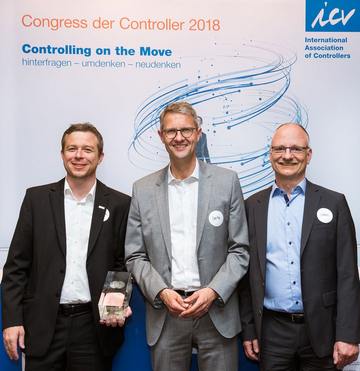
On Monday (April 23) at the Europe's largest controlling conference, the 43rd Controller Congress the "ICV Controlling Excellence Award 2018" was given to Robert Bosch GmbH, Powertrain Solutions Division (Diesel Systems), Stuttgart, for the "Big Data-Based Approach to Optimizing Net Working Capital at Bosch / Diesel Systems".
The Jury of the International Association of Controllers (ICV), headed by Prof. Dr. Dr. h.c. Jürgen Weber, WHU - Otto Beisheim School of Management, Institute for Management and Controlling (IMC) and Chairman of the ICV Board of Trustees, nominated three candidates for the Award: Brau Union Österreich AG, Linz; Robert Bosch GmbH, Powertrain Solutions Division (Diesel Systems), Stuttgart; Verband der Ersatzkassen e.V. (vdek), Berlin. Nominations and decision was a difficult task, reports Professor Jürgen Weber, because "the quality of submissions this year has been higher than ever". Finally "a trend-setting solution from the field of 'digitalization', which is extremely up-to-date for the entire controlling community," was awarded, said the Jury.
The solution of the winner Robert Bosch GmbH
The Robert Bosch GmbH, Powertrain Solutions, won the „ICV Controlling Excellence Award“ with the solution „Big Data-Based Approach to Optimizing Net Working Capital at Bosch / Diesel Systems“.
Economic framework conditions are changing faster and faster, and controlling in the Powertrain Solutions Division of Robert Bosch GmbH is also facing the challenge of adequately adapting controlling methods and processes. In order to establish controllers as business partners in accordance with own controller mission statement, efficiency must increase and a higher level of automation in the basic processes must be achieved. For these reasons, the Powertrain Solutions Division has developed a digitalization roadmap, which aims at the widespread use of Big Data tools in controlling by 2021. In addition to adapting the IT infrastructure, this required additional controllers’ skills in dealing with Big Data. Finally, organizational adjustments were required in terms of long-term collaboration across cross-functional teams to analyze and process results from Big Data applications. In order to gain experience with the use of Big Data and the resulting challenges in the practical example, a first project was started in 2017 with a Big Data & Analytics Tool. This has closed a hitherto existing gap in controlling in dealing and the associated working capital optimization by modern algorithms. As a result, the project has already uncovered conflicts of interest within working capital, analyzed viable potentials and recorded employee experience in working with BI tools. Based on the up-to-date, detailed data from the Big Data & Analytics Tool, Bosch Powertrain Solutions can now uncover potentials and, with the help of alert functions, react in a timely manner with the affected departments in case of deviations.
The nominated solution of Brau Union Österreich AG
The solution: „KPI (Key Performance Indicator) Framework in der Supply Chain der Brau Union Österreich AG“ was nominated to the Award
In Brau Union Österreich AG the controllers, as business partners, want to increase the financial knowledge of their management partners and their departments and thus promote cooperation within the company, especially in the supply chain. For this purpose, a tool has been created with which all parties involved can recognize their contribution to the company's success and identify management variables. This will further develop the understanding of financial data in operational areas. The KPI Framework is integrated into the governance cycle and thus a fixed component for managing the supply chain at various levels. It's not just the first report in the supply chain linking production and logistics metrics; rather, the supply chain now also has a clear representation of logical links between the key figures. As a result, cause and effect considerations per key figure are possible and employees can understand their contribution to the company's results. Everyone in the supply chain, from the SC director to the shop floor level employee, can benefit from this report and gain additional financial knowledge. The framework is used in most management-relevant areas of the supply chain.
The nominated solution of Verband der Ersatzkassen e. V. (vdek)
The solution: „National Health Insurance Planning Tool as Controlling Solution of the vdek for Planning of the Financial Development in the Legal Health Insurance“ was nominated to the Award
The planning tool was commissioned by the Verband der Ersatzkassen (vdek) and introduced by Barmer as a joint project of all health insurance companies in Germany - Barmer, Die Techniker, DAK Gesundheit, Kaufmännische Krankenkasse, HEK Hanseatische Krankenkasse and hkk Handelskrankenkasse Bremen. The health insurance companies need a financial planning instrument. To do so there are no blueprints on the market, as the national health insurance system is very special. In addition, the individual cash planning must be flanked by planning financial development for the health insurance system, as this is the basis for the financial development of the individual insurance companies. This is exactly what the nominated solution offers. With the new health insurance system planning tool, the project team has succeeded in creating a tool and an overall process that incorporates almost all the information concerning the health insurance system in the Federal Republic of Germany. The central factor determining this is the cost-covering contribution rate to be paid by employees and employers in a medium-term plan. At the heart of the controlling solution are the completely new types of financial scoreboards, which comprehensively describe the financial resources of the entire system at key performance level in all areas. An important role in the overall process plays the technical know-how of the individual financial controller, who must analyze and evaluate all the data, and then process it with technical support. The health insurance system planning tool provides as a central information the cost-covering contribution rate for the health insurance system. This is then used primarily at the individual cash level to create short- and medium-term financial planning and to develop pricing strategies. In addition, the results are needed for policy discussions in the health insurance system as well as for an inter-association early warning system and individual-cash competition rules.
The Controller Award 2017 of the International Association of Controllers (ICV) goes to EDEKA Südwest. On Monday (May 15), the team "company development" of the controlling division was awarded for its "innovative, direction-pointing solution for the comprehensive modification of the management system and controlling" at the 42nd Controller Congress in Munich.
The EDEKA Südwest is a company group with a wholesale, a number of business units and subsidiary companies, whose success depends decisively on the complete networking and coordination of the management and controlling systems. Very often quick decisions are needed, which effects must be assessed and recognized in all directions. With the new, excellent solution, called "Development Model", EDEKA Südwest provides a central management tool. It enables business leaders to manage and control strategic objectives and actions.
The "Development Model" helps to break down the strategy into strategic goals for the following years and to assign to them measures from the various areas. In addition, measures can be allocated into the existing management systems and can also be immediately supplied with (planned) budgets and cost centers, eventually investments. They can also be therefore used as precursor and basis for the annual company planning. Each business unit manager is given a complete overview of the measures from the entire group, which will affect him - also in the coming financial years.
During development of the solution, individual measures of the business divisions or subsidiaries of EDEKA Südwest were identified as a connecting element of the systems. With the award winning "Development Model", measures from in-field handling are transferred into a central tool.
The key success factor for development and introduction was a "careful" approach; dialogue, feedback, openness for the requirements, but also for the concerns of the business unit managers. It was essential for the project initiators from the department "enterprise development" to involve all areas.
The Chairman of the ICV Jury, Prof. Dr. Jürgen Weber, WHU - Otto Beisheim School of Management, Chairman of the ICV Board of Trustees, explains: "It is easier to formulate an ambitious strategy than to implement it in practice. Pragmatic approaches that can be used in day-to-day management practice are called for, especially when the strategy is translated into concrete actions." The fact that the strategic management is often detached from the operative or is only inadequately associated with it, Weber calls a "well-known shortage in practice".
The best way to achieve integration is, as the Controller Award 2017 winner shows, "an innovative, direction-pointing solution for a comprehensive change of the management system and controlling," says prof. Weber. The awarded solution 2017 recognizes "easy access and step-by-step growth": "Integration of already existing instruments; start on Excel basis, then transition into a separate software solution; at the beginning small scale, then learning and expanding upon recognition of the associated benefits". It also highlights the need for individualized approaches and speeds as well as the inclusion of sustainability objectives.
For the judges of the International Association of Controllers (ICV), three other criteria were decisive. In addition to the sustainability of the change implemented with the solution on the one hand, they also see the benefits for the entire company on the other hand, not just for controlling - a key criterion, since the success of controlling and the success of a company are closely related. Thirdly, the solution was designed and implemented by the controllers themselves. This is important for the jurors, as the sustainability of a solution is particularly jeopardized when the change is strongly driven and operated externally.
This year's jury, chaired by Prof. Dr. Jürgen Weber, included: Hillert Onnen (former BLG, ICV Board of Trustees Member), Roland Iff (Geberit International AG), Hubert Tretter (t4t Management Consulting) and Prof. Dr. Andreas Seufert University of Applied Sciences Ludwigshafen, ICV expert work group "BI / Big Data and Controlling").
The EDEKA Südwest is celebrating its 90th birthday this year. With a group turnover of 8.4 billion euros in 2016, it is the second largest of seven regional companies in the national EDEKA network. The business area covers the federal states of Baden-Württemberg, Saarland and Rhineland-Palatinate with parts of Hesse and Bavaria. EDEKA Südwest operates food wholesale and retail as well as upstream production companies for foodstuffs. The business area counts about 1,300 food markets, and around 1,000 markets are operated by self-employed merchants. For EDEKA Südwest, work inclusive independent retail trade employees approximately 44,000 people, of whom 2,650 are apprentices.
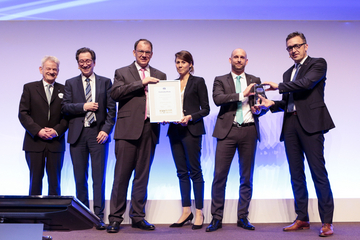
Controller Award 2016 for Covestro Deutschland AG
ICV Jury honors the balance between the short-term pragmatic solution of the IPO processes and the holistic visionary design of the long-term management and controlling landscape in the company
Munich, April 25, 2016– The Controller Award 2016 of the International Controller Association (ICV) goes to the controlling team of Covestro Deuschland AG. On Monday (April 25) at the 41st Controller Congress in Munich the Award donated with 5.000 EUR was given for the project “Comprehensive redesign of the entire controlling as a result of the Cavestro carve out from the Bayer Group.”
The award was presented by the ICV Chairman of the Board Siegfried Gänßlen and the Head of the Jury Prof. Dr. Dr. h. c. Jürgen Weber, Chairman of the ICV Board of Trustees, Otto Beisheim School of Management and received by Wolfgang Zellerhoff, Global Accounting & Controlling, head of the global controlling functions in Covestro Group. After the award ceremony Zellerhoff presented the excellent solution in front of 580 listeners.
Exemplary controlling change after the carve out
In his speech, Prof. Weber praised the project as an "innovative solution that gives direction in the field of a comprehensive change in the management and controlling". The solution made a very successful controlling even more successful. After the exemplary carve out, the Covestro controllers, being suddenly no longer part of the Group Controlling within the Bayer Group, mastered the new big challenges.
When a company "from now on" is exposured to the capital market - explained the Head of the Jury - answers how to do justice to the controlling on the capital market are being looked for. The controlling team of Covestro Germany AG found convincing answers to this question as well as to the question, how to realize a comprehensive system check and a consistent system change in the course of the IPO process – despite very complex tasks. It was presented how such a process should be organized exemplary, what traps should be avoided, what barriers should be overcome and what steps should be done.
Covestro solution with a number of good characteristics
The solution of the Controller Award winner 2016 Covestro presents a number of good characteristics, praised the ICV Head of the Jury. A wonderful balance between short-term pragmatic solutions of the IPO processes and a holistic visionary design of the long-term management and controlling landscape was created in the company. The transition from the limited task portfolio of sub-group controlling into a professional group controlling able to work on capital markets went smoothly.
In addition, the winners have found a holistic approach to professionalize management and controlling; an exemplary combination of controlling identity (role & claim) - management approach - efficient & effective organization - processes - human resources and community development. The Covestro controllers - continued Prof. Jürgen Weber – concentrated themselves in an exemplary way on the areas with the highest value creation and on issues with major earnings leverage and little controlling coverage so far.
The Jury describes the awarded solution as innovative: the controlling team actively dealt with innovation’s themes for management and controlling, for example with volatility management in controlling.
Finally, yet another criterion have spoken for Covestro Deutschland AG: Controlling was a driving force for the interface issues such as the concept of a new intensification system or strategic planning.
Jury decision is based on the controllers’ mission
Every year, International Controller Association (ICV) praises an exemplary controlling solution with the Controller Award at the Controller Congress, Europe's biggest controlling conference. The Jury choice is based on the controllers’ mission formulated by the ICV and the International Group of Controlling (IGC). An exemplary controlling work is when controllers achieve a significant change thanks to their work – in other words, it is tested in practice. This change does not only regards not only controlling itself, but the whole company. The change is developed internally by the controllers and new innovative ways are chosen to achieve success (Information on the Controller Award winner since 2003 in the Hall of Fame on the ICV Homepage www.icv-controlling.com -> Association -> Awards -> Awards winners).
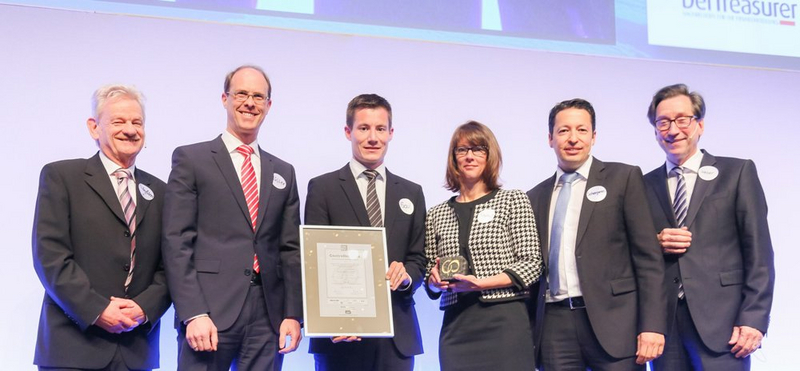
Munich, 20 April 2015 – The 2015 Controller Award is awarded to RWE AG in Essen. Their interdisciplinary project team under the leadership of Dr Peter Scherpereel, Head of Controlling Generation & Trading, investigated the influence of biases, i.e., mental simplifications, on decision-making processes. While doing so, the team also developed techniques to improve the quality of decisions. The International Controller Association (ICV) bestowed the EUR 5,000 award for this innovative and exemplary change project on behavioural-based controlling at the 40th Congress of Controllers on 20 April.
The project involved taking behavioural-based aspects of controlling, which have been dealt with until now primarily in theory, and transferring them into actual decision-making processes. Specific measures for improvement were then developed. The starting point for the project was the reduced expectations regarding the profitability of several investments made in the past. These diminished expectations were due in part to significant changes in the framework conditions of the projects as well as project delays and budget overruns. The focus of the award-winning controlling project was to analyse the causes of these shortcomings as well as develop and implement measures to improve future decisions.
The foundation for the investigations was the concept of so-called cognitive biases, i.e., short-cuts or mental simplifications made when making decisions, which lead to flawed decisions. The ICV has been dealing with the concept of behavioural controlling in its idea workshop since 2011 in order to develop implementable knowledge for controlling practitioners. Insights from psychology have provided important impulses for dealing with the behavioural aspects of controlling, showing that rationality is often influenced by biases.
Establishing foundations for better decisions
A crucial role in this award-winning RWE project was the insight that although biases are a part of the human thought process which cannot be eliminated, the awareness of their existence and their effects is an important foundation for better decisions.
The project team, consisting of Dr Peter Scherpereel, Julian Gaul, Jan Lozek and Diana Rauhut, initially analysed the respective underlying decision processes using example projects in order to determine whether and which biases are particularly relevant in the RWE Group. Subsequent workshops, first with top management, created awareness for the issue. The project team then worked together with the participation of top management to develop techniques to reduce the effects of biases.
In order to implement structural countermeasures in the organisation, these techniques were first tested in several pilot projects. Special workshops were developed on the subject of biases in order to make management and employees in the group familiar with the issue. In the meantime, every resolution made by RWE’s management board involves making transparent which techniques were used to reduce biases. The sustainability of the workshops’ contents is supported by an easily understandable brochure with background information and countermeasures that are explained in detail. Besides the implementation of structural measures, the cultural change triggered by the project – open discussion of critical issues – is one of the key achievements of the project.
Biases influence the behaviour of managers and controllers
Biases exist in all phases of controlling processes and equally influence the behaviour of both managers and controllers. Controllers must be aware of this. Although a broad consensus prevails in academics about the existence of biases, proposals for practical solutions have seldom been available until now. Creating awareness of the problem is the first step towards finding a solution. As such, the solution provided by the winner of the 2015 Controller Award is very important for the controlling community.
The Dream Car report of the ICV’s Idea Workshop from 2012 posed the question “what makes controllers (more) successful?” and answered by saying that “it is how you behave that counts!” – i.e., “the controller’s function is decision-support and behaviour-management of the manager. Traditional decision-oriented controlling concepts assume that it is sufficient to provide the manager with all information relevant for the decision as well as the necessary methods and tools so that the manager is then able to make optimal decisions in accordance with the company’s objectives. In contrast, a behavioural orientation takes into account motivational characteristics (wanting deficits) and cognitive limitations (skill deficits) of the manager and the controller in the context of decision support and behavioural management.” Cognitive limitations would cause skill deficits among managers and controllers. According to the Dream Car report, the focus on skill deficits has led to a stronger behavioural orientation in controlling.
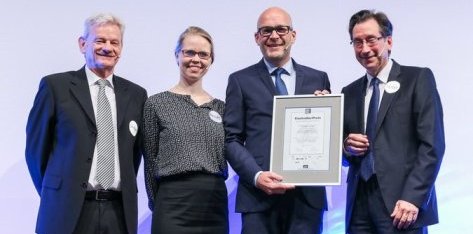
On Monday, May 19, 2014, at the 39th Controller Congress in Munich, EliteMedianet GmbH from Hamburg, operator of the online dating agency ElitePartner, received from the International Controller Association (Internationaler Controller Verein ICV) the prestigious award for an exemplary marketing controlling solution.
EliteMedianet GmbH is a subsidiary of Tomorrow Focus AG with more than 80 employees in Hamburg's HafenCity and operates ElitePartner - one of the leading online dating agencies in Germany. With the project “Media Compass – regression-based optimization of allocation of the advertising budget" ElitePartner has developed and introduced an innovative and exemplary solution for decision support. This helps to distribute the media budget, which accounts for two-thirds of the annual turnover of approximately EUR 30 million to various media channels so that the goals are achieved optimally. By "flexible regulating screws" in the decision-making process also specific sub-objectives can be considered. Depending on the target group in the specific time, weights can be changed in the model. Precise predictions are possible, deviations can be analyzed and incorporated into the allocation model. Overall, the company puts a stronger focus is at the corporate strategy.
The solution is valued because of their simplicity of use as a communication basis for the decisions involving managers and employees in the company. Their use led to a budget redistribution for a more efficient achievement of objectives - in particular, the increase of the "number of new customers registration" - and to improvement of the cost -to-sales ratio of 9.8 percent from 2012 and 2013.
The 5,000 EUR International Controller Award in 2014 was given at the opening of the largest controlling symposium in German-speaking countries, the 39th Controller Congress. The award was given by the Chairman of the International Controller Association, Siegfried Gänßlen, CEO of Hansgrohe SE and Prof. Dr. Dr. hc Jürgen Weber, Chairman of the ICV Board of Trustees, Otto Beisheim School of Management, to Markus Winter, Managing Head of EliteMedianet GmbH, Janina Arndt, Robert Brunner, Christna Pieplow, Andra Plückthun, Katrin Sawadsky and Juno Ziss. In his speech, the jury chairman Prof. Dr. Dr. hc Jürgen Weber named this year's winner’s solution a "solution for a core process of the company"; namely the planning and distribution of media budgets . The controllers have proved themselves as drivers of development and as partners of management. The easy-to-use and stimulating communication in marketing management instrument supports decisions based on hard statistical analyzes and not just based on a gut feeling. The result is an understandable Excel-Standard-Tool for internal controlling customers of marketing and Media-Buying.
Weber explained that marketing controlling have in practice still a large pent-up demand. But in the meantime, the marketing takes care of the "return on marketing" itself – although today, many marketers are far less competent in the ability to count than the controllers. As a partner of marketing manager controllers thus provide even better solutions available – a requirement that the Award winner 2014 fulfils exemplary.
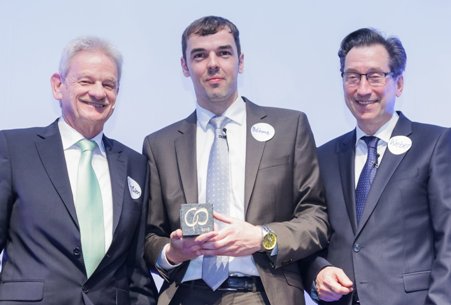
German Lufthansa AG received the famous Controller Award 2013 of the International Controller Association (ICV) on the 38th Controller Congress in Munich. The ICV awarded a project “Bandwidth simulations in the passenger air traffic branch” – an exemplary project considering increasing insecurity of the periodic planning in the volatile times.
„This year‘s winner focuses on the special and highly current aspect of the effective controlling work. In the Lufthansa AG it was possible to successfully find an orientation on the periodic planning as a key area of a controller” – explains this decision Jury Chairman Prof. Dr. Dr. h.c. Jürgen Weber, Otto Beisheim School of Management, Institut for Management and Controlling (IMC), Chairman of the Board of Trustees ICV. “Thanks to this exemplary project it was possible to change the planning content: a new planning technique was realized consequently; it’s an integrated usage of little used simulation tools.”
The Controller Award is given to a company with a controlling solution meeting the following criteria:
- It contributes to a significant change which has been tested in practice.
- This change does not only affect the controlling department, but also contributes to the success of the whole company.
- The change has been developed by the controllers in-house and represents an innovation.
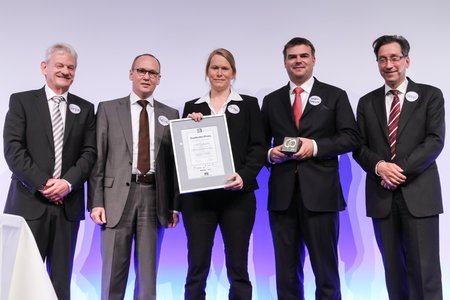
Otto Group Hamburg has received the annnual Controller Award 2012, founded by the International Controller Association ICV. The awarded project was “Establishing the Activity Based Costing in the Suppliers Service Center”. It was honored for a model management of internal services.
The Chairman of the Jury Prof. Dr. Dr. h.c. Jürgen Weber, WHU - Otto Beisheim School of Management explained that there were many reasons for awarding Otto Group. The company established a fundamental and comprehensive reorganization process, reorganized the production of services and established a professional service management as well as a new internal price model. Additionally, the consequent change management led to efficiency improvement. As a result, this not only reduced unit-costs of the services but especially to a high satisfaction of the internal customers.
On the field of the accounts-payable department, the Otto Service Center processes about 450 000 accounts for 10 concerns of the Otto-Group every year. In the total costs of supplier traffic of 3,8 million EUR Michael Felix, the Head of the Suppliers Service Center of the Otto Group, sees, that “the subsidiary companies could save substantial amounts”. The important development, caused by the realized projects means “that you can see the starting points for cost saving”. The transparency changed the attitude to such reloaded processes as for example to the accounts-payable department. It was clear in that case, that you can reduce costs by yourself. We develop ourselves from the classical overheads counted for the whole enterprise to the costs of every company unit, the products’ groups and single articles”.
“The topic “Shared Service Center“ is now the main focus of interest of many enterprises, which want to reduce costs”, explains Jürgen Weber. "At the same time we have to standarize the processes and manage them consequently. By introducing the Activity Based Costing method Otto-Group uses a very efficient but still not known tool for Service Center management. Otto-Group shows how to improve the high complexity of the Activity Based Costing and how to increase the current low attention of the total costs for the benefit of whole company”.

The 2011 Controller Award of the International Controller Association (ICV) was awarded to McDonald’s Deutschland Inc. for its project “Controlling of the McCafé Initiative.“ The award ceremony was held on Monday (16 May) in Munich at the 36th Annual Congress of Controllers. The ICV has awarded its 9th Controller Award for an exemplary controlling solution. The EUR 5,000 award was made to honour McDonald’s controlling departments, which launched the outstanding project entitled “Controlling of the McCafé Initiative” to support and monitor the entire process to realise the McCafé concept since 2003, i.e., even prior to the start of the market launch.
The chairman of the jury, Prof Jürgen Weber, Chairman of the ICV’s Board of Trustees and Director of the Institute for Management and Controlling at the WHU Otto Beisheim School of Management in Vallendar, explained the decision this way: “The key features of this excellent project are, first, the rigorous approach it used to accompany and support the development of a new line of business, from the initial idea and the successful first implementation through to its enhancement as the years progressed. A second highlight is the development of the controllers themselves, who were transformed from being just suppliers of numbers into business partners. Together, both make the project a worthy winner of this year’s Controller Award.”
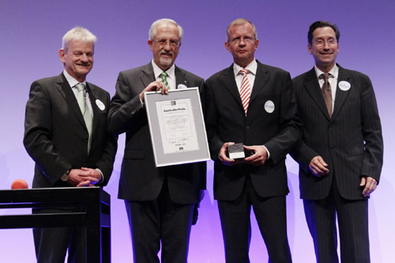
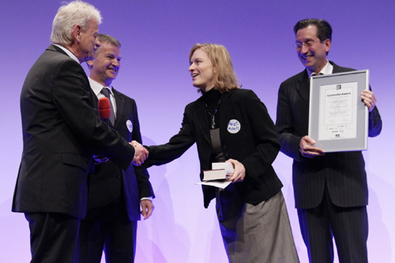
The 2010 Controller Award was awarded on Monday, 14 June, in Munich at the 35th Annual Congress of Controllers of the International Controller Association (ICV) to Germany’s Federal Employment Agency (BA). The award was made to honour an exemplary controlling solution for entities in the public-sector – described as a “lighthouse project” by the chairman of the jury. A special award was also bestowed upon Birgit Feistmantl, a controller at Swarovski Japan Ltd.
The 2010 Controller Award, which includes EUR 5,000 in prize money, was presented to the BA for its “SAMP – Controlling of Labour Market Programmes” project. SAMP supports the budgeting process and the modification of budgets to rapidly changing conditions. Given its significant need for controlling during the year, the BA decided to implement a quarterly update of its annual planning in order to provide a basis for making adjustments to the current fiscal year’s activities.
The ICV jury also presented a special award to Birgit Feistmantl, a controller at Swarovski Japan Ltd. Working at the Japanese subsidiary of the Austrian company, she succeeded at linking the subsidiary’s Japanese accounting with a controlling process based on the ICV’s Mission Statement. The results are considerable changes in cost allocations and personnel management.
Selection process highlights three new hot topics
For the 8th time the ICV has awarded the Controller Award for an exemplary controlling solution. This year the jurors experienced both the familiar and something new in the selection process. The chairman of the jury, Prof Jürgen Weber, Chairman of the ICV’s Board of Trustees and Director of the Institute for Management and Controlling at the WHU Otto Beisheim School of Management in Vallendar, recognized several innovations among the applications, saying that these three hot new topics “are all important for the controlling profession.”
First, the view of “brands as drivers of value and as a corporate asset” was identified as a “new subject-matter area” where controllers urgently need to develop expertise. Today, according to Weber, appropriate assessments are only occasionally performed (as intangibles), making this issue an underdeveloped aspect of the regular scope of controlling activities. One application for the 2010 Controller Award regarding brand performance management points the way in this regard because it involved not just brand valuation but also “genuine brand management in which the controller plays an important role,” said Weber.
A second innovation can be seen in the “perspective of internationalisation.” The “German concept of controlling” is just as unknown in Asia as it is in the Anglo-American world, said Jürgen Weber. But this year, according to Weber, there was one pioneering application in this regard. “An attempt succeeded at breathing a controlling life into the Japanese accounting of a Japanese subsidiary of an Austrian company,” Weber reported. When doing so, “the award winner accomplished a very sensitive modification of 'German controlling' to Japanese features, e.g., through the integration of elements of continuous improvement.” The results are “considerable changes in both cost allocations and in personnel management.” In light of this, the jury honoured the commitment of Birgit Feistmantl, a controller at Swarovski Japan Ltd, by presenting her with a special award.
The third pioneering application for the Controller Award came, according to the ICV jury, from a “field where the concept of controlling has gained a foothold, to be sure, but where practical solutions still tend to be only theoretical in nature, namely in public-sector institutions,” explained head juror Weber. According to Weber, this is an area where there is significant potential and an urgent need for controlling in order to utilise increasingly scare public resources in a more efficient and effective manner. In this context, the Controller Award was bestowed upon a public-sector institution that has “succeeded at pivoting away from the traditional method of input control towards a results- and effect-oriented approach to controlling.” A “remarkably rigorous reorganization of management has taken place at the German Federal Employment Agency (BA) with the strong participation of controllers,” resulting in a considerable improvement in both efficiency and effectiveness, explained Weber.
The application for the ICV award was made for one aspect of a larger change project, namely regarding the budgeting process and the modification of budgets to rapidly changing conditions. Weber pointed out that fiscal finances and budgeting are much more complex than in private industry, making them slow and inflexible. In areas where the scope of responsibilities can fluctuate strongly, there is a high need for controlling during the year. That is why the BA decided to supplement its annual budgeting process with a quarterly update during the year to provide a basis to make modifications to work activities. As Jürgen Weber explained, the 2010 Controller Award to the BA is intended to encourage public-sector institutions to make the idea of controlling a reality. The award was made to what he called a “lighthouse project.”
ICV Newcomer Award 2023
Winners in an interview
The winners of the ICV Newcomer Award 2023 are Shawn Pauer and Erik Lüerß. Their thesis is dedicated to the topic “Success Factors in the Implementation of Machine Learning Algorithms in Financial Forecast Processes”. In conversation with Peter Bluhm from atvisio.TV, in addition to the Award winners, also Prof. Dr. Utz Schäffer, student supervisor at WHU - Otto Beisheim School of Management, and Prof. Dr. Nicole Jekel. Jekel is the Chairwoman of the Jury for the ICV Newcomer Award.
Controlling Newcomer Award
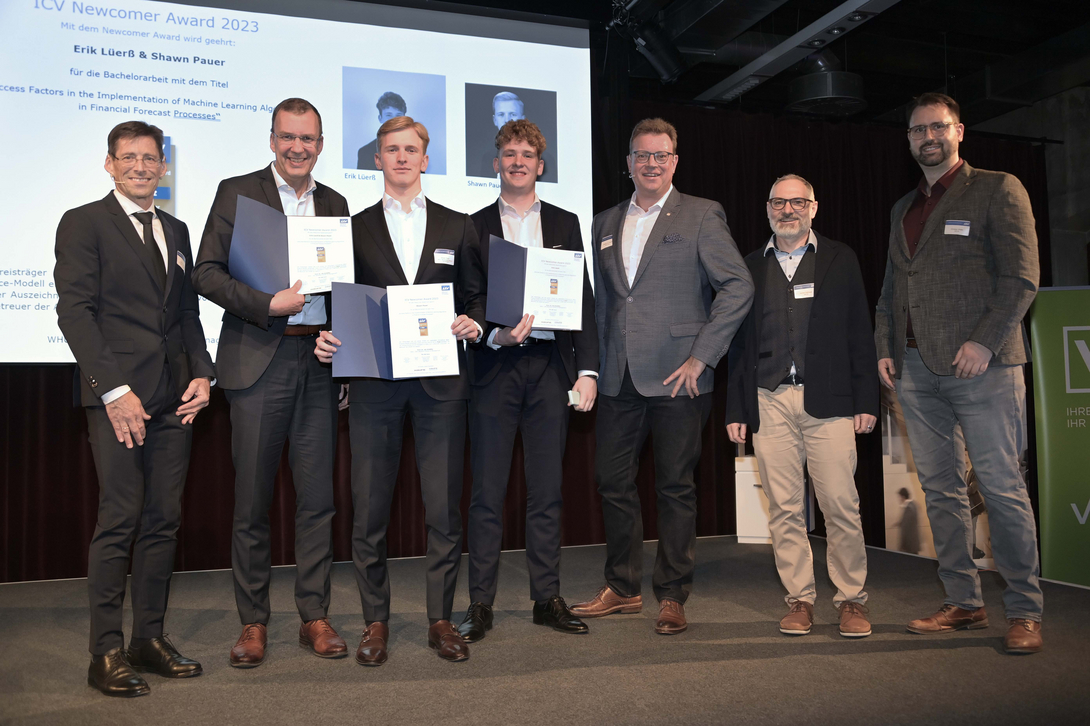
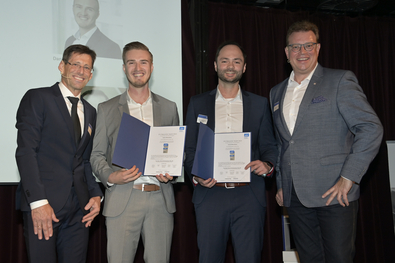
Steyr, Austria, November 24, 2023. Shawn Pauer and Erik Lüerß are the winners of the ICV Newcomer Awards 2023. The winning duo was recognized at the ICV Autumn Conference CIS Controlling Insights Steyr for their work entitled “Success Factors in the Implementation of Machine Learning Algorithms in Financial Forecast Processes”. “You have made a valuable contribution with your research and provided important insight into the successful implementation of machine learning in financial forecasting!” said laudator and ICV Vice-Chairman of the Board Matthias von Daacke, conveying the Jury’s decision.
The two students from the WHU - Otto Beisheim School of Management were accompanied through their bachelor thesis by Prof. Dr. Utz Schäffer, who also recognized the potential of the chosen topic and agrees with the ICV Newcomer Award Jury because “although the advantages of machine learning are obvious to most managers in business, its application in financial forecasting often falls short of expectations”. The Jury is made up of representatives of theory and practice in controlling: Jury Chairwoman Prof. Dr. Nicole Jekel, Prof. Dr. Susann Erichsson and Prof. Dr. Solveig Reissig-Thust are professors at the University of Technology and Economics and Law in Berlin; Gunnar Elbers is a partner at CTCon GmbH in Düsseldorf; Christina Keindorf heads Group Controlling at Deutsche Bahn AG. As always, when making their decision in 2023, the Jury placed great emphasis on the four aspects of scientific foundation, practical relevance, direct feasibility and degree of innovation.
Successful implementation of machine learning requires active management of critical factors
Among the eight works submitted in the race for the ICV Newcomer Award 2023, the work by Shawn Pauer and Erik Lüerß was also convincing because, in addition to a thorough literature research and a comprehensive case study with 16 expert interviews at SAP AG, it also had its own best practice model was developed. This offers 18 action-guiding success factors in the four dimensions of goal and scope, tool, employees and culture as well as process. They help companies decide on the most successful implementation of machine learning in their own financial forecasts. “Instead of focusing on the technical perspective, your work analyzed the business implications and challenges for change management when introducing machine learning in financial forecasting,” the Jury praised the winning team’s approach to the topic. Ultimately, only by actively managing the critical factors for successful implementation could the benefits of machine learning-based forecasts be fully exploited - higher accuracy, avoidance of cognitive biases, better alignment, greater timeliness and increased cost efficiency.
Austria's top 500 companies contribute insights to Daniel Mitterlehner's work
Daniel Mitterlehner secured second place in the ICV Newcomer Award 2023 with his master thesis “The future topics of controlling in large Austrian companies”. The student from the Upper Austria Steyr University of Applied Sciences was accompanied through his master thesis by Ing. Mag. Thomas Rockenschaub. The focus of the work was the survey of the top 500 companies in Austria with the highest sales - with a response rate of 37 percent. The Jury summarizes that the final thesis reflects the times with its high quality and also delivers meaningful results: “What is particularly impressive is your ability to incorporate current literature and comparable studies into your work and to provide a clear picture of the future for controlling in Austria draw". It is not for nothing that the work is already being considered as a publication in the specialist journal “Controlling and Management Review”. The team of experts knows that such great attention to a master thesis is extraordinary.
Antonia Schukraft puts integrative performance management into practice as a three-stage cycle
Third-placed Antonia Schukraft focused on integrative performance management, getting very close to practical experience with the support of Magna PT B.V. & Co. KG. In her bachelor thesis, supervised by Prof. Dr. Roman Stoi from the Baden-Württemberg Cooperative State University in Stuttgart she is concerned with the combination of Balanced Scorecard (BSC) with Objectives & Key Results (OKR) to form an integrated performance management system. This enables systematic and multi-stage implementation of vision and strategy as well as agile tracking of set goals. “Antonia Schukraft uses a three-stage performance management cycle to translate vague visionary ideas into concrete short-term goals that are operationalized using OKRs and implemented iteratively over the course of the year.” This impressed the Jury just as much as the practical testing in the development area of the automotive supplier Magna and the associated in-depth examination of the content with adequate OKR sets as well as the visualization and implementation of reporting. “Your work clearly shows that through the cyclical combination of BSC and OKR, both the strategic goals can be implemented in a structured manner and the derived objectives and key results can be tracked throughout the year,” the Jury summarizes the result.
ICV would like to thank students and university representatives for looking beyond theory
Laudator Matthias von Daacke was impressed by the finalists' topics. During the Award ceremony, the Vice-Chairman of the ICV Board pointed out the importance of intensive exchange with universities and other training institutions in order to continuously develop controlling. The ICV sees itself as a mouthpiece and representative of controlling practice. His thanks went both to the students who develop innovative scientific solutions to practical problems in controlling during their studies, and to the professors who maintain a practical focus in their teaching and research. This is the only way to guarantee the range that was once again evident in the submissions for the ICV Newcomer Award this year: the students once again covered many interesting topic areas with work from driver-based planning to design thinking and the EU taxonomy.
The ICV Newcomer Award, worth a total of 4,000 euros, is sponsored by Haufe and the Haufe Academy. Applications for the ICV Newcomer Award 2024 can be submitted until May 15: https://www.icv-controlling.com/en/association/awards/icv-newcomer-award.html.
Der ICV Newcomer Award 2019 für ist am 16. No-vember in Berlin verliehen worden: Der 1. Preis geht an Daniel Braun und Jakob Merz von der WHU – Otto Beisheim School of Management, Vallendar, für die Masterarbeit: „Agile @ Controlling. How can Controlling Support Different Degrees of Agility in Organizations?”, betreut von Prof. Dr. Utz Schäffer; der 2. Preis an Gernot Domes von Fachhochschule Kärnten, Villach, mit der Masterarbeit: „Die Auswirkungen der Digitalisierung im Kontext von Industrie 4.0 auf die Funktionen des Controllings am Beispiel lokal produzierender Unternehmen“,betreut von Dr. Alexander Sitter; der 3. Preis an Anna Adem von der Dualen Hochschule Baden-Württemberg, Stuttgart, mit der Bachelorarbeit: „Agiles Target Costing in der Halbleiterbranche am Beispiel der Infenion Technologies AG“,betreut von Prof. Dr. Roman Stoi.
Enge Verbindung von Wissenschaft, Lehre und Praxis
Die Jury-Vorsitzende, Prof. Dr. Nicole Jekel, Professorin an der Beuth Hochschule für Technik Berlin, verlieh den ICV Newcomer Award auf der Fachtagung Controlling Inspiration Berlin – CIB 2019 gemeinsam mit der Jury und mit dem Stv. ICV-Vorstandsvorsitzenden, Matthias von Daacke. In ihrer Laudatio erklärte Professorin Jekel, „für die praktische Weiterentwicklung des Controllings ist der intensive Austausch mit Hochschulen und anderen Ausbildungseinrichtungen notwendig. In diesem Sinne möchten wir mit dem Preis die Leistung junger Nachwuchskräfte, die bereits während ihres Studiums innovative wissenschaftliche Lösungen für praktische Probleme des Controllingsentwickeln, anerkennen.“ Sie dankte allen beteiligten Studierenden und deren Professorinnen und Professoren, weil diese den Praxisbezug in ihrer Lehre und Forschungpflegen. „Für die Controller-Praxis ist es von großer Bedeutung, dass sich Studierende während ihrer Ausbildung nicht nur mit theoretischen Konzepten und Methoden, sondern auch mit deren praktischer Anwendung und daraus entstehenden Problemen beschäftigen.“
Zwölf Teilnehmende aus allen Ländern der DACH-Region hatten Abschlussarbeiten eingereicht. Diese deckten thematisch von klassischen Controlling-Instrumenten wie der Kostenrechnung und der Budgetierung über das Risikomanagement bis zu Agilität und Digitalisierung die ganze Bandbreite ab. Zudem bildeten auch die einreichenden Institutionen die gesamte Breite des Hochschulspektrums ab, was laut Professorin Jekel für eine breite Akzeptanz des Nachwuchspreises in der Hochschullandschaft spreche.
Jury-Mitglieder würdigen die Siegerarbeiten
Der von Prof. Dr. Nicole Jekel geleiteten Jury gehören an: Gerhard Radinger, Trainer der CA Controller Akademie; der langjährig ehrenamtlich im ICV engagierte Dr. Walter Schmidt aus Berlin; Christina Keindorf, Leiterin Konzerncontrolling DB Konzern (CC), in Personalunion Leiterin Controlling Gruppen-/Servicefunktionen (CCH) sowie Kfm. Geschäftsführerin Usedomer Bäderbahn, Vorstand Finanzen DB Barnsdale AG, Kfm. Geschäftsführerin DB Competition Claims GmbH, und Ute Schröder von den Controlling- Benchmark-Zirkeln.
Bei ihrer Entscheidung hat die Jury – wie in den Jahren zuvor – feste Kriterien angelegt: Neben der wissenschaftlichen Fundierung ging es bei der Entscheidung vor allem um die praktische Relevanz der Fragestellung, die direkte Umsetzbarkeit der entwickelten Konzepte, den Innovationsgrad der Abschlussarbeiten sowie um die Konformität der Arbeiten bzw. derer kritischen Diskussion zu den Grundsatzpositionen des ICV.
Jury-Mitglied Gerhard Radinger hielt die Laudatio für die 3. Preisträgerin: Anna Adem von der Dualen Hochschule Baden-Württemberg mit der Bachelorarbeit „Agiles Target Costing in der Halbleiterbranche am Beispiel der Infenion Technologies AG“, betreut von Prof. Dr. Roman Stoi.
Die Arbeit sei eine gute Mischung aus Theorie und Praxis, eine Verbindung von Controlling-Klassiker (Target Costing) und modernem Thema (Agilität). Hier sei eine eigenständige und innovative Konzeption zum agilen Target Costing in der Halbleiterindustrie erarbeitet worden. Das Werk überzeuge insbesondere im Praxisteil durch die detaillierte Analyse der Situation im Ausbildungsunternehmen sowie durch die exemplarische Umsetzung der erarbeiteten Konzeption auf ein konkretes Chipentwicklungsprojekt, das messbare Erfolge gezeigt habe. Der innovative Ansatz bestehe in der Verknüpfung des klassischen Target-Costing-Prozesses mit agilen Methoden der Organisation und des Projektmanagements. Das ermögliche, erfolgsrelevante Bedürfnisse und die Preisbereitschaft der Kunden bereits zu Beginn der Produktentwicklung einzubeziehen. Nach dem „Fail-early-Prinzip“ ließen sich erste Entwicklungsergebnisse iterativ bewerten, um sie bei Bedarf unter Beachtung vom Markt erlaubter Kosten sowie von Kundenanforderungen schnell und flexibel anzupassen.
Die Jurorin Christina Keindorf hielt die Laudatio für den 2. Preisträger: Gernot Domes von der Fachhochschule Kärnten, Villach, mit seiner Masterarbeit „Die Auswirkungender Digitalisierung im Kontext von Industrie 4.0 auf die Funktionen des Controllings am Beispiel lokal produzierender Unternehmen“, die von Dr. Alexander Sitter betreut wurde.
Die Arbeit beantworte anhand empirischer Untersuchungen die Frage, inwieweit lokale Produktionsunternehmen auf die Veränderungen der Funktionen und Aufgabengebiete des Controllings im Zuge der fortschreitenden Digitalisierung und Industrie 4.0 vorbereitet sind. Diese Problemstellung sei anhand eines bestehenden Reifegradmodells zur digitalen Transformation im Controlling, welches der Autor eigenständig erweitert habe, um konkrete Handlungsempfehlungen für produzierende Unternehmen ableiten zukönnen. „Damit verbindet Herr Domes in beispielhafter Weise Theorie und Praxis.“
Jury-Mitglied Dr. Walter Schmidt würdigte den 1. Preisträger: Eine gemeinschaftliche eingereichte Abschlussarbeit von Daniel Braun und Jakob Merz von der WHU – OttoBeisheim School of Management, „Agile @ Controlling. How can Controlling Support Different Degrees of Agility in Organizations?”, betreut von Prof. Dr. Utz Schäffer.
„Die beiden Autoren haben sich nicht nur der Mühe unterzogen, die Vielzahl sich zum Teil widersprechender Agilitäts-Definitionen zu ordnen. Sie haben es auch verstanden, die doppelte Bestimmung von Agilität – externe Erwartungen und interne Ordnungsprinzipien – in eine intuitiv verständliche Matrix zu fassen. Das ist schon für sich eine schöpferische Leistung, die besondere Anerkennung verdient. Dadurch, dass sie beide Dimensionen mit dem Gedanken der Flexibilität verbinden, schaffen sie einen Agilitäts- Rahmen, in den die vielfältigen Aspekte der Führung von Unternehmen und Organisationen eingeordnet werden können“, so Dr. Schmidt. Die Autoren seien aber noch einen Schritt weiter gegangen, indem sie gezeigt hätten, dass Agilität keine „Alles oderNichts-Aufgabe“ darstellt, sondern differenziert auf verschiedene Inhalte und Organisationsstrukturen angewandt werden kann. „Mit ihrer Matrix geben die beiden Autoren dem praktischen Controlling ein einfach zu nutzendes Instrument in die Hand, um sowohl den Grad der Agilitätsansprüche als auch jenen seiner Umsetzung bestimmen zu können“, so Dr. Schmidt. „Ich hoffe, dass diese Matrix sich schnell verbreiten wird. Nur selten sind fundierte wissenschaftliche Erkenntnis und praktische Nutzbarkeit so dichtbeieinander.“
Christian Ludwig: Konzeption eines Kennzahlensystems für den Produktionsbereich zur Qualifizierung des Controlling im Metallbau am Beispiel der Yue Hui Enterprise Shanghai.

The ICV Newcomer Award 2022 goes to Ayse Kötemen. The graduate of the University of Duisburg-Essen (Mercator School of Management) has worked out the central challenges for a successful implementation of predictive analytics applications in controlling. The Vice-Charman of the ICV Board Matthias von Daacke handed over the Award virtually and in his laudation honored the extraordinary commitment of the Award winner: She used 193 high-quality observations for her empirical analysis.
The starting point of her work entitled “Use of Predictive Analytics in Controlling – An Empirical Analysis” was realizing that a number of projects in controlling in the field of predictive analytics (PA) fail, Kötemen reported in her presentation. Like the other two finalists she gave her speech as part of the ICV autumn conference CCS Controlling Competence Spaces. Kötemen emphasized that PA applications for controlling are a great opportunity to successfully process the increase in mass data due to big data and thus to enable improved, because data-driven, decision-making support for management. In her analysis, Ayse Kötemen got to the bottom of the reasons for the high degree of failure of these applications in controlling. According to her evaluation, the key challenges are insufficient data quality, a lack of know-how in the field of predictive analytics and a lack of support from top management. With these findings, Ayse Kötemen, who now works as Head of Finance & Procurement at the Rhein-Ruhr-Wupper Chemical and Veterinary Investigation Office, has created clear instructions for successful implementation of predictive analytics in controlling, Matthias von Daacke praised the ICV Newcomer Award 2022 winner for her theses that was supervised by Prof. Dr. Marc Eulerich.
Criteria for the ICV Newcomer Award? It has to be scientifically sound, relevant, feasible and exciting!
At the beginning of the Award ceremony, which took place online as part of the 20th CCS Controlling Competence Spaces, Christina Keindorf summarized what the Jury considered important when selecting the finalists in the competition. First of all, it is always about the scientific foundation, paired with a practical relevance of the question, according to the Head of Group Controlling at Deutsche Bahn. Just as important ae for the Award Jury, to which Keindorf belongs, are also the direct feasibility of the concepts developed and the degree of innovation of the theses. But that's not all. "Ultimately, it should also be exciting for you to come to today's controllers’ conference to be inspired by the topics of the ICV Newcomer Awards".
"Every controlling employee can directly conclude that there is a need for action and can initiate implementation"
With this in mind, Christina Keindorf took over the laudatory speech for third-placed Frederick Thönig. He dedicated his master theses to the topic "Increasing efficiency in accounts receivable management using robotic process automation: A process analysis using the example of Reiss Kälte-Klima GmbH & Co. KG". With his theses, Thönig builds on the work of the ICV Expert Work Groups Working Capital Management and Robotic Process Automation (RPA). As part of an inductive approach, the graduate of the CBS International Business School in Mainz checked to what extent RPA automation as a software tool contributes to increasing efficiency in the financial sector. He was supervised by Prof. Dr. Mike Schulze. Christina Keindorf reported that the Jury was impressed by the high level of practical relevance of the theses: "Every controlling employee can directly conclude that there is a need for action and initiate implementation!" Today Frederick Thönig is a Commercial Director at Reiss Kälte-Klima GmbH & Co.KG.
Individual information behavior influences decision preparation and processes: Junior speaks first!
The runner-up in the competition for the ICV Newcomer Award 2022 is Kea Wassermann from the Graduate School of the Nordakademie. As part of her master theses, she focused on controlling itself as an object to be examined and thus developed a completely new perspective. She investigated the extent to which human information behavior influences decision preparation and decision-making processes. During the comprehensive research for her qualitative-empirical study, Wassermann identified a number of cognitive distortions, for which she presents a concept of debiasing measures to overcome them. This includes, among other things, the “junior speaks first” idea: The person with the lowest status expresses their opinion first in meetings. Decision trees, which help to reduce complexity and formalize decision-making processes, are a directly implementable idea that Kea Wassermann presents in her work, along with a number of other tips and tricks. "Certainly we will read about it in one or the other journal!", ICV Managing Director Carmen Zillmer was pleased as a laudatory speaker about the successful mixture of theory and practical relevance of the work with the official title "Rationality assurance in controlling with special consideration of cognitive distortions and debiasing measures". The theses was supervised by Prof. Dr. Hanno Drews. Kea Wassermann now works as a Commercial Policy & Pricing Officer Health Systems at Philips GmbH Market DACH.
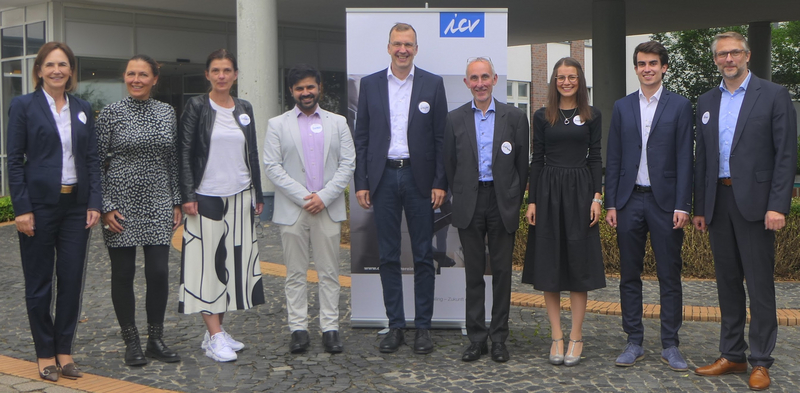
Christina Keindorf, Jury Member, Konzerncontrolling Deutsche Bahn; Ali-Rabab Qureshi, ICV Newomer Award 2021 winner; Prof. Dr. Utz Schäffer, Hochschul-Betreuer Masterand Qureshi, Direktor des Instituts für Management und Controlling der WHU - Otto Beisheim School of Management, Vallendar; Ralf Leitermann, Praxis-Betreuer Masterand Qureshi, Head of Risk and Internal Control bei thyssenkrupp Steel Europe AG; Helen Denninger, Award runner-up ; Niklas Werle, Third place Award; Prof. Dr. Marko Reimer, Hochschul-Betreuer Niklas Werle, WHU - Otto Beisheim School of Management, Vallendar
2021: Ali-Rabab Qureshi (WHU - Otto Beisheim School of Management, Vallendar)
The ICV Newcomer Award 2021 goes to Ali-Rabab Qureshi (picture) from WHU - Otto Beisheim School of Management for his master thesis "Developing an Early Warning System to Improve Proactive Risk Management in Non-Financial Companies". The university thus achieves the triple among the ICV Award winners for the next generation of controlling. Its graduates already received the Award, which has been presented by the International Association of Controllers since 2007 and sponsored by Haufe and the Haufe Academy, in 2018 and 2019.
Optimized early warning system as a matter close to the heart of the Award winner
The concept of early warning systems is very important to Ali-Rabab Qureshi, he explains the choice of topics for his master’s thesis, which was reinforced by a further challenge: “There is very little practical information on this”. The winner has eliminated this shortcoming. With his master’s thesis “Developing an Early Warning System to Improve Proactive Risk Management in Non-Financial Companies”, in addition to an exciting mix of theory and practice, he succeeded in developing an individual methodology that replaces a generally applicable procedure. Ali-Rabab Qureshi identified two strands that significantly influence the successful implementation of an early warning system: the right understanding of suitable indicators and the knowledge about them in the organization. The Award winner has therefore designed a model that answers the question of whether an organization is ready to use an early warning system.
Joy about winning the award at thyssenkrupp Steel Europe too
The Award-winning master’s thesis was supervised and submitted for the ICV Newcomer Award 2021 by Prof. Dr. Utz Schäffer, Director of the Institute for Management and Controlling at WHU – Otto Beisheim School of Management, Vallendar. “The topic of early detection is more important than ever. Ali-Rabab Qureshi developed a very good, practical solution in his master’s thesis despite the difficult framework conditions in the pandemic. My congratulations and a big thank you to Ralf Leitermann from thyssenkrupp Steel Europe for the dedicated support of the project.” Ralf Leitermann, who supervised the master student Ali-Rabab Qureshi in the company, is Head of Risk and Internal Control at thyssenkrupp Steel Europe AG. His experience of more than ten years in controlling and from the establishment of risk identification, assessment and monitoring processes at thyssenkrupp was incorporated into the Award-winning work. The Award was very moving for the experienced practitioner. This also became clear at the Award ceremony and the subsequent joint presentation on September 18 at the ICV North-East Conference in Schwerin: “I am still touched by joy and pride when I think about the fact that the thesis of my master’s student and friend Ali-Rabab Qureshi was given a 1 at the WHU – Otto Beisheim School of Management. When it also turned into 1st place at the ICV, the joy increased not only in me, but also in our company.”
“Designing modern budgeting in an agile way” achieved 2nd place
Second place for the ICV Newcomer Award 2021 goes to Helen Denninger from the Baden-Württemberg Cooperative State University (DHBW) Stuttgart. She wrote her bachelor thesis on the subject of "Agile Modern Budgeting using the Example of Magna PT B.V. & Co.KG ”. She was supervised by Prof. Dr. Roman Stoi. Helen Denninger shows how the planning process can be built up efficiently and with added value in times of digitization and growing global markets. She describes a toolbox that can be used individually for companies according to the environment and business model. The focus is on business processes, but above all on the customer and human factor instead of cost centers, cost units and cost type planning. "The intensive and vivid examination of the practical implementation of your thesis should be emphasized - a work that we as the Jury not only read with great interest, but that also gave us a lot of impetus for our own work", praised Jury Member Christina Keindorf, Corporate Controlling Deutsche Bahn, and: "I'm looking forward to your master thesis!".
3rd place for the optimal integration of shared services in controlling
"Shared Service Centers (SSCs) as an Efficiency Driver in Controlling - how to integrate SSCs in Henkel’s Finance Function?" achieved 3rd place at the ICV Newcomer Award 2021. Niklas Werle has taken on this topic, accompanied by Prof. Dr. Marko Reimer from WHU - Otto Beisheim School of Management, Vallendar. In his work, Werle shows the conditions under which shared services, which are particularly popular with large companies but “but are not always success stories”, can also provide complex controlling services, summarizes Jury Member Christina Keindorf. In addition to the "impressive number of literature sources" that Niklas Werle processed and brought together, the Jury was also impressed by the empirical use cases from Henkel, the success factors, but also the stumbling blocks of shared services in the area of controlling and its integration into the company's financial function present clearly. Christina Keindorf's tip: "An absolute recommendation to all practitioners who are thinking about the optimal structural integration and coordination of shared services in controlling!"
Thanks to the professors for maintaining the practical relevance
Jury Chairwoman Nicole Jekel, Professor at the Beuth University of Applied Sciences, Berlin, thanked all students who took part in the competition at the Award ceremony at the ICV North-East Conference in Schwerin on September 18. For the ICV as a mouthpiece and representative of the controlling practice, the intensive exchange with universities and training institutions is extremely important. With the Newcomer Award, the ICV honors the performance of young junior employees who develop innovative scientific solutions for practical tasks in controlling during their studies.
Jekel thanked the other Jury Members Solveig Reissig-Thust, Professor of Controlling at the University of Economics and Law (HWR) in Berlin, Gunnar Elbers, Partner of CTCon GmbH Düsseldorf, and Ute Schröder from the Controlling-Benchmark-Zirkel - but above all with the professors who accompany the students. "For the controlling practice it is important that during their training they not only deal with theoretical concepts and methods, but also with their practical application and the problems that arise from them". This is exactly what the professors took care of by maintaining practical relevance in their teaching and research.
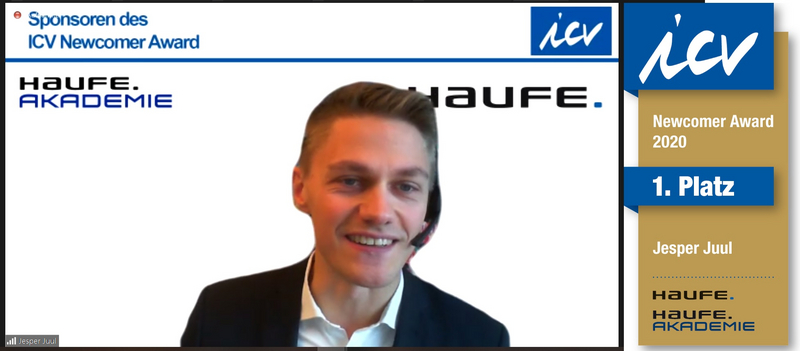
The ICV Newcomer Award 2020 is given at the #CIB2020Controlling today to Jesper Juul (picture) from the University of Economics and Law for the master thesis "The application of performance metrics in earn-out provisions", supervised by Prof. Dr. Thomas Gruber. Second place went to Christoph Beis and Andreas Friedrich from the Stockholm School of Economics for the master thesis "The Data Scientist: A Cockoo in the Management Accountant’s Nest?", supervised by Prof. Dr. Lukas Goretzki. Third place went to Manuel Mandl with his thesis "Use cases and implementation of manufacturing execution systems data in a process mining application", supervised by Matthias Regier and Prof. Dr. Gunther Friedl.
1st place for the master thesis on the topic – „Mergers & Acquisitions“
The laudation for the winner was given by the ICV Jury Chairman, Prof. Dr. Nicole Jekel:
"The Award is hot! It's about buying and selling, about mergers & acquisitions. If you want to sell a company, you are sure to ask: How much money do I get for my company? Sellers want to get as much money as possible. Buyers, on the other hand, want to get everything as cheaply as necessary at a sustainable value. Specifically, the 1st place is about earn-outs - i.e. contractual agreements - in the context of corporate transactions that make part of the purchase price dependent on the future performance of the company over a specified period of time.
What do mergers and acquisitions have to do with controlling? A lot! In particular, it is about business advice for company decisions. Quite simply, it's about making rational decisions. And little research has been done in this context do far.
In concrete terms, everything revolves around performance measurement: First and foremost, it is mostly about EBIT or EBITDA, secondly about sales, followed by sustainable company values and non-financial measures of success. We know that the selection of the performance measurement for the information content as well as for a possible manipulation can play an immense role. If we want to sell a company then - as North Germans say: "the bride will be decorated". How do I decorate a bride now? To e.g. boost sales figures, short-term actions can be initiated, which, however, could also damage the company in the long term.
The winner of the 1st place has done a real job. In addition to a thorough literature research, four hypotheses were tested using 65 interviews. Both sellers and buyers were interviewed. I am already curious to see what specific knowledge and tips we receive on all aspects of these contractual arrangements for corporate transactions.
For this reason we have awarded our first place to Mr. Jesper Juul with the master topic: "The application of performance metrics in earn-out provisions" from the University of Economics and Law, supervised by Prof. Dr. Thomas Gruber."
The award winner presented his work in the online plenum of the CIB 2020.
2nd place for the master thesis „Data Scientist: A Cockoo in the Management Accountant’s Nest?“
Jury member Ute Schröder gave the laudation for the 2nd place:
"The 2nd place goes to Christoph Beis and Andreas Friedrich from the Stockholm School of Economics for the master thesis" The Data Scientist: A Cockoo in the Management Accountant’s Nest?", supervised by Prof. Dr. Lukas Goretzki.
In the Jury, we all had a lot of fun with the title and immediately started to discuss whether the data scientist should replace the “classic management accountant” and make them superfluous. And this is exactly the question the master thesis deals with in detail. Christoph Beis and Andreas Friedrich have worked out very well that the exact tasks and role of the "data scientist" in the company is not clearly described and is often interpreted very differently. Therefore, their clear recommendation is first of all to sharpen the role definition and also to clarify the organizational connection. Otherwise a vacuum is created that can be used for internal power struggles and individual characteristics of the role.
Among other things the data scientist should recognize the business drivers, understand the data with the management and clean it up in such a way that trends can be identified and a look into the future can be ventured using predictive analytics.
Of course, there is overlap here with accounting and controlling. It is best to decide under a management team who has which tasks and how the delimitation from management can be meaningful. In any case, all of the companies surveyed, as well as the students, agree that the importance of the data scientist and the digital evaluability of data is becoming more and more important and growing rapidly. Those who build up and actively use this know-how will be able to increase their success as a company in the future. If the controllers and accountants do not acquire this knowledge or do not work in a team with the data scientists, their importance in the company as a business partner will decrease accordingly.
This know-how must therefore be promoted in all areas of the company and will be demanded from the CFO of the future."
3rd place for für "Use cases and implementation of manufacturing execution systems data in a process mining application"
The laudation for the third place winner was given by Professor Solveig Reissig-Thust:
“We gave the 3rd place to Manuel Mandl for his work on "Use cases and implementation of manufacturing execution systems data in a process mining application" (meaning use cases and implementation of data from manufacturing systems in a process mining application). The work was carried out by Mr. Matthias Regier and Prof. Dr. Gunther Friedl at the Technical University of Munich.
Digitization in controlling is an absolutely exciting and still highly topical research area. So it is not surprising that numerous theses deal with this topic. Unfortunately, many only scratch the surface and stick to general statements. As a Jury, we were particularly enthusiastic about Mr. Mandl's work. It shows very impressively a concrete application example for data-based production controlling.
In his thesis, Mr. Mandl develops an application based on production data from an international group company. With the help of the new method of process mining, up-to-date data from the production process can be obtained worldwide. The advantages for controlling are obvious - if you think of improved management, planning and control of production processes. We also found the display of the process visualization particularly interesting, as it enables the production process to be mapped in real time and thus immediately recognize deviations and inefficiencies.
The work of Mr. Mandl impresses on the one hand with the very detailed technical knowledge, on the other hand also with the very systematic and easily comprehensible presentation. It thus makes an important contribution to research in the field of production data analysis. At the same time, it is interesting for all practitioners who are interested in increasing the efficiency and transparency of their production processes."
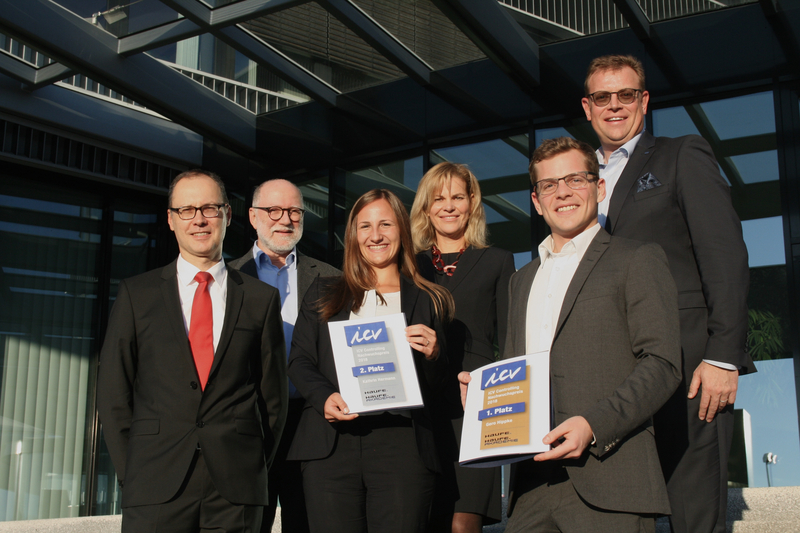
Introducing the award ceremony of the ICV Controlling Newcomer Award, which was presented for the first time this year as part of the CCS, Walter Schmidt gives the laudatory speech. He is Executive Adviser to the ICV Executive Board and Member of the Jury for the Newcomer Award endowed with 4,050 euros, sponsored by Haufe Verlag and Haufe Akademie.
Fourteen final papers from all countries in the D-A-CH region had been submitted for the 2018 Controlling Newcomer Award. In terms of content, they have covered a wide range of topics – from classical controlling instruments such as cost accounting and budgeting to risk management and sustainability controlling and to role models in controlling. The submitting institutions also cover the entire university spectrum. “That speaks for a broad acceptance of the Award in the university landscape,” concludes Walter Schmidt, who also once again referred to the criteria for the Award. This includes practical relevance, direct implementation, but also the degree of innovation of the presented concept. However, the conformity of the work or its critical discussion with the perspective of the ICV is always essential.
Walter Schmidt finally announced the following candidates as finalists:
3rd place: Dominik Große from the Otto Friedrich University Bamberg. Title of his master thesis: “Stochastic Scenario Planning as a Risk-oriented Planning Method of Controlling – Potentials and Challenges”. He was supervised by Prof. Dr. Dr. (habil.) Wolfgang Becker. Dominik Große has put the focus on a planning method that can specifically take into account the increasing uncertainty. Stochastic scenario planning integrates statistically assessed risks into the planning process and illustrates the future through a risk-adjusted development corridor. Walter Schmidt pays tribute to Große’s work with a quotation from the Greek politician and general Pericles: “The key is not to predict the future, but to prepare for it.” – “and your master’s thesis makes a valuable contribution!” Schmidt praises the third place winner.
The Jury colleague of Walter Schmidt, Ute Schröder from the Controlling-Benchmark-Zirkeln, presented then the 2nd place winner and the winner:
2nd place: Kathrin Hermann from the Baden-Wuerttemberg Cooperative State University Stuttgart. Title of her bachelor thesis: “Concept of the Application of Digitalization Tools in the Finance Function – using the example of Robotic Process Automation at MANN + HUMMEL Group”. Kathrin Hermann was supervised by Prof. Dr. Roman Stoi. “Robotic Process Automation” – RPA for short – will find its way into all financial functions, according to the tenor of the work, in which she does not only analyze the benefits and possibilities of this development, but also deals with the question of which obstacles must be overcome and to what extent the role model of the controller has to change towards becoming an IT architect and data scientist. “Kathrin Hermann is not only dealing with a highly topical and exciting topic. She also dares to take the first step into the practice. That’s what the ICV is all about: theory and practice, bringing knowledge and know-how together. Therefore, we congratulate you especially on your bachelor thesis and look forward to your master thesis”, Schröder tells the runner-up.
The winner of the ICV Controlling Newcomer Award 2018 is Gero Hippke from the WHU – Otto Beisheim School of Management. He was supervised by Prof. Dr. Utz Schäffer. The title of his thesis is “Business Intelligence at Bayer: Improving Decision Making in Management and Strengthening Controlling”. Ute Schröder praises that Hippke has managed to cover the core topics and management-relevant areas in controlling: providing information and forecasting with the aim of making even better decisions. “The topic is up-to-date, interesting and currently a hot topic in many companies”, summarizes Ute Schröder. The award winner presented the process of the automated business intelligence solution using the example of Bayer AG. The principles of such an “agile BI” go beyond the field of software with the aim of achieving overall operational and organizational agility in order to be able to act flexibly, efficiently and quickly in the market. As Ute Schröder points out: “The challenges and important steps involved in the introduction of agile BI systems and tools were well illustrated by Mr. Hippke, from consolidation to IT systems and cultural management”.
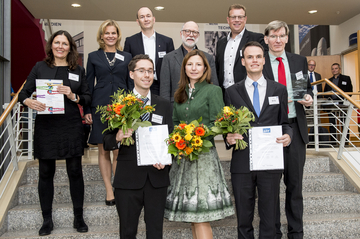
The Controlling Newcomer Award of the International Association of Controllers (ICV) goes this year to graduates of the Beuth University of Applied Sciences Berlin, the University of Applied Sciences Graz and the Technical University of Kaiserslautern. Doreen Semper from the Beuth University of Applied Sciences Berlin won the first prize for the thesis "Employee management in the Customer Service Center on the example of an inbound project".
The award ceremony took place on November 18 at the conference "17th Controlling Innovation & Inspiration Berlin - CIB 2017". First place went to Doreen Semper from the Beuth University of Applied Sciences Berlin for the thesis "Employee management in the Customer Service Center illustrated on the example of an inbound project", supervised by Prof. Dr. Hans Schmitz. Gerald Weißensteiner from the University of Applied Sciences Graz, Campus 02, majoring in Accounting and Controlling, won second place with his bachelor thesis "Selection of possible KPIs and conception of a key figure cockpit using the example of WO & WO Sonnenlichtdesign GmbH & Co. KG", supervised by Alexandra Knefz-Reichmann and reviewed by Prof. Dr. Michl. Third place went to Fabio Britz from the Technical University of Kaiserslautern for his master thesis "Transfer pricing between management and taxation: clarification of target conflicts based on a case study". The work was supervised by Florian Beham and Prof. Dr. Volker Lingau.
"Succeeded outstanding in depicting the value chain and defining process indicators"
With her thesis, the award winner excellently succeeded in depicting the value chain in a company and in defining process indicators, said Jury Member Ute Schröder from the Controlling-Benchmark-Zirkel in her laudatory speech. The juror justified the Jury's decision with the current challenges posed by digitization: "The digital transformation is partly shaking companies to their very foundations - and tasks and the role of the controller are affected. Digitization will also radically change controlling. In the Jury we agreed that in the future it will be more and more important to know more and more about the company processes and the value drivers in the company through the data analysis. For starters this means mastering and understanding Big Data with the current data. That's why we've given the first place to Doreen Semper."
She commented on the award-winning thesis: "The approach made a very positive impression on us. Both external data and benchmarks were used as well as each process step was recorded cleanly and intensively matched internally with the parties involved through queries. Furthermore, there was a very close communication between the IT department and controlling. Here, a young junior controller has actively dealt with the company processes and presented them in a practically transparent way." So it was possible for the company to set up a management system based on a monetary incentive system as a logical consequence. "We discussed a lot in the Jury as to whether the employees were included enough in finding the right key figures and the compensation linked to the performance. We found this point very important", the juror continued. "In particular we evaluated positively and sustainably the evaluation after three months, when the methodical weaknesses and the satisfaction with the new incentive system were queried once again. As a result of this evaluation, corrections were also made in the company."
Key Performance Indicators & Transfer Pricing
The thesis of the 2nd prize winner (Gerald Weißensteiner, FH Graz University of Applied Sciences, " Selection of possible KPIs and conception of a key figure cockpit using the example of WO & WO Sonnenlichtdesign GmbH & Co. KG") is concerned with the development of key figures that should be used as key performance indicators (KPI's). Using the example of a real company and, according to the Jury, "well comprehensible", the author asked, which selection steps make sense, which evaluation criteria are to be used, which data are required, which advantages and disadvantages the selected key figures have. Jury Member Dr. Walter Schmidt: "Key figures are intended to help controllers identify potentials for improvement and to proactively integrate them into the management process. This is the position of the International Association of Controllers (ICV)."
"Management is something other than taxation!", explained juror Gerhard Radinger in his laudation for the 3rd prize winner. "One could sum up the work of Fabio Britz to this short sentence. The purpose of so-called inter-company offsets is to avoid fiscal sanctions such as double taxation or penalties, but also to optimize the tax burden on multinational corporations." In his excellent master thesis, "Transfer pricing between management and taxation: clarification of target conflicts based on a case study", Fabio Britz theoretically examined the "difficult to overcome conflicting goals between management and taxation" and also "outnumbered" them with a case study. Radinger continues: "The work combines a topic exciting for the controller with a current socio-political topic in an outstanding way."
Scientific foundation, practical relevance, feasibility, degree of innovation
To the Jury of the Newcomer Award headed by Prof. Dr. Nicole Jekel belonged this year Christina Keindorf, Deutsche Bahn AG, Gerhard Radinger, Trainer CA Controller Akademie, Dr. Ing. Walter Schmidt, Executive Advisor of the ICV Board, and Ute Schröder, Controlling-Benchmark-Zirkel. The jury met several times and discussed extremely critically, reports the Jury Chairman Prof. Jekel. 18 final theses were submitted from all countries in the DACH region. These covered the entire range from classical controlling instruments such as cost accounting and budgeting to risk management and sustainability controlling to the role models in controlling. The submitting institutions also covered the entire university spectrum, which speaks for a high acceptance of the Newcomer Award in the university landscape.
In its decision, the Jury had set the following criteria: In addition to the scientific foundation, the practical relevance of the issue, the direct applicability of the concepts developed and the degree of innovation of the theses were important. From 2018, the conformity of the thesis with the controlling perspective of the ICV or its critical discussion with it will be evaluated as a further criterion.
The ICV Controlling Newcomer Award is endowed with more than 4,000 EUR and is sponsored by Haufe Verlag and the Haufe Akademie.
Combining finance and sustainability in the reporting, taking risks into consideration during the company planning, clarifying the self-understanding of controllers as "management partners" - the winning works of this year's ICV Controlling Newcomer Award were diverse. At the WISTA Technology Park Berlin-Adlershof, the International Association of Controllers (ICV) handed over this year's award for the best degree thesis on controlling on Saturday, November 12.
The first award received Selina Rogers, Baden-Württemberg Cooperative State University Stuttgart, for the thesis „Implementation of integrated reporting on the example of Adidas”, the second award went to Fynn Kohn, FH Kiel and the third to Dominic Danial Djannesari, WHU – Otto Beisheim School of Management, Vallendar.
"The winner has picked up the most important topic"
The first award winner, Selina Rogers, wrote her bachelor thesis on the introduction of integrated reporting using the example of Adidas. The ICV Jury, chaired by Prof. Dr. Ute Vanini, University of Applied Sciences Kiel, justified the decision with the "convincingly clear problem formulation and definition" as well as with a "very structured approach to problem solving". The work picked up a topic most relevant to practice and research, and the analysis was based on a comprehensive international literature evaluation. In addition, concrete solutions for integrated reporting were developed for the company and documented in a comprehensible manner: "The ideas for integration of reporting can be partly implemented also in other companies”, said Professor Dr. Ute Vanini.
"Integrated reporting" strives to link the financial and sustainability reporting of companies. This way a holistic corporate image is to be presented. The effect extends far beyond mere reporting: also internally companies should be managed with the integrated variables adjustments of the target and controlling system. Management needs to get an idea of the environment and impact of its actions.
Risk management & controlling – controller as a “business partner”
The second award winner, Fynn Kohn, from Kiel University of Applied Sciences, entitled his master thesis "Integration of risk management and controlling - development of scenarios and simulations to include risk aspects in the business planning of the ACO Haustechnik Group". According to the ICV Jury, the thesis exemplarily shows "structured and application-oriented approaches and problems of using complex Monte Carlo simulations for the integration of business planning and risk management in a medium-sized company".
The third award winner, Dominic Danial Djannesari from the WHU - Otto Beisheim School of Management, wrote his bachelor thesis under the title "Business partnering in practice - the relationship between controllers' roles and reporting practices". This winner also took up a very relevant topic, the Jury chairman explained. The empirical investigation of how controllers understand their own role affects company’s reporting, strengthens awareness of the topic at least in the company and provides a starting point for a more conscious idea of the controller role.
Record participation 2016
More than ever before, the candidates’ field for the ICV Newcomer Award 2016 was extremely wide: 23 papers were submitted from the entire DACH region, from universities, as well as universities of applied sciences and universities of applied sciences. The broad range of topics covered the entire controlling field from classic cost controlling and budgeting, through risk management and sustainability controlling to role models in controlling.
Since 2005, the ICV has presented the "Controlling Newcomer Award" every year at the "Controlling Innovation Berlin" (CIB) conference. The award worth over 4,000 EUR is sponsored by Haufe-Verlag and Haufe-Akademie. The CIB is organized by the ICV regional networks in the east Germany: Berlin-Brandenburg, Saxony, Thuringia and Weser-Harz. Traditionally, the newly award winner presents their work in front of the CIB plenum.
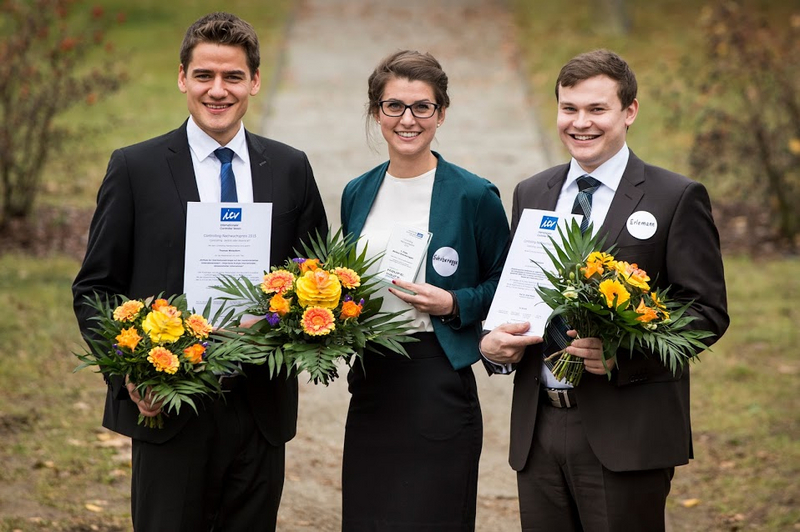
The International Controller Association (ICV) gave the Controlling Newcomer Award 2015 on Saturday (November 7) in Berlin. The first award went to Dipl.-Ing. Bettina Schoberegger from the FH Joanneum in Graz. Second place was given twice, to: Thomas Weiszdorn (Friedrich-Alexander-Universität Nürnberg) and Daniel Erlemann (University Niederrhein). The award ceremony took place during the ICV Conference Controlling Innovation Berlin - CIB 2015 in Berlin-Adlershof.
The winning work of Bettina Schoberegger, "Goal conflicts in Working Capital Management - optimization of internal and external logistics processes through improved interaction", has been cared for in Graz by Prof. Dr. Martin Tschandl. The work of Thomas Weiszdorn, "Influence of the distribution strategy to the market-oriented enterprise value - empirical analysis of international company listed on the stock", supervised in Nürnberg Professor Thomas M. Fischer. The master thesis of Daniel Erlemann, "Development of method for adequate consideration of the energy costs in the context of energy management system according to ISO 50001: 2011 in small and medium sized enterprises on the example of Frankenberg GmbH", supervised in Krefeld by Prof. Ulrich Nissen.
The winners were chosen by a Jury headed by Prof. Dr. Ute Vanini, University Kiel, Faculty of Economics. To the jury belong Gerhard Radinger, Trainer CA Controller Academie in Wörthsee by München, Dr. Hendrik Vater, CFO DHL Supply Chain Southern Europe, CFO Life Science & Healthcare Logistics DHL Supply Chain EMEA, Member of the ICV Board of Trustees, and Ulrich Wilke, Berlin.
Master thesis for optimization of the Working Capital in the company
In her master thesis, the young laureate was engaged in the optimization of Working Capital of enterprises. As an isolated optimization of Working Capital in various functional areas can lead to negative effects in the supply chain, optimizations must be coordinated and mutual impacts on the supply chain must be considered. It can be achieved in Working Capital Management through an approach of holistic and coordinated processes in the entire supply chain. For this purpose it is necessary to identify and analyze the factors influencing the Working Capital and, in particular, their interactions. In her speech the jury chairman, Prof. Dr. Ute Vanini, emphasized that the winning thesis dealt with "a current and very relevant issue, since a reduced capital commitment contributes significantly to the profitability and liquidity of an enterprise."
In his master thesis Thomas Weiszdorn examined, according to the Jury for the first time, the influence of the distribution strategy to the market-oriented enterprise value based on an international sample of numerous companies.The empirical analysis could reveal the positive impact of selected distribution strategies in the short and long-term sales development and demonstrate the (over) return on development, but not to the capital market performance.
At the master thesis of Daniel Erlemann the Jury recognized “the comprehensive and structural work on the problem close to praxis”. The 2nd prize winner developed concrete and directly applicable solutions for improved including of the energy costs in the contribution margin accounting of a company. “So he succeeded in the theory – praxis – transfer“.
Developing innovative solutions for the praxis during the studies
With the Controlling Newcomer Award the ICV promotes young controllers who during their studies develop innovative economical solutions for practical problems of controlling. Professors gain recognition as well because they care for praxis in their teaching and research and support their students. "For the controller practice it is very important that students during their studies work not only with theoretical concepts and methods, but also with the practical use” – says Prof. Vanini.
Controlling Newcomer Award is sponsored with 4,000 EUR. The award goes in 2/3 to the graduates and in 1/3 to the promotors of the thesis. The award given every year since 2005 is sponsored by Haufe Verlag and Haufe Academy and given during the conference Controlling Innovation Berlin - CIB .
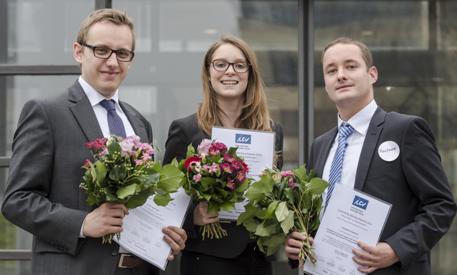
2014 winners of the Controlling Newcomer Award (left to right): Simon Redlinger, University of Aalen, 1st place; Claudia Lisa Weißmann, Technical University of Darmstadt, 3rd place; Christopher Kaufmann, University of Rosenheim, 2nd place.
Three university students together with their advising professors were honoured at the “14th Controlling Innovation Berlin – CIB 2014” professional conference held on 15 November. The 1st place winner, Simon Redlinger, presented his work in the CIB plenary session to an audience of around 100 controlling experts. All three of the masters theses that were honoured at this year’s event deal with the interplay between controlling and technology, and were prepared either in cooperation between the business and technology departments of the respective university or at a technical university itself.
The Controlling Newcomer Award, which includes a prize of EUR 4,000, was sponsored again this year by the Haufe Group.
1st place:
Simon Redlinger (University of Aalen, academic advisers: Prof Axel Löffler and Prof Robert Rieg) dealt with a highly relevant issue for practitioners in his masters thesis entitled “Calculating the profitability of wind energy – A system-dynamic analysis,” explained the jury chair, Prof Ute Vanini from the Kiel University of Applied Sciences, in her laudatory address. When doing so, according to Prof Vanini, he utilised an extremely challenging method to model the wide variety of interrelationships that arise in the generation of wind energy. In addition, different scenarios were simulated, parameters in sensitivity analyses were varied, and the effects of these changes in parameters on the economic viability of wind energy installations were calculated. The award winner therefore demonstrated that complex modelling and simulation methods can also be applied directly in a practical environment and provide therein a considerable value-add in the analysis of the economic viability of wind energy installations.
2nd place:
The 2nd place award winner, Christopher Kaufmann from the University of Rosenheim, supported by academic advisers Prof Robert Ott and Prof Oliver Kramer, was honoured for his masters thesis entitled Determining causation-appropriate manufacturing hourly rates to correctly value inventories in accordance with BilMoG (the German Accounting Modernisation Act). The jury praised the comprehensive and structured treatment of an issue that is relevant in practice. It stated that concrete and immediately usable solutions to improve the cause-and-effect relationship in manufacturing hourly rates were developed for an actual company. This meant that the award winner achieved “outstanding success at transferring theory into practice.”
3rd place:
The 3rd place winner in 2014 is Claudia Lisa Weißmann from the Technical University of Darmstadt, supported by academic advisers Prof Reiner Quick and Prof Anette von Ahsen. Her masters thesis was entitled Analysing the usefulness of life cycle costing and life cycle assessment for efficiency houses. The jury praised the work of the award winner, saying she addressed a relevant issue, analysed it using a scientific method (life cycle costing) and presented her approach and results in an understandable manner. The work was especially noteworthy because of its comprehensive review of the corresponding literature.
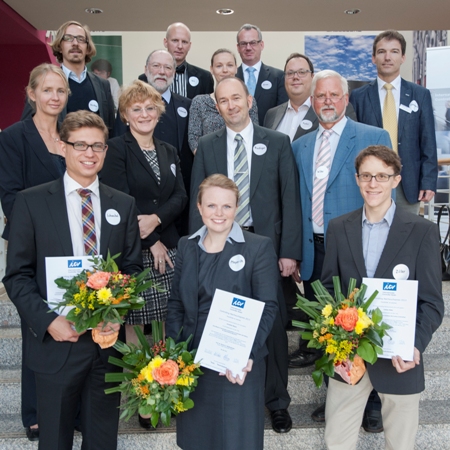
The International Controllers’ Association (ICV) has chosen the winners for the Controlling – Newcomer Award 2013. The 1st prize went to Christopher Scheubel from TU Munich, the 2nd prize to Tobias Zöller from the Technical University of Darmstadt and the 3rd prize to Christine Meyer from the Justus-Liebig-University Gießen. The award ceremony took place in Berlin on September 21, during the specialist conference Controlling Innovation Berlin – CIB 2013.
The 1st prize was awarded for the thesis by Christopher Scheubel from the Technical University of Munich. The paper entitled “Corporate Social Responsibility and Financial Performance in the Automotive Industry – Do Social and Environmental Outperformers also outpace financially?” was supervised by Prof. Dr. Gunther Friedl and Dr. Sabine Pallas and investigates the question, whether corporate social responsibility and sustainability measures are financially feasible for a company. The jury considered it particularly worthy of a prize that the paper explores a relevant and current topic: the implications of Corporate Social Responsibility (CSR) for Controlling. It made a “significant contribution - if CSR activities have a positive impact on the financial success of a company, they must also be steered and therefore controlled”, as the Head of the Jury, Prof. Dr. Ute Vanini from Kiel University of Applied Sciences notes in her laudatory speech. Apart from its conciseness, the paper captivates with its exceptionally well-founded study design and its academically clean and ambitious implementation. The author successfully revised a demanding subject in a clear and understandable manner and derived implications for management.
The 2nd prize went to Tobias Zöller from the Technical University Darmstadt. His paper “A Critical Analysis of Approaches to Carbon Controlling” was supervised by Prof. Dr. rer. pol. Reiner Quick and Prof. Dr. Anette von Ahsen. This bachelor thesis was selected by the jury, because carbon controlling is still a relatively young subject and a current and important topic for the controller community. According to the jury, Zöller gives a structured and critical overview of the various approaches to carbon controlling on the basis of a comprehensive literature review.
The ICV awarded the 3rd prize to Christine Meyer from the Justus-Liebig-University Gießen. Her master thesis, which was supervised by Prof. Dr. Barbara E. Weißenberger addresses the issue “The effects of information presentation on the base-rate fallacy: An experimental approach”. The author researches the error in judgement of limited probabilities of occurrence of certain events. Her examination is based on experiments on the way in which different reporting formats in the form of texts, graphics and tables impact on the occurrence of error in judgement. The Head of the jury, Prof. Vanini, emphasises that “valuable implications for the practice of controlling in the design of reports and the presentation of information” can be derived from this paper. “Apart from the importance of its content, the academic quality of this paper is particularly worthy of a prize”, states the Head of the jury.
Developing controlling in practice
The ICV awarded the Controlling – Newcomer Award for the ninght time in the framework of the specialist conference "Controlling Innovation Berlin - CIB 2013". As the leading European association for controlling professionals, the ICV spreads the body of thought of controlling and refines it for practical application. “This requires new ideas to be incorporated and cooperation with universities and other educational facilities is vital”, Prof. Dr. Ute Vanini explains the fundamental objectives behind the Controlling - Newcomer Award. “With this prize, we want to recognise the achievements of young talent in this field, people who already develop innovative academic solutions for practical issues in controlling during their studies. Their professors and lecturers equally deserve recognition, as they maintain the practical relevance of their teaching and research and support their students as a sparring partner and mentor. It is paramount for the practice of controlling that student not only learn about theoretical concepts and methods, but that they examine their practical application throughout their studies.“
The eleven dissertations submitted comprised a colourful variety of classical and new controlling topics. The jury, which was lead by Prof. Dr. Ute Vanini and included Gerhard Radinger, trainer at the Controller Academy, Ulrich Wilke and Dr. Hendrik Vater, CFO DHL Supply Chain Southern Europe, CFO Life Science & Healthcare Logistics DHL Supply Chain EMEA, member of the Board of Trustees of the ICV, was delighted with the increasing internationalisation. After all, the academic development of controlling can only take place in line with international standards. The jury based its decision on the four criteria of academic foundation, practical applicability, feasibility and degree of innovation.
The Controlling – Newcomer Award is sponsored by the publishing house Haufe Verlag and the Haufe Academy and carries a total award of 4,050 Euros. In addition to the cash prizes, the prize winners received a free annual membership of the ICV, as well as a free annual subscription of the Controller Magazin, the most successful controlling magazine in Germany with the highest circulation.
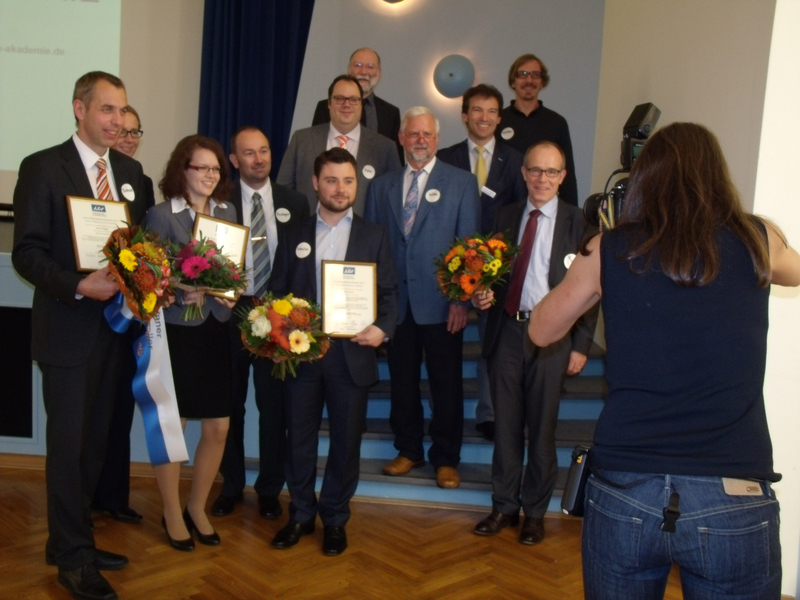
The 2012 Controlling Newcomer Award goes to Sabine Rossegger, Joanneum Kapfenberg University of Applied Sciences, for her dissertation entitled Modern budgeting – Adequate IT support for implementation in practice. 2nd place was awarded to Robert Schulze from the University of Business and Law in Berlin for his masters thesis Designing principles and success factors for the conception of management performance dashboards for sales companies – A case study on Biotronik. 3rd place went to Slavomira Podluckà from the West Coast University of Applied Sciences in Schleswig-Holstein for her bachelors thesis Framing in reporting. The Controlling Newcomer Award of the International Controller Association (ICV) was awarded for the eighth time at the “Controlling Innovation Berlin – CIB 2012” professional conference on 27 October.
The jury, under the leadership of Prof Ute Vanini (Vice Dean and Professor of Controlling at the Kiel University of Applied Sciences), and including Hendrik Vater (DHL), Ulrich Wilke (retired controller) and Gerhard Radinger (Controller Akademie CA), made its decision among twelve submitted theses from universities in three countries (Austria, Germany, and Switzerland). The key criteria for the decision were the work’s academic foundation, the practical relevance of the issue being analysed, the direct feasibility of the recommendations that are developed, and how innovative the thesis actually is.
2012 award winners from Kapfenberg, Berlin and Heide (Schleswig-Holstein)
The 1st place award was given to the dissertation of Sabine Rossegger from the Joanneum Kapfenberg University of Applied Sciences in Austria. The subject of the award-winning work in 2012, under the academic supervision of Prof Martin Tschandl, was: Modern budgeting – Adequate IT support for implementation in practice. The jury chair, Prof Vanini, spoke of a “very clear winner.” “I have seldom experienced such unity in a jury’s opinion, which indicates the outstanding quality of all aspects of the work.”
“The thesis deals with an extremely relevant and complex practical issue because planning and budgeting processes require significant time commitments in companies,” explained the jury chair. “Building on the International Controller Association’s concept of 'modern budgeting,' Ms Rossegger argued that a budget process that is both high-quality and efficient can only be achieved with corresponding IT support. She went on to develop a proposal to address the issue, including a method to select a software application.” When doing so, she was highly successful at achieving “a balance between deriving an outcome in an academically sound manner while providing a clear representation in a model.” The approach developed in the award-winning work “can serve as a basic model for IT support and be modified and simplified by companies to fit their own specific needs,” stated the conclusion.
2nd place was awarded to Robert Schulze from the University for Business and Law in Berlin. In his masters thesis entitled Designing principles and success factors for the conception of management performance dashboards for sales companies – A case study on Biotronik, the author “dealt with a relevant issue in an easily understandable and structured manner, and presented the analysis clearly, according to the jury. The jury went on to say that the award winner developed a specific, company-related solution for a performance measurement dashboard, containing an approach and an underlying dashboard structure which, however, can easily be transferred to other companies.
3rd place was awarded to Slavomira Podluckà from the West Coast University in Schleswig Holstein. This was the first time ever that the jury has included a bachelors thesis among the award winners, in this case a work on Framing in reporting. “Framing” is the substantive, structural and linguistic design of reports and the resulting desired and undesired effects on the perceptions and decisions of the report readers. The ICV jury described her work by saying that “Ms Podlucká investigates in her thesis a very relevant issue from the practice of controlling, albeit one that has received limited attention to date. She does this in a very clear manner using numerous examples and also derives several recommendations for action.”
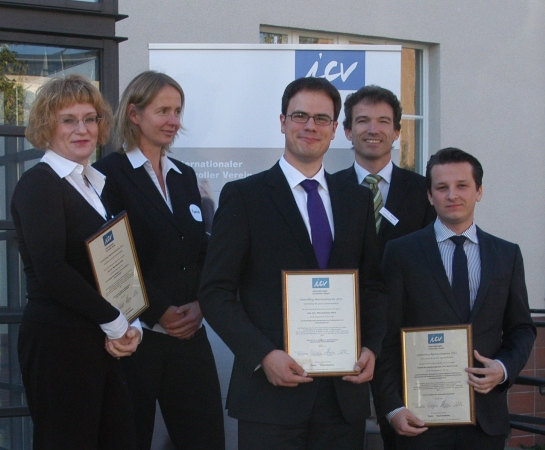
(Picture: Following the award ceremony for the 2011 Controlling Newcomer Award in Berlin, from left to right: Prof Barbara E. Weißenberger, Justus-Liebig University in Gießen; Prof Ute Vanini, Kiel University of Applied Sciences, chair of the ICV jury; Sebastian Göbel, 2nd place, Justus-Liebig University in Gießen; Günther Lehmann, Haufe-Verlag; Karl Krziwon, 1st place, University of Rosenheim)
1st place, with a prize of EUR 2,500, was awarded to Karl Krziwon from the University of Rosenheim. His work, which was created in cooperation with BMW, is entitled Development of a model to systematically compile prices for models to calculate the cost structure of vehicle components. The ICV jury praised the work in its decision, saying it developed a demanding but practical model to provide decision support when selecting data for calculation models in the automotive industry.
The 2nd place award of EUR 1,500 went to Sebastian Göbel from the Justus-Liebig University in Gießen for his work entitled Controlling-Appropriate design of incentive systems in crisis situations. According to the ICV jury, the author addressed a very relevant issue in a structured and comprehensive manner, and while doing so, derived general recommendations for the design of incentive systems that are appropriate for crisis situations.
The International Controller Association (ICV) uses the Controlling Newcomer Award, which has been awarded annually since 2005, to promote the next generation of controllers and to make innovative and practical ideas accessible to a broad audience of controllers. Two-thirds of the prize money is given to the award winner, with the remaining third going to the academic advisor at the university.
The Controlling Innovation Berlin (CIB) conference is a professional event organised by the regional ICV work groups of Berlin, Berlin-Brandenburg, Franconia, Mecklenburg-Vorpommern, Saxony, Thuringia and Weser-Harz. Every year, controlling practitioners, managers, advisers, academics and students meet for the CIB at WISTA Management GmbH in Berlin-Adlershof. The motto of the 2011 CIB was “Controlling is communication (too),” a slogan underscoring the ambition of the event’s host, the International Controller Association (ICV), to strive for sustainable controlling. This approach understands controlling as being a management process that can have an impact only if controllers and managers work together.
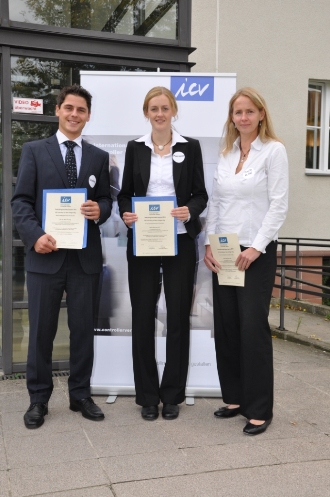
The 2010 Controlling Newcomer Award winner Martin Petschnig (3rd place) and Kathrin Moormann (1st place) with her professor Ute Vanini.
The 2010 Controlling Newcomer Awards of the International Controller Association (ICV) were awarded to the Kiel University of Applied Sciences, the University of Regensburg and the Joanneum Kapfenberg University of Applied Sciences in Austria.
The winners of the Controlling Newcomer Awards were honoured at the 10th “Controlling Innovation Berlin CIB 2010” professional conference on Sunday (18 September). Kathrin Moormann from the Kiel University of Applied Sciences presented her thesis on the Systematisation of risk identification, which was awarded 1st place, to the plenary session of the conference.
The crucial factors for the jury’s decision were whether the thesis developed specific, practice-oriented and innovative solutions and recommendations for companies, which should be highly relevant for the actual practice of the controlling profession. This year’s jury included Prof Ute Vanini (chair), Klaus Eiselmayer, Ulrich Wilke and Hendrik Vater.
The 2010 Controlling Newcomer Award winners are:
1st place, with a prize of EUR 2,250: Kathrin Moormann, Kiel University of Applied Sciences, for her work entitled Systematisation of risk identification in the Dräger Group – Development of a risk catalogue and approaches for improvement;
2nd place, with a prize of EUR 1,200: Bettina Karl, University of Regensburg, for her work entitled From an input to an output orientation using the Event department of HypoVereinsbank as an example;
3rd place, with a prize of EUR 600: Martin Petschnig, Joanneum Kapfenberg University of Applied Sciences, for his work entitled Controlling of customer integration – Creation of a controlling concept in the framework of mass customization and open innovation.
The aim of the ICV’s Controlling Newcomer Award, which has been bestowed now for the 6th time, is to promote the next generation of controllers and to make innovative ideas accessible to a broad audience of controllers. Two-thirds of the prize money sponsored by Haufe Verlag (Haufe Publishing Company) is paid to the authors, with the remaining one third distributed to the academic advisor (either the department or the professor). A one-year membership in the International Controller Association, which includes a subscription to the Controller Magazine, is included with the award.
The 2010 Controlling Newcomer Awards of the International Controller Association (ICV) were awarded to the Kiel University of Applied Sciences, the University of Regensburg and the Joanneum Kapfenberg University of Applied Sciences in Austria.
The winners of the Controlling Newcomer Awards were honoured at the 10th “Controlling Innovation Berlin CIB 2010” professional conference on Sunday (18 September). Kathrin Moormann from the Kiel University of Applied Sciences presented her thesis on the Systematisation of risk identification, which was awarded 1st place, to the plenary session of the conference.
The crucial factors for the jury’s decision were whether the thesis developed specific, practice-oriented and innovative solutions and recommendations for companies, which should be highly relevant for the actual practice of the controlling profession. This year’s jury included Prof Ute Vanini (chair), Klaus Eiselmayer, Ulrich Wilke and Hendrik Vater.
The 2010 Controlling Newcomer Award winners are:
1st place, with a prize of EUR 2,250: Kathrin Moormann, Kiel University of Applied Sciences, for her work entitled Systematisation of risk identification in the Dräger Group – Development of a risk catalogue and approaches for improvement;
2nd place, with a prize of EUR 1,200: Bettina Karl, University of Regensburg, for her work entitled From an input to an output orientation using the Event department of HypoVereinsbank;
3rd place, with a prize of EUR 600: Martin Petschnig, Joanneum Kapfenberg University of Applied Sciences, for his work entitled Controlling of customer integration – Creation of a controlling concept in the framework of mass customization and open innovation.
The aim of the ICV’s Controlling Newcomer Award, which has been bestowed now for the 6th time, is to promote the next generation of controllers and to make innovative ideas accessible to a broad audience of controllers. Two-thirds of the prize money sponsored by Haufe Verlag (Haufe Publishing Company) is paid to the authors, with the remaining one third distributed to the academic advisor (either the department or the professor). A one-year membership in the International Controller Association, which includes a subscription to the Controller Magazine, is included with the award.
Green Controlling Award
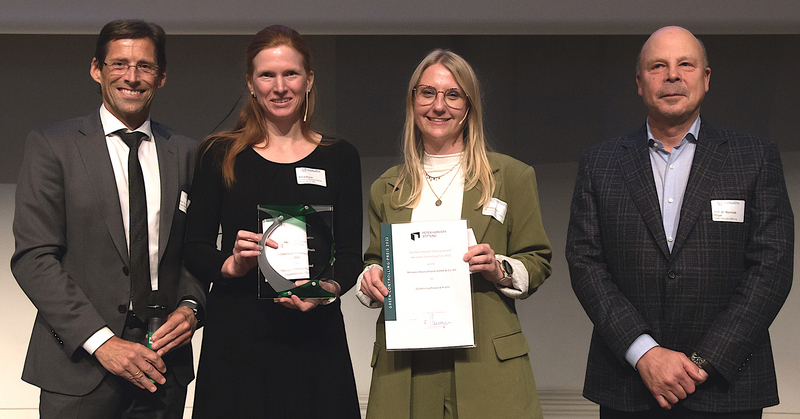
Stuttgart/Wörthsee, September 20, 2022. The path to CO2 neutrality begins in the area of finance. With the winning project "Combining Planet & Profit" of the Green Controlling Award 2022, Heraeus Precious Metals shows an exemplary transformation path. It begins in controlling, extends to the entire business area and later, according to the goal, to the entire industry. "This holistic solution is a model solution in many respects," praised the project Prof. Dr. Heimo Losbichler, ICV Chairman, at the Award ceremony on September 20 in Stuttgart. The Green Controlling Award, worth 10,000 euros, is presented annually by the Péter Horváth Foundation in cooperation with the International Association of Controllers.
The Heraeus Group is one of the world's leading family-owned technology groups. The roots of the company go back to a family pharmacy founded in 1660. Today, the group includes companies from the fields of environment, electronics, health and industrial applications. The now award-winning Heraeus Precious Metals business unit is a global leader in precious metals services and products as well as in the trading of industrially used precious metals. All activities in the precious metal cycle, from trading to precious metal production and recycling, are bundled in this business area.
The goal is firmly in sight: “We at Heraeus Precious Metals have a concrete plan on how we will make our contribution to protecting our planet. Our products actively contribute to reducing emissions. At the same time, we also want to make a contribution to our planet with the way we manufacture our products. Our goals and ambitions go far beyond the requirements of the legislature,” confirm Maria Busch and Christin Sauer. The comprehensive project is being pushed forward under her leadership. Maria Busch is Head of Global Controlling, Reporting & Projects; Christin Sauer is Global Business Controller of Heraeus Precious Metals at the Heraeus Holding headquarters in Hanau, Hesse. The metal industry and its handling of precious resources are to be transformed, according to their claim. The way there begins in your own company with consistent measurement and tracking of the ambitious goals by controlling.
Since 2033 fossil fuels will be taboo
Starting from the base year 2019, by 2025 electricity is to be obtained entirely from renewable energy sources worldwide and the efficiency of the energy used is to be increased by 20 percent - also by identifying and avoiding unnecessary consumption. In addition, Heraeus Precious Metals is aiming for completely CO2-neutral production by 2025. By 2033, the Heraeus Precious Metals division should be free of the use of fossil fuels.
This defines the starting line and the finish line. In contrast to many other companies that have also started their journey towards a CO2-free footprint, the starting point for the transformation lies in the area of finance. This is where the forward-looking project is set up and the foundation stone is laid for all further derivation of measures. Management and cost center reports are created on the basis of the current CO2 footprint, CO2 targets are set down in management scorecards and the CO2 footprint is taken into account for upcoming investment decisions and budget processes. In the second stage of development, this process is rolled out throughout the organization with goal setting agreements, review meetings and production inspections, until finally, in stage 3, the “green corporate transformation” is achieved. The transformation goes hand in hand with the revision of the previous corporate strategy - the existing business model is put to the test. The suppliers are also involved in the development. Heraeus Precious Metals has no less goal than to set new standards for its industrial sector.
Four pillars provide orientation along the project path
For the realization, Heraeus Precious Metals has identified four supporting pillars whose content stability must be ensured in order to achieve the project goal. Under the motto "Shaping the way we work to combine Planet and Profit", the areas of transparency & roadmap, cultural transformation, carbon-reducing activities as well as business models & customers are always in focus. Controllers can make a significant contribution to success with investment decisions, scientifically based objectives and the permanent evaluation of the product portfolio with regard to the CO2 footprint. Relevant data is made available throughout the organization through QLIK reports, down to the cost center level. The biggest CO2 drivers are identified in the budgeting process and the reduction of carbon emissions is transferred to all locations and business areas in line with the EBT targets as part of the management target agreements.
Three central points were decisive for the decision to choose Heraeus Precious Metals as the winner of the Green Controlling Award 2022, says Prof. Dr. Heimo Losbichler. On the one hand, it is noteworthy that the project was not a reaction to the requirements of the capital market, but arose "from own conviction". In addition, the controlling team offers a holistic solution - from strategy to operative reporting, from the service creation process to the products. The entire value chain up to Scope 3 was designed and a comprehensive application throughout the group ensured. It is impressive that the focus is not only on CO2, but on GHG. "The project also shows the ideal case of modern controlling: the solution creates transparency, based on a clear current status and clear goals. The role of controlling is active business partnering,” says the ICV Chairman enthusiastically.
Plus points for the image are welcome side effects
For the winner of the Green Controlling Award 2022, the economic impact of these measures is more than desirable. In addition to the "Investor Push" for investors who pay attention to sustainability-based KPIs and the "Customer Pull" for customers who value consistent sustainability along the supply chain, Heraeus Precious Metals is also increasing its attractiveness as an employer with the Award-winning project and fulfills along with the legal requirements, for example for the Green Deal, CBAM and CSRD. The role of “leader” in their own industrial sector is also deliberately taken on. On its own way to CO2 neutrality by 2025, high standards are defined, also for the recycling rate, in order to influence and motivate other companies.
For the first time since the Green Controlling Award was first awarded in 2011, its initiator and traditional laudator was missing. Péter Horváth passed away in June this year at the age of 85, a complete surprise to everyone. At the Stuttgart Controlling & Management Forum, in which the Award is given every year, the charismatic "Controlling Pope" who has been extremely active in the department for decades was remembered once again.
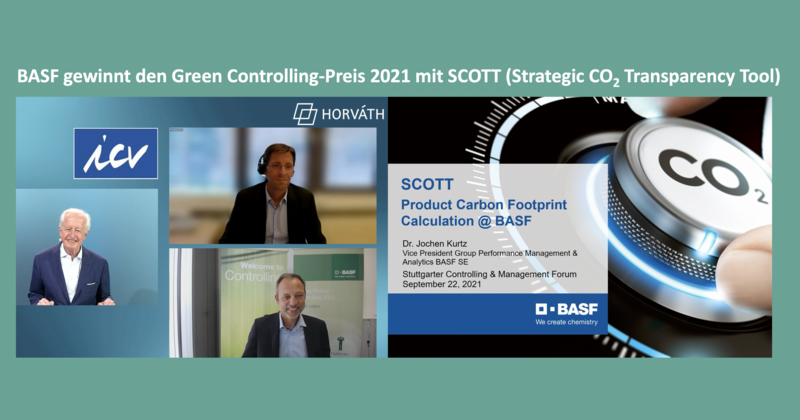
BASF receives Green Controlling Award for innovative practical solution
The Péter Horváth Foundation and the International Association of Controllers (ICV) jointly awarded the Green Controlling Award for the best practical solution on the subject of controlling and sustainability. This year, BASF received the Award. The chemical company received the Award for its method of calculating the product-related CO2 footprint. With the help of the digital “Strategic CO2 Transparency Tool” (SCOTT), BASF can now calculate the CO2 footprint for all around 45,000 products in its own portfolio. In this way, the Ludwigshafen-based company creates transparency and enables finely tuned management options in order to avoid even more emissions in the future.
“We are proud of the Green Controlling Award - a great award for the entire project team. It encourages us to continue on our path to make our know-how and the digital solution available to other market participants via an ecosystem of partnerships,” said Jochen Kurtz, Vice President Group Performance Management & Analytics.
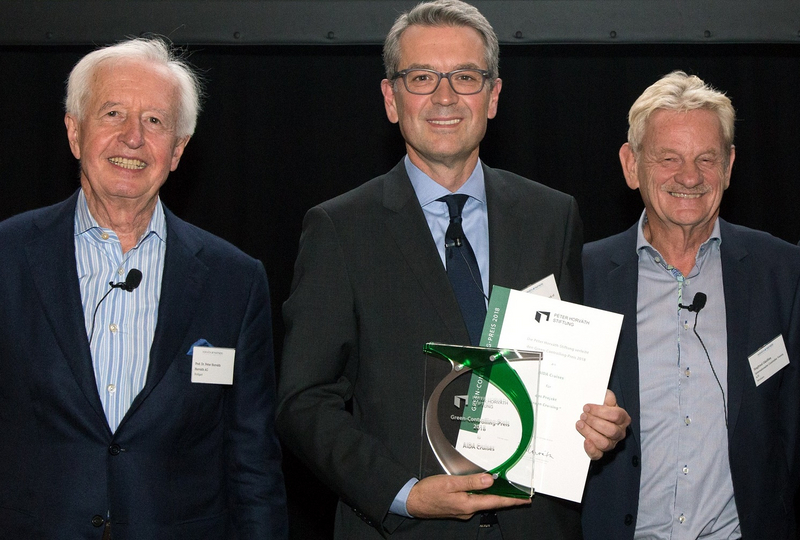
On September 19, the Green Controlling Award 2018 of the Péter Horváth Foundation was awarded in cooperation with the International Association of Controllers (ICV) at the 32nd Stuttgart Controlling and Management Forum. The winner is AIDA Cruises with the project "Green Cruising". Dr. Ali Arnaout, Senior Vice President & CFO AIDA Cruises and CIO Costa Group, accepted the award from Prof. Dr. Dr. h.c. mult. Péter Horváth, Deputy Chairman of the Supervisory Board Horváth AG, and Siegfried Gänßlen, member of the ICV Board.
In his presentation, Dr. Arnaout presented the innovative approaches followed by AIDA Cruises in order to map the "Green Cruising" strategy as an elementary component of corporate planning and management. "For AIDA Cruises, ecology and economy are not contradictory," Dr. Arnaout says. "Due to the long-standing strategic importance of sustainability for AIDA Cruises, 'Green Controlling' is an integral part of corporate planning and management. The innovative part is that we anchor the goals of „Green Cruising” at all planning stages in the context of strategic and operational corporate planning and consistently map ecological and economic target relationships in the business management."
He continues: "We need to assess the contribution of our sustainability goals, assess the risks, and answer the question of what budget should be adequately and appropriately provided for sustainability. This is about managing the portfolio - and that, in light of the ever-changing conditions and regulations", says Dr. Arnaout.
"Profitability of the future technology"
Jury Chairman Prof. Dr. Dr. h.c. mult. Péter Horváth pointed out in his laudatio that "shipping has been the focus of criticism for years". In the environmental technology, a major change is taking place: for example from 2020 onwards, marine diesel should replace the polluting heavy oil, exhaust gas cleaning is on the agenda as a current topic and "some cruise companies think about liquefied natural gas as alternative fuel". AIDA Cruises is one of those companies that "dealt with the use of liquefied natural gas (LNG) years ago and has now launched the first cruise ship fueled by liquefied natural gas, the 'AIDAnova', two months ago."
"If you think about that such an innovative ship was commissioned more than ten years ago, that also has a lot to do with controlling," says Prof. Horváth. "The planning of such a ship is an evidence of a corporate strategy that integrates economic, environmental and social objectives in an exemplary manner. The basis for this is a controlling system that coordinates, measures, manages and monitors all activities of the company, including the sustainability program. That's why this year's Green Controlling Award goes to AIDA Cruises for the commercial implementation of the 'Green Cruising' strategy."
He described the AIDA Cruises controlling system as a holistic approach that integrates the three target dimensions on all planning and management levels in an exemplary manner, with the active participation of the controller. The interaction between the business areas such as administration and the naval operations units will be realized across all planning levels, "supported by a set of new, innovatively designed key figures". "The sustainability program with a large number of individual projects of a very long-term nature is coordinated company-wide and approved by controlling department. The controlling has designed and implemented the commercial planning and management of the 'new technical LNG operation' and pursues the profitability of the future technology."
Decision bases for green projects
The ICV Board Member Siegfried Gänßlen said: "Controllers have the often difficult task of freeing up money for green controlling in their companies. Because as everywhere, also here ‘No ticky, no washy’ is true. For the controlling, this means ensuring a balance in which the profit is not lost sight of and money always remains in the cash register - and all this in the often extremely long lead times of the sustainability projects. The controllers thus make a very important contribution in this area, provide the necessary balance, enable the right prioritization and, as a business partner, create the basis for decision-making so that the management ultimately stands behind the green projects."
The 2017 Green Controlling Award of the Péter-Horváth-Foundation together with the International Association of Controllers (ICV) was given on September 20 in Stuttgart for the solution "Business management of CO2 target achievement at Porsche".
Richard Mager, Head of Product Controlling at Dr. Ing. h. c. F. Porsche AG, received the Award, endowed with EUR 10.000, from the hands of Prof. Dr. Dr. Dr. h. c. mult. Péter Horváth and Siegfried Gänßlen, Chairman of the ICV Board of Directors. He then presented the award-winning solution at the plenary session of the 31st Stuttgart Controlling & Management Forum.
In his laudatory speech, Prof. Horváth explained that the Green Controlling Award has been awarded annually since 2011 for solutions in which controller teams have made a verifiable and exemplary contribution to "writing black numbers with green topics". The award winning solution 2017 is the core of a strategy-oriented overall system for supporting management on its way to becoming the 'Green Company', says Professor Horváth. “There is a comprehensive set of tools and KPIs for managing: planning considering ecology, reporting and control are effective at all company levels.” At Porsche, there would be clear controller tasks for the implementation, maintenance and further development of the system: this would be rolled out company-wide, with a roadmap clearly defining the further development.
Porsche's Head of Product Controlling Richard Mager introduced the award-winning green controlling solution. He derived the controller's commitment to this topic from the Porsche Strategy 2025, in which sustainability is firmly anchored in the main goals. He also referred to the increasing number of markets worldwide with regulations for fleet emissions. According to Mager, in addition to the implemented and planned consumption optimizations, further measures will be necessary in order to achieve future CO2 targets.
Mager provided an insight into how Porsche manages the CO2 target achievement in corporate planning on the one hand and the vehicle project on the other hand. Corporate planning is primarily concerned with taking into account CO2 effects and measures at an early stage and assessing identified gaps in the target for achieving CO2 targets. Financial caution must be established in corporate planning - even for measures that are not yet known. This CO2 reserve is assessed on the basis of value approach and taken into account in cash terms as well as profit planning with typical annual distributions.
Vehicle project management takes into account the costs necessary to achieve project-specific CO2 targets - among other objectives ("integrated target system") - in the target catalogue of the vehicle project. In the project status, the impact on earnings due to CO2 target over/undershooting is assessed. A standardized CO2 ratio supports the management prioritization of possible CO2 measures.
"Green controlling didn't stop at green"
The International Association of Controllers (ICV) and Horváth & Partners work together in the ICV Think Tank. The first topic of this cooperation in 2010 was "Green Controlling", which is continuously being further developed in the ICV. “Green controlling has not stopped at “green”, but has developed further through sustainability controlling, sustainable corporate management and corporate social responsibility (CSR)," says ICV Chairman Siegfried Gänßlen. “The starting point for the success of sustainability is the anchoring in the corporate strategy and its implementation in day-to-day business. This is a multi-stage process that requires clear direction, patience and commitment."
As business partners of management controllers are required to actively support their companies in the development and implementation of sustainability goals. Sustainability has matured in corporate management in recent years. Today, economic advantages are at the forefront of this topic, combined with social responsibility and the fulfilment of legal obligations. However, since controlling is often not yet integrated into the implementation of social and ecological corporate goals, green controlling solutions based on practical experience are important, which provide orientation for the controller community. Since 2011, the Péter-Horváth-Foundation and the ICV has given the Green Controlling Award.
On behalf of Porsche 2017 winning Green Controlling Team, Richard Mager announced that they would donate the award money of EUR 10.000 to the Helmholtz Centre for Environmental Research in Leipzig.
On Wednesday (21.09.2016) the founder Prof. Dr. Dr. H. C. mult. Péter Horváth and ICV CEO Siegfried Gänßlen presented in Stuttgart the Green Controlling Award for "development of a system for strategic and operational environmental controlling" at Robert Bosch GmbH and the "sustainability check - management tool for embedding sustainability in corporate management" at DATEV eG.
Since 2011 the Award has been given every year for solutions that systematically and comprehensively integrate sustainability into the overall system of corporate management. As Péter Horváth explained, the applications for the Award 2016 were outstanding because of their comprehensive view of sustainability, the active strategic and operational role of controlling as well as including the upstream and downstream value chain.
Controller as a “green” business partner of the management
The Green Controlling Award was given in 2016 to a large as well as a medium-sized company. Under the title "Development of a system for strategic and operational environmental controlling" the Robert Bosch GmbH had developed and implemented an integrated management system, which was anchored in all business processes (from the company's development through management and support up to the value creation). This way controlling strategically and operationally cares for providing the balance between economy and ecology. "The BOSCH solution shows, how the theme of ecology clasps all functions and all levels of the hierarchy of the enterprise and how it’s practiced by all employees. the active role of the controller as a ‘green' business partner is significantly", says Péter Horváth.
Green Controlling Award winner in 2016 is also the DATEV eG from Nürnberg. As a big medium-sized cooperative enterprise DATEV has firmly anchored sustainable business in the company's objectives. Praised was Sustainability Check - the management tool for embedding sustainability in the corporate management". "Also at DATEV the integrative approach is exemplary and best practice," says Horvath. "The issue of sustainability is fully involved both in the organizational structure, as well as in the business processes. Controlling portrays the sustainability in the numbers. The operational implementation and management processes via a firmly defined set of metrics. All decisions of the board are to be evaluated also in terms of sustainability."
„Vorbildliche Lösungen geben Controller-Community Orientierung“
“As business partners of the management controllers are stimulated to actively support their companies in both, the developing and implementing sustainability goals," explains ICV Chairman Siegfried Gänßlen. "The topic of sustainability has matured in the corporate management in the recent years. The Green Controlling Study 2016 of the International Association of Controllers proved it. Compared with the 2010 results in the foreground stand now the economic advantages, with the social responsibility and the fulfillment of legal obligations. "
But controlling is still not at all or very little involved in the implementation of social and environmental corporate goals. "It makes even more important the green controlling solutions from practice that provide the controller community orientation", says Gänßlen. "The winners in 2016 manages it perfectly."
For the first time three companies are awarded with the Green Controlling Award in 2015: the Deutsche Telekom AG, VAUDE Sport GmbH & Co. KG as well as the Voith GmbH. The annually award donated by Péter Horváth Foundation and endowed with 10.000 EUR has been increased this year to 15.000 EUR so that each award winner could take 5.000 EUR on September 23, at the Stuttgart Controlling Forum. The award was presented by Péter Horváth, Chairman of the Jury, and Siegfried Gänßlen, Chairman of the Board of the International Controller Association (ICV).
Under the motto "With green topics to black numbers!" the Péter Horváth Foundation in cooperation with the International Controller Association (ICV) annually gives the Green Controlling Award. For promoting controlling’s debate of the "green challenge", controllers’ teams are awarded for the most innovative and effective "green" controlling solutions to design and manage environmental strategies, programs, projects and activities in companies and public institutions.
Deutsche Telekom AG: Green controlling for group-wide transparence
Deutsche Telekom AG has a group-wide environmental target to reduce by 2020 CO2 emissions by 20% compared to 2008 (Deutsche Telekom Group without T-Mobile US). So called "energy cluster" describes the main drivers: efficiency levels for network infrastructure and data centers; energy management of the buildings and IT; climate friendly alignment of the vehicle fleet and travel activities.
The green controlling was set up in a management loop system where measures were sharpened and reprioritized or redefined. The SAP system was extended already in 2011 for acquisition of ESG data ("environment, social, governance"). The ESG data process was procedurally docked to the financial information process. This was - over the monitoring of the climate protection target - a prerequisite for the integration of ESG KPIs (Key Performance Indicator) provided in the Annual Report. The SAP system also has a variance analysis against annual target values.
The green controlling solution enables transparent and timely information for management board and top management about development and required measures regarding climate protection targets. Thanks to the climate protection monitoring the need for compensatory measures to achieve climate protection target is easy to see. Overall, the green controlling solution makes a significant contribution to the sustainable reduction of energy costs in the group and to reduce CO2 emissions.
VAUDE: Green controlling integrated in the corporate management process
The sustainable innovative outdoor outfitter VAUDE pursues an integrated sustainability strategy that is implemented in all business sectors, in the whole product life cycle as well as on climate neutral company headquarters in Tettnang.
At VAUDE green controlling is completely integrated in the corporate management process: at all levels and not as a separate system. Operated by an interdisciplinary CSR team and departmental controllers it supports the triad of economy, ecology and social responsibility. The green controlling is used as continuous improvement process and a driver of innovation.
In designing, implementing and applying the classic controlling plays a key role. So the department controlling has designed and implemented the goals’ system - including the sustainability indicators - together with the department corporate development and company management. A close cooperation of controlling, corporate development, environmental officers and the CSR responsible developed the key figures for "green goals". Measurement, tracking, analysis of the green KPIs coordinate the departments controlling and corporate development. They are also involved in the development of investment requests - taking green aspects into consideration at profitability calculations.
Voith GmbH: Transparency takes care of „Competitive Spirit“
The green controlling established in the Voith Group has brought significant economic and environmental benefits and strengthened the company's competitiveness. Measures for energy, water and material efficiency generate annual savings of EUR 6.5 million.
The green controlling solution at Voith stands for a continuous connection of the top-down and a bottom-up approach: In the top-down, through group-wide analysis, comparisons with other companies and best practices the concern goals are defined. The bottom-up means single location analysis and potential equitable measures to achieve the green group wide targets.
The established controlling cycle has been transferred from the classical financial controlling into green controlling. The basis for success is the group wide IT-sided implementation of the green controlling process. Extreme transparency is evidence of best practices and creates a "competitive spirit" between locations.
Stimulating debate of controlling and sustainability
Environmental protection is today not only a cost factor, but also a world wide company’s long-term success factor, which opens up new opportunities also in the sales market. The green orientation of company’s activities places controlling in front of the challenge of green planning, management and control. It requires innovative approaches, methods and ideas in the sense of a "green controlling". Controllers should methodically and instrumentally support with advise the transfer of the green goals. The generation of transparency using the right metrics that demonstrate economic viability and the assessment of ecological success as well as the integration of the green content in all decision-making processes are considered as their essential tasks.
Der Green Controlling Award has beeen given sinde 2011. The Jury leads Prof. Dr. Dr. h.c. mult. Péter Horváth (Horváth AG, IPRI gGmbH), Head of the ICV expert work group Ideenwerkstatt. The winners are: Deutsche Post DHL (2011), Hansgrohe SE (2012), Volkswagen AG (2013), Flughafen Stuttgart GmbH (2013), Takata AG (2014), STABILO International GmbH (2014), Deutsche Telekom AG, VAUDE Sport GmbH & Co. KG as well as Voith GmbH (all 2015).
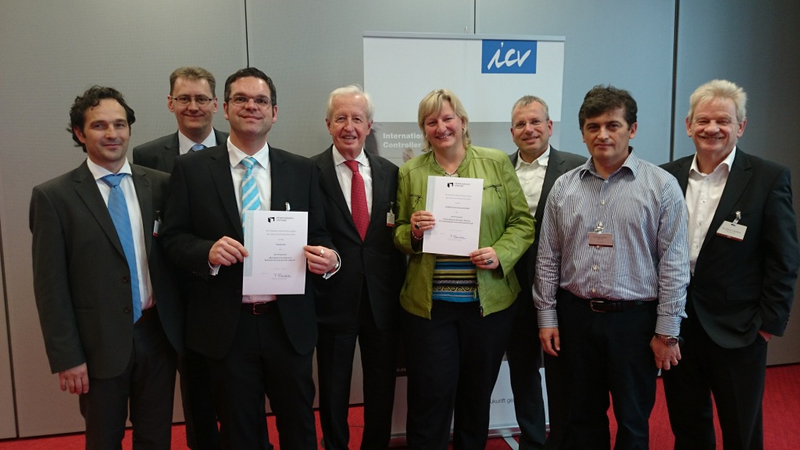
The Green Controlling Award 2014 has been awarded to STABILO International GmbH for its programme Controlling as a Business Partner for Sustainable Corporate Management and Takata AG for its programme Maximise Innovation to Minimise Environmental Impact.
On November 27, Péter Horváth, the chairman of the jury, presented the EUR 10,000 award, which was donated by the Péter Horváth Foundation, in the presence of Siegfried Gänßlen, Chairman of the Board of Managing Directors of the International Controller Association (ICV), at the ICV's 14th Annual Controlling Competence Stuttgart - CCS 2014 conference in the IBM Forum Ehningen near Stuttgart. The winners then presented their solutions at the CCS plenary session to an audience of more than 150 controlling experts and managers.
STABILO: Controlling as a Business Partner for Sustainable Corporate Management
In order to focus the company's sustainability efforts, in 2009 the company's executive management defined specific sustainability goals as part of its Strategy 2014 initiative. As a business partner of both management and the operating units, the Controlling department was called upon to integrate into the company's daily processes the requirements derived from the sustainability goals. The green controlling solution that resulted had three components:
1. Support the (further)development of the STABILO sustainability programme;
2. Create transparency about programme results and report on them;
3. Support the sustainability programme from a process-integration perspective.
The jury recognised several innovative aspects in the solution. Among others, they included the fact that Controlling was integrated as an internal advisor for all processes, while the specialist departments worked autonomously to implement their projects. All three dimensions of sustainability – economic, environmental, social – are viewed holistically, which creates transparency about their interactions. The green controlling solution has been integrated into the existing controlling processes as an essential foundation of STABILO's sustainability programme. An important premise in the overall initiative was that the controlling of the sustainability programme must not lead to any additional or parallel controlling processes. Instead, existing budgeting and reporting processes were expanded to include sustainability goals. Only the controlling measures used for the ongoing monitoring of the sustainability initiatives were rebuilt.
In addition, the green controlling solution has helped to boost employees' identification
with the issue of sustainability. Through the sustainability strategy, the publication of goals and measures as well as continuous reporting, the employees of all STABILO units feel that they are involved in the process. In fact, there have been many good examples in budget discussions as well as sales and marketing meetings that have been copied from other departments, or taken and then adapted for a new department. This created a momentum of its own across all of the company's units.
Several key successes have been achieved since the beginning of the sustainability programme in 2009. The green controlling solution also made these successes visible, which is a major reason why sustainability remains an integral part of STABILO's corporate philosophy.
Takata AG: Maximise Innovation to Minimise Environmental Impact
Takata Corp., a Japanese company with its headquarters in Tokyo, is a global manufacturer of automotive passenger protection systems (annual sales: EUR 4.1 billion, about 45,000 employees worldwide). Takata AG has consolidated its European activities at its headquarters in Aschaffenburg.
Takata's award-winning green controlling solution involved taking the company's traditional key performance indicator (KPI) system and expanding it to include newly developed metrics and a higher level of detail. “Green MBOs” (management by objective is the company's global variable remuneration system for managers) were implemented into the target-setting system, namely: minimize impact on environment, limit potential of ecological hazards and risks, and rational materials consumption. The target-setting system was then connected with the KPI reporting.
Takata considers “green projects” to be any projects which protect the environment, conserve energy or avoid environmental risks. Controlling supports and prioritises these “green projects” by providing cost-benefit analyses, researching data and tracking results.
The green controlling solution, which enables Takata's Controlling department to act as an innovator and driver as well as a “networker” between organisational units, uses existing resources and infrastructure in the company. Takata deliberately decided against establishing an additional green controlling department, and instead took the approach of integrating the issue into the daily responsibilities of the Controlling department. This also involves using the existing reporting structure in SAP. Takata's Controlling team acts as a moderator and sparring partner, for example, in discussions with the manufacturing divisions.
Takata refers to a series of positive economic and environmental outcomes that have resulted from the solution, including significant cost savings, especially with regard to expenditures on energy: 19% lower costs despite a 10% increase in production volumes. Increased awareness and clearly defined responsibilities among the stakeholders in the various divisions are also counted as successes. In addition, Controlling now enjoys a higher level of process strength in both the daily and the project business. The company has even experienced a wave of innovation through the prioritised support of its “green projects”.

The Green Controlling Award 2013 was given to Flughafen Stuttgart GmbH and Volkswagen AG. The International Controller Association (ICV) awarded the prize, which is sponsored by the Péter Horváth Foundation and carries an award of 10,000 EUR, for the 3rd time during the specialist conference “Controlling Competence Stuttgart - CCS 2013” at the IBM forum Ehningen near Stuttgart. It honoured the solutions “Fairport Controlling” (Flughafen Stuttgart GmbH) and the Environmental Controlling within the framework of “Think Blue. Factory.” (Volkswagen AG).
Controllers as “business partners of management” have to ensure that “black figures are produced with green issues” and that the three pillars of sustainability - economy, ecology and social issues - are in balance. The Controlling community has recognised the importance of the ecological dimension of sustainability for its own work and exemplary approaches for the development and implementation of environmental management exist in the corporate world.
Since 2011, the most innovative and effective Controlling solutions for the design and implementation of ecology-oriented strategies, programmes and projects are recognised every year. A jury of ICV experts, which is led by Prof. Dr. Dr. h.c. mult. Péter Horváth (Horváth AG, IPRI gGmbH, Head of the ICV idea workshop), selects the best integrated solutions initiated or designed with significant input from Controllers in corporate or public institutions. Prof. Horváth and the ICV Chairman Siegfried Gänßlen, CEO of Hansgrohe SE, gave out the Green Controlling Award 2013.
“Fairport Controlling” for the steering of sustainability performance
The winning strategy “Fairport Controlling” is Flughafen Stuttgart GmbH’s (FSG) approach to steering its operational sustainability performance. The airport company has developed a fairport codex in which it formulates its sustainability objectives. This is integrated into FSG’s strategic and operative planning, steering and control, its capital budgeting, as well as internal and external reporting. Thus, the ecological characteristics complete the organisational steering of FSG. Green Controlling is the central instance for the reporting of ecological aspects in the company and at the same time it acts as a coordinator and a “guarantor for rationality”.
The Controlling of FSG has extended the horizon of its own area of responsibility to include ecological information through the development of Green Controlling. IT provides highly integrative and consistent data management and use. The integrative division of labour between Controlling and environmental management ensures compliance with Controlling standards and facilitates the data supply to management from a single source: parallel systems are avoided.
Prof. Georg Fundel, managing director of Flughafen Stuttgart GmbH, said, “This recognition of our sustainable organisational development by the Péter Horváth Foundation and the International Controllers’ Association shows that we are on the right track. The development of our Controlling entails an even stronger awareness of ecological and social issues in all areas of the organisation. “Fairport Controlling” plays a major role in the achievement of our objective to become one of the most high-performing and most sustainable airports in Europe.”
Stuttgart Airport continuously optimises its sustainability Controlling. In order to continue its project, FSG currently also integrates social aspects into organisational steering.
Environmental Controlling of “Think Blue. Factory.” at Volkswagen
Volkswagen’s objective is to reduce the environmental impact of the production process by 25% per vehicle by 2018. “Think Blue. Factory.” is a strategy for its implementation and it follows a holistic, entrepreneurial approach that unites ecology and economy. The challenge of Environmental Controlling is the mapping of the distinct real net output ratio of the 27 global locations, while accurately and consistently recording highly complex data and measurands over the project lifetime of eight years.
All integral parts of the Green Controlling approach were developed and validated for the Volkswagen brand. Environmental Controlling through “Think Blue. Factory.” not only comprises the mere monitoring and reporting of environmental indicators, but also numerous steering instruments of Change Management.
A 25% reduction of the key environmental indicators in the production process means that the key environmental indicators (KPIs) of production - energy, carbon dioxide, water consumption, waste and solvent emissions - need to be reduced for each vehicle and each component compared to 2010. In order to measure and steer “25% less”, an appropriate 2010 baseline had to be defined for each location - a complex challenge.
The outstanding innovation of the Environmental Controlling solution of Volkswagen is the KPI reporting with its innovative evaluations and forecasts. This type of support for organisational steering that goes beyond the mere monitoring of indicators is new in the automobile industry. The Controlling solution implemented is part of the brand and group environmental strategy and is integrated directly into organisational processes.
In the first two years, the Volkswagen brand has already achieved a 10% reduction in environmental impact in the production of each car. This goes hand in hand with associated cost savings for each car through reduced overheads for energy, waste and water.
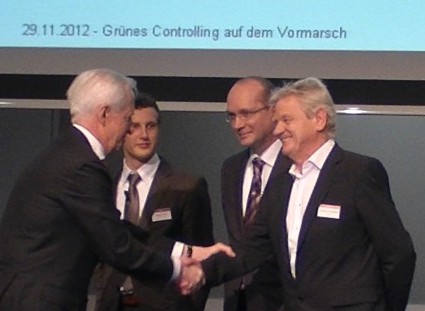
On Thursday (29th November) Hansgrohe SE from Schiltach in Black Forest has been awarded with the Green-Controlling Award of Péter Horváth's Foundation in collaboration with International Controller Association (ICV) for Controlling Solutions "Green Controlling - Green Profit - Green Future".
The 10,000 EUR award was given for the second time during the conference "10th Controlling Competence Stuttgart - CCS 2012". Jury chairman Prof. Dr. Dr. h.c. mult. Péter Horváth (Horváth AG, IPRI gGmbH, director of ICV Ideenwerkstatt) handed the prize to Hansgrohe controller team in IBM forum Ehningen during the conference "Controlling Competence Stuttgart – CCS 2012"
Péter Horváth explained in a laudation the jury's decision. He found that the controlling community has "recognized the importance of the environmental sustainable development for their work." "In business practice, there are now encouraging approaches to implement and develop in environmental management". This is done, but it is still too narrowly without involving controlling within the meaning of more technically-oriented "island solutions". Here controllers are required.
With the Green Controlling Award Péter Horváth Foundation's distinguishes the most innovative and effective solution for controlling development and implementation in ecologically oriented strategies, programs and projects. Any integrative solutions will be awarded to controllers in companies and public institutions for initiating shaping that issue.
Controlles as a "Business partner of management" were given a task to prove that "numbers are written by green issues", said jury chairman. "We have to ensure the balance between three pillars of sustainable development - economic, environmental and social". Péter Horváth outlined in his speech a triple challenge for controllers": It will be required "with the company's strategy a coordinated integrated system of management of all environmental activities";also clear Key Performance Indicators (KPIs); a goal-oriented economic management; lastly that this system will be implemented, maintained and developed. "This year's winners have in an ideal way developed a master plan and implemented it. The plan is integrated consistently and systematic at all levels of strategy in the planning and management in the environmental orientation. Controlling as "Business Partners" is on the way to "Green Company".
The Green-Controlling Award of Péter Horváth Foundation was given for the second time in the southern German ICV conference "Controlling Competence Stuttgart" The ICV had already taken up the theme of "Green Cost" in 2009 in his Innovators Panel, the "Idea Factory". White Paper was published in end of 2010. In the meantime ICV work group works go on. , Péter Horváth's Foundation in collaboration with International Controller Association (ICV) will promote the most innovative and most effective "green" controlling solution.
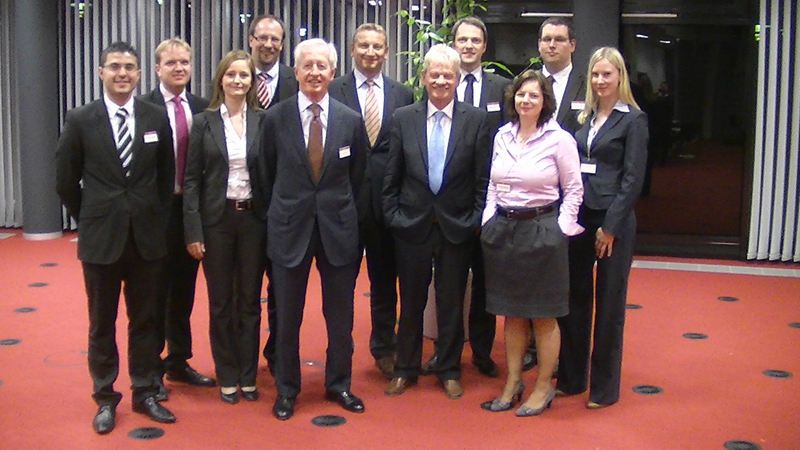
The Carbon Accounting & Controlling Team of Deutsche Post DHL (DPDHL) was rewarded on Thursday (November 24) for its controlling solution as part of the environmental program "GoGreen" with the Green Controlling Award. The prize was awarded by Péter Horváth Foundation in association with the International Controller Association (ICV) for the first time. The transparency created by the Controlling Team makes possible, above all, identification of financial risks and effective controlling of ecological measures.
The DPDHL Team Carbon Accounting&Controlling received the award on the specialist conference "Controlling Competence Stuttgart - CCS 2011" on an IBM forum Ehningen from the hands of the presiding judge Prof. Dr. Dr. h.c. mult. Péter Horváth (Horváth AG, IPRI gGmbH, Leader of the ICV-workshop) and the ICV Board Chairman Siegfried Gänßlen (CEO Hansgrohe AG) "Carbon Management is a social task which we face at Deutsche Post DHL constantly and on a cross-sector level", said Melanie Kreis, Executive Vice President of Corporate Controlling at Deutsche Post DHL. "Our today's distinction means that the whole approach has been acknowledged and at the same time it reflects engagement of numerous colleagues taking part in the project."
The criteria "fulfilled outstandingly well"
In order to develop and implement environmental management in the company practice, which goes beyond technically-oriented "island solution", you need to integrate into the process controlling. As the presiding judge Prof. Dr. Dr. h.c. mult. Péter Horváth explained in his congratulatory speech that from that resulted a threefold requirement for controllers: "Necessary is, first of all, an integrated general system of controlling all environmental processes which synchronized with the company’s strategy. And secondly precise KPIs (Key Performance Indicators - performance ratios) are needed, which make possible target-oriented economic controlling. Thirdly, this system has to be implemented, cared for and further developed", clarified Horváth.
The Green-Controlling-Award winners from Deutsche Post DHL developed an environment controlling system which fulfilled all these criteria outstandingly, added Péter Horváth. It was suppose to be the key to a strategic-oriented general program for supporting the management. He said that an extensive set of KPIs for controlling made sure that planning, reporting and control could be translated into practice on all company levels. In addition, there were precise controller task appointments for implementation, maintenance and further development of the system which were introduced enterprise-wide.
Controller as a partner of the CO2-management
Deutsche Post DHL transports goods and information worldwide as a globally acting logistics service provider with about 470,000 employees. As a part of its role as an engine of world trade the company causes CO2 emissions on not a limited scale. "In order to make justice to the responsibility for our climate that falls to us because of that, we have initiated the environmental program GoGreen", explained Stefan Freigang, responsible for Carbon Accounting & Controlling at DPDHL concern controlling, who presented the solution in the plenary meeting CCS 2011. Carbon Accounting & Controlling supported the concern's GoGreen program which the company had set as its aim. The aim was to enhance its own CO2 efficiency - including activities of its subcontractors - till 2020 by 30% in relation to the basis year 2007. According to Stefan Freigang this enhancement would be facilitated by numerous measures, both centralized and decentralized.
The concern-wide Carbon Accounting & Controlling program would be pushed ahead by a newly founded in 2012 department in concern controlling. The innovative element of the awarded solution is to consequently integrate into an organization a system of controlling CO2 efficiency aims, processes and systems of financial management. A management reporting, running through the whole year, it to be created for an effective management - additionally to the annual disclosure -. The developed tools also enabled the company to forecast, set aims and calculate measures for increasing efficiency.
"Controllers play in the conception, implementation and application a fundamental role. They also become now more and more as part of carbon controlling partners of management, in addition to classical financial themes.", added Stefen Freigang "Carbon Controlling" took place in synergy between controllers and managers. The created transparency in actual emissions made it possible to identify financial risks and an effective management of ecological measures. In that way carbon controlling supported the management in making decisions and managing the company. It prepared and reported facts as well as model evaluations about possible economic and ecologial effects.
The International Controller Association (ICV) with its Idea Workshop and a team of scientists and controlling experts headed by Prof. Dr. Dr. h.c. mult. Péter Horváth dealt in 2010, in accordance with its focus point, with "Green Controlling". This work has been continued since the autumn 2011 by a new work group "Green Controlling". To facilitate this theme Péter Horváth Foundation in association with the ICV award annually the most innovative and effective "green" controlling solutions with the Green-Controlling Award.
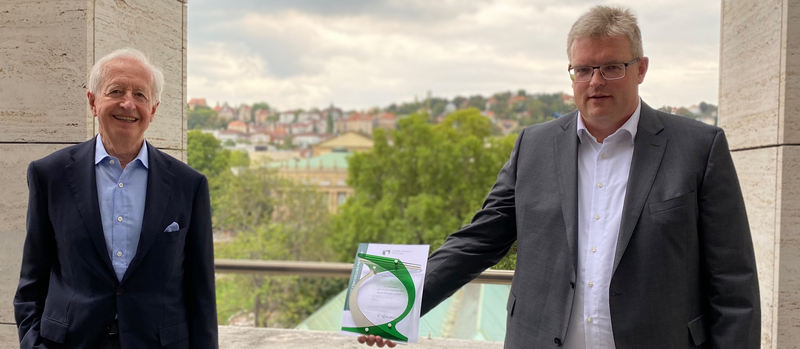
Der Green-Controlling-Preis 2020 der Péter-Horváth-Stiftung in Zusammenarbeit mit dem ICV Internationaler Controller Verein geht an die Robert Bosch GmbH für das Projekt „CO2-Neutralstellung der Bosch-Gruppe in 2020“.
Bis Ende 2020 wird Bosch als erstes globales Industrieunternehmen mit seinen mehr als 400 Standorten CO2-neutral sein. Ein interdisziplinäres Team aus Controllern, Ingenieuren, Energie- und Klimaexperten hat dafür ein ambitioniertes Programm mit verschiedenen Hebeln entwickelt und gestartet. Um die CO2-Neutralität zu ermöglichen, investiert Bosch neben der regenerativen Energieversorgung vor allem in die Energieeffizienz der eigenen Standorte. Bis 2030 will das Unternehmen die ökologische Qualität der CO2-Neutralstellung durch die Steigerung dieser beiden Maßnahmen weiter sukzessive verbessern. Als kurzfristige wirksame Hebel kauft Bosch zudem Ökostrom zu und kompensiert unvermeidbaren CO2-Ausstoß durch ausgewählte Klimaschutzmaßnahmen in vollem Umfang.
Torsten Kallweit, Leiter Umwelt und Nachhaltigkeit der Robert Bosch GmbH, hat für das Projekt „CO2-Neutralstellung der Bosch-Gruppe in 2020“ den mit 10.000 EUR dotierten Green-Controlling-Preis 2020 am 23. September anlässlich des „Stuttgarter Controlling & Management Forums“ von Péter Horváth und dem ICV-Vorstandsvorsitzenden Heimo Losbichler empfangen. Auf dem Online-Forum präsentierte Kallweit die Lösung den 500 Teilnehmenden.
„Leuchtturm-Projekt“ und „Musterbeispiel“
Der renommierte Preis wird seit 2011 alljährlich für die „innovativste und effektivste grüne Controlling-Lösung“ verliehen. Controller sind als Business-Partner des Managements gefordert, die Umsetzung von Nachhaltigkeitszielen aktiv zu unterstützen. Péter Horváth bezeichnet die ausgezeichnete Lösung als „Leuchtturm-Projekt“: „Dass Bosch bis Ende 2020 mit seinen mehr als 400 Standorten klimaneutral sein will, ist keine bloße Ankündigung. Unter aktiver Mitwirkung des Controlling-Bereiches im Sinne von ‚Plan, Do, Check, Act‘ liegt ein detaillierter Implementierungsplan vor, der zielgerichtet umgesetzt wird.“
„Der Fokus von Controllern, Managern und Medien ist heute verständlicherweise auf die Bewältigung der Corona-Krise gerichtet. Dies darf jedoch nicht darüber hinwegtäuschen, dass die Klimakrise langfristig gesehen, die größere Bedrohung ist“, erklärt Heimo Losbichler. „Controllern kommt dabei in der Zielbalance zwischen Ökonomie und Ökologie eine große Bedeutung zu. Das Projekt der Bosch-Gruppe, CO2-neutral zu werden, ist ein Musterbeispiel, wie beide Zielgrößen verfolgt und gesteuert werden können.“
Damit ist die Robert Bosch GmbH nach 2016 zum zweiten Mal mit dem renommierten Green-Controlling-Preis ausgezeichnet worden. 2007 bis 2018 hat sich die Bosch- Gruppe, bezogen auf Umsatz und Mitarbeiter fast verdoppelt – wobei die absoluten CO2-Emissionen des Unternehmens nahezu konstant blieben. Der mit dem Wachstum einhergehende Anstieg der CO2-Emissionen konnte durch die Steigerung der Energieeffizienz ausgeglichen werden. Dazu beigetragen hatte die 2016 ausgezeichnete Green-Controlling-Lösung, „Entwicklung eines Systems für strategisches und operatives Umweltcontrolling“. Damals wurden Energieeinsparmaßnahmen mit Hilfe entsprechender relativer Kennzahlen gesteuert. Von 2007 bis 2018 wurden schon mehr als 30% CO2 pro Mio. EUR Wertschöpfung eingespart. „Das war ein enormer Schritt. Aber die Absolut-Emissionen zu reduzieren, konnten wir so noch nicht erreichen“, erklärt Torsten Kallweit.
Energieeffizienz und Wirtschaftlichkeit
Bei der Entwicklung des nun ausgezeichneten Projekts „CO2-Neutralstellung der Bosch- Gruppe in 2020“ hatte das interdisziplinäre Team Schlüsselfragen zu beantworten: „Wieviel Energie können wir unter wirtschaftlichen Rahmenbedingungen maximal einsparen?“, „Wieviel regenerative Energie können wir selbst erzeugen?“, „Wo und zu welchem Preis ist Grünstrom weltweit verfügbar?“ und „Gibt es einen Business Case für Klimaneutralität?“. Dabei zeigte sich, dass Bosch seine Energieeffizienz um rund 20% steigern kann – und dabei die Wirtschaftlichkeitskriterien des Unternehmens erfüllt. Um diese Effizienzpotenziale zu heben, sind Investitionen von 1 Mrd. EUR bis zum Jahr 2030 notwendig. Hierdurch können im selben Zeitraum rund 1 Mrd. EUR an Energiekosten gespart werden. Dieser Business Case hat die Geschäftsführung überzeugt.
Um die Effizienz und Akzeptanz zu gewährleisten, werden bestehende Prozesse und Berichtslinien für die Umsetzung der vier Hebel genutzt. Jeder Geschäftsbereich erhält ein jährliches absolutes Energieeinsparziel, dessen Erreichung regelmäßig überprüft wird. Zur Steuerung der CO2-Neutralstellung wurde ein Controlling-Zyklus gemäß „Plan, Do, Check, Act“ eingeführt.
Die Umsetzung der Maßnahmen wird durch ein Monatsreporting in einer zentralen Datenbank auf Standortebene überprüft. Jeder Standort trägt hierzu z.B. die im Monatszeitraum verbrauchten Energiemengen ein und weist durch Messwerte und Abrechnungen nach, dass diese aus regenerativer Eigenversorgung oder dem Bezug von Grünstrom bzw. -gas stammen. CO2-Emissionen aus Verbrennungsprozessen werden standardisiert berechnet und durch Abruf von Kompensationszertifikaten aus dem globalen Rahmenvertrag ausgeglichen. Die Monatsreports der Standorte werden in einem zweistufigen Validierungsverfahren durch Geschäftsbereichs- und Regionalorganisation überprüft. Die Geschäftsführungen von der Konzern- bis zur Standortebene erhalten monatlich Informationen über den Status der Zielerreichung und leiten bei Bedarf Maßnahmen ein. Da die Ergebnisse der Prüfung ebenfalls in den Lagebericht des Konzerns einfließen, werden Prozess, Daten, Nachweise und Zielerreichung in enger Abstimmung mit den Bereichen Controlling und Finanzen durch einen Wirtschaftsprüfer geprüft.
Rolle der Controller bei Konzeption, Implementierung und Anwendung
„Ein derart ambitioniertes, komplexes Programm ist nur durch die intensive partnerschaftliche Zusammenarbeit in einem interdisziplinären Team aus Controllern, Ingenieuren, Energie- und Klimaexperten möglich gewesen“, erklärt Torsten Kallweit. „Erst das Zusammenspiel der verschiedenen Expertisen und Erfahrungen sowie die Bereitschaft, voneinander zu lernen, haben die Konzeption, Implementierung und Anwendung möglich gemacht.“ In der Konzeption brachten die Controller ihre Expertise insbesondere bei der Definition der Steuerungsgrößen und des Business Cases für die Neutralstellung ein – von der Bewertung einzelner Projekte bis hin zum Gesamtkonzept. Bei der Implementierung unterstützte das interdisziplinäre Team mit den Controllern. Die Anwendung schließlich profitiert von Controller-Erfahrungen etwa zum Controlling-Zyklus und der Abbildung des „Plan, Do, Check, Act“-Prozesses.
Bosch konnte den Ausstoß von CO2-Emissionen (Scope 1 & 2) bereits 2019 von 3,26 Mio. auf 1,94 Mio. Tonnen reduzieren. Auf der Bilanzpressekonferenz im April 2020 hatte das Unternehmen bekanntgegeben, bereits zu 70% CO2-neutral zu sein und die Erreichung der CO2-Neutralstellung bis Ende des Jahres in Aussicht gestellt.
Weitere Informationen zur CO2-Neutralstellung bei Bosch finden Sie hier
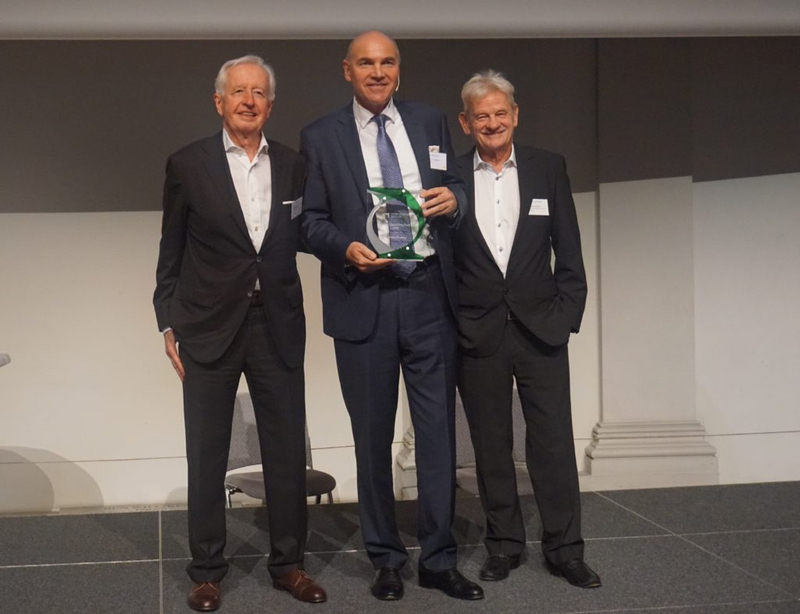
Der renommierte Green-Controlling-Preis der Péter-Horváth-Stiftung, alljährlich gemeinsam verliehen mit dem ICV (Internationaler Controller Verein), geht 2019 an die VERBUND AG in Wien für das Programm „Green Finance“.
Der Finanzbereich der VERBUND AG leistet einen wesentlichen Beitrag zum Thema Nachhaltigkeit. Der Preisträger ist Österreichs führendes Stromunternehmen und einer der größten Erzeuger von Strom aus Wasserkraft in Europa. Das Investitionsprogramm von VERBUND umfasst ausschließlich nachhaltige Projekte im Bereich Wasserkraft, Neue Erneuerbare und Hochspannungsnetz (Integration der Neuen Erneuerbaren in das europäische Stromsystem).
VERBUND hat sowohl national als auch auf einer globalen Ebene in Green Finance eine führende Rolle übernommen. Zu den zahlreichen erfolgreichen Transaktionen, die von VERBUND durchgeführt wurden, zählen insbesondere der weltweit erste ESG-linked syndizierte Kredit und der erste Digitale Grüne Schuldschein sowie Green Bonds und die nachhaltige Veranlagung der Mittel für Sozialkapital.
Prof. Dr. Dr. h. c. mult. Péter Horváth erklärt: „Unsere Jury ist zu der Überzeugung gelangt, dass die VERBUND AG ein innovativer Vorreiter bei ‚grüner‘ Finanzierung ist und in der gesamten Wirtschaft eine Benchmark-Funktion einnimmt. Damit ist sie ein würdiger Green-Controlling-Preisträger; ein Vorbild für die Gestaltung und Steuerung ökologischer Strategien, Programme, Projekte und Maßnahmen in Unternehmen und öffentlichen Einrichtungen.“
„VERBUND hat schon früh einen Focus auf Innovation und Themenführerschaft in Green Finance gelegt“, so Dr. Peter Kollmann, CFO VERBUND AG. „Es freut uns besonders, dass unsere Bemühungen und Erfolge durch diesen Preis anerkannt wurden und die Jury unsere internationale Vorbildrolle hervorgehoben hat. Dieser strategische Schwerpunkt ist ein klares Signal an den Finanzmarkt mit positiven Auswirkungen auf Investorenakzeptanz, Rating-Agencies und Finanzierungskosten.“
ICV-Vorstandsmitglied Siegfried Gänßlen dankte in seiner kurzen Ansprache zunächst allen Einreichenden; ausdrücklich auch jenen, die nicht ausgezeichnet wurden. Auch in diesem Jahr erweisen sich in dem Wettbewerb wieder Controller als innovativ und verantwortungsbewusst.
Der mit 10.000 EUR dotierte Green-Controlling-Preis 2019 der Péter-Horváth-Stiftung wurde am 10. Oktober auf dem 33. Stuttgarter Controlling- und Management Forum von Péter Horváth und Siegfried Gänßlen an Dr. Peter Kollmann, CFO der VERBUND AG, überreicht. Der Preisträger stellte in seiner packenden Präsentation nicht nur das “Green Finance” Programm der VERBUND AG vor. Eindringlich wie überzeugend wies er auf die elementare Bedeutung ökologischen Handelns hin.




